#sometimes i think people are also not drawing the same conclusions about the source material as i am and thats whatver
Text
honestly i know sometimes fics can sort of go on immersion breaking tangents in depicting enthusiastic consent so i dont fault people for wanting to just streamline the process in fiction especially if theres context we can readily agree on as readers but it does honestly alarm me a little bit when characters with ... pretty clear and recent reasons for being a little bit on edge about their health status aren't depicted as even considering wrapping it up like. that would actually draw me out of the story more. i think this comes from a place of not wanting to engage with specific implications/subject matter but theres certain stories where it feels like a disservice to gloss over these things.
#pipit txt#like i know rape and sa are not Fun topics to address in fic#but sometimes that is something those characters are actively dealing with.#and i dont expect a ted talk but. i think that person would be using a condom rn folks.#or like damn i think the KIND of sex they wanna have rn would be affected. just food for thought.#feel free to ignore i was reading a fic a few days ago and its been on my mind.#sometimes i think people are also not drawing the same conclusions about the source material as i am and thats whatver#it does make me double take though.
1 note
·
View note
Text
Fatigue
Kinda Random Thoughts a couple of days after the 'last BTS Live'
Ngl feeling a bit of mental and emotional fatigue.
I think it’s safe to say it’s going around.
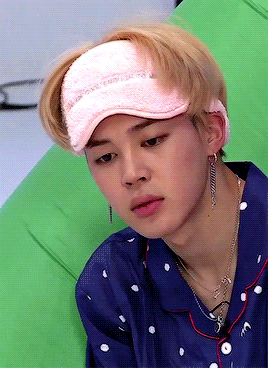
The sad thing about social media is no matter how much you try and curate your own bubble with things that make you happy and positive people, it’s hard to maintain. Social media is a representation of everyday offline people. Regular people behind the usernames with their own opinions, experiences, likes and dislikes (celebrities are regular people too, just famous for something or talented and known for it).
Though it’s good for growth and maturity to not just surround yourself with the same opinions and thoughts as yourself, it’s also tiring when you feel the need just be understood. When you can never enjoy things in peace because others need more information, more context, need to pick apart, need to make their side seen, their conclusions/interpretations the decisive one.
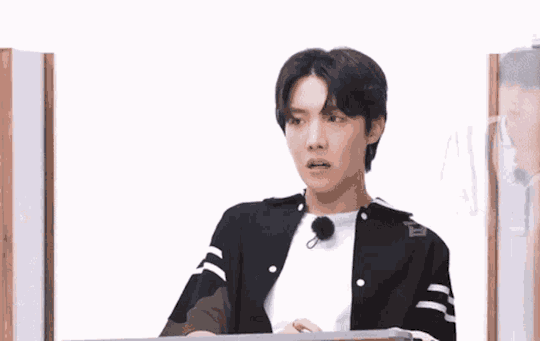
Over the years we’ve had SEVERAL Jikook lives, OT7 lives or lives with some of the members as well as Jikook. I, like most of us, LOVE Jikook lives. When watched in its entirety we not only see their ‘moments’ but we see them as regular people, we then can discern the fake from true when we see fake subs, edits etc. What makes Jikook even more interesting and captivating, to me, is when I can see the similarities as well as the exceptions in their interactions with each other and their other members. I found Jikook AFTER I found BTS…

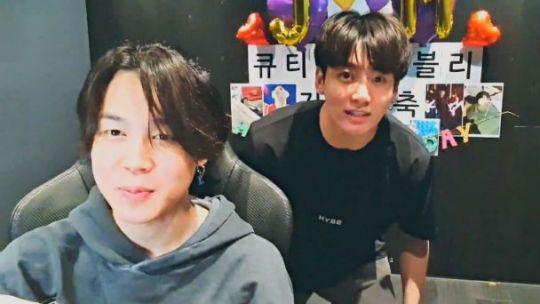
and not only do I love their lives with primarily the two of them, I also love their solo lives, their lives with other members and OT7 lives. All the members are interesting in their own ways and their lives shed light on them and the other members, Jikook included. Watching their lives (though still them putting their best face forward and always aware that they’re being watched by millions) is so much more rewarding than just watching edits, summaries etc from the likes of TikTok, YouTube and other platforms. It’s fun AFTER watching their lives to then see what army have done to have fun with them, such as funny edits, fake FUN subs etc.
**please please please, weverse is free, whenever you have the time, watch the lives there with the subtitles there, though not always the best, it’s better than those who may not translate for altruistic reasons**
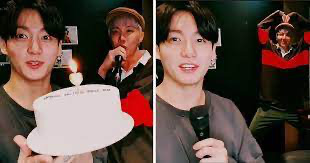
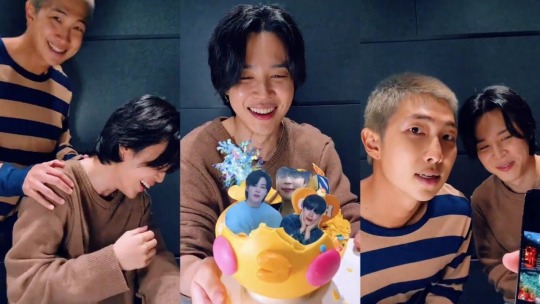

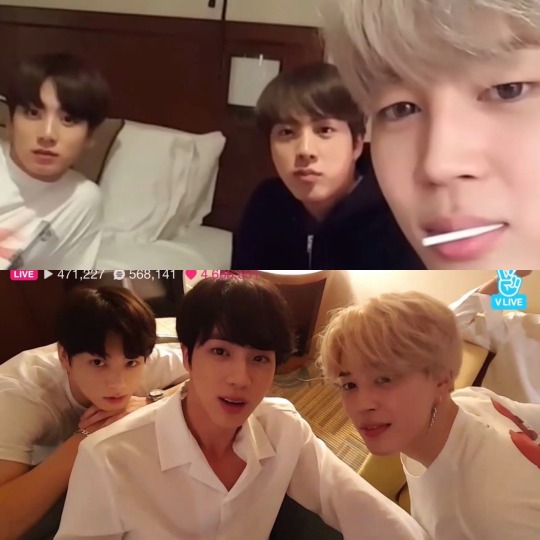

It gets me down sometimes the constant need it seems, within fandom culture, to microanalyse every piece of content we get. We have the need to seek out hidden messages, hidden looks, put context behind what is and isn’t said. Give explanation where it isn’t needed and draw conclusions from what isn’t said.
Most of the time it’s cute, fun and ‘harmless’
But sometimes 😪
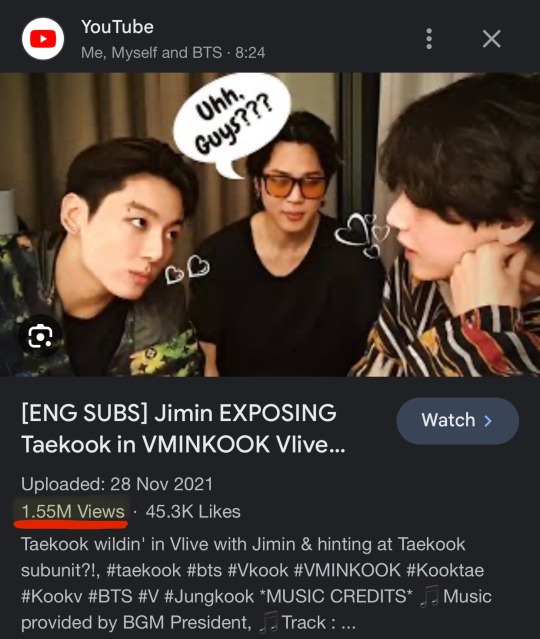
MANIPULATION, MISINFORMATION & MISTRANSLATION
Without agenda, edits, cuts, slow mo and with context & rightful subtitles - Original Weverse Source
It’s always been this way and sadly seems like it always will be. I like context, I like information, when possible I like to get it from the original source. It’s nice when busy and unable to read whole interviews or watch whole lives, to see little snippets and clips that float around online. But it’s so draining when those little clips and snippets are then used to paint different pictures and narratives depending on the sharer’s biases/intention. When it’s aimed at making members into villains, defaming their characters etc.
It’s rarely the case that the purpose for lives (when there is one) ends up being appreciated solely for that. Just the members wanting to connect with their fans.

mukbangs, karaokes, Legos, q&a’s, tmi’s, messages of thanks, birthday lives, just because lives. All the times they go on live that can be appreciated for just that end up being used as material for hate
Everytime it should be healing to interact with those we are fans of, after the initial wave of euphoria is over, undoubtedly what follows is soo much negative noise, new narratives, more hate etc.
As I said before I try to curate my timelines, who I follow, things I like & comment on etc but sometimes the need to correct misinformation, the need to defend the lies and negativity means I still end up seeing so much of the bad.
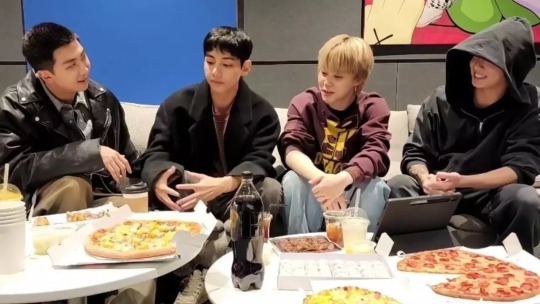
REAL (Weverse Original Source)
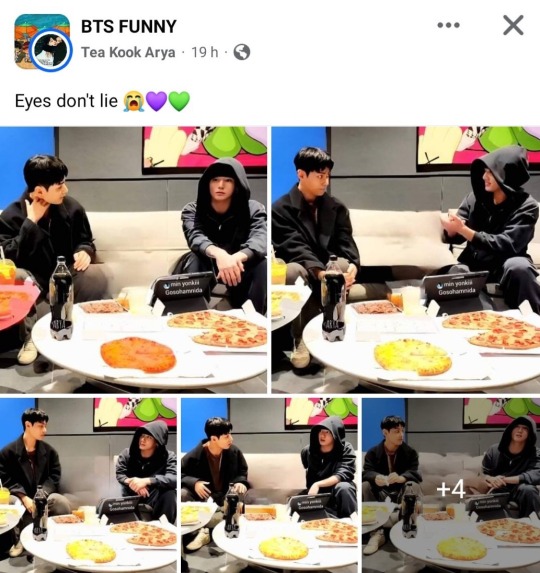
FAKE!
I know this is a cycle and I have choices and am not being forced to be anywhere.
It’s just one of those days where I want to word vomit on my blog.
I just want to enjoy BTS and Jikook peacefully and positively. Why can’t everyone want to do the same for their faves?? Why is it always so angry and combative and about winners and losers, horrible name calling and malicious lies, insults, nasty images etc. Why campaigns to cause mental anguish to members and their family? To sabotage and try to get members separated or even imprisoned. Why mass report playlists and accounts? Why when more often than not, it changes nothing.
If you don’t like something why spend so much energy on it? The members will still interact with each other, those that have ships & biases remain and Jikook will still be Jikook 💅
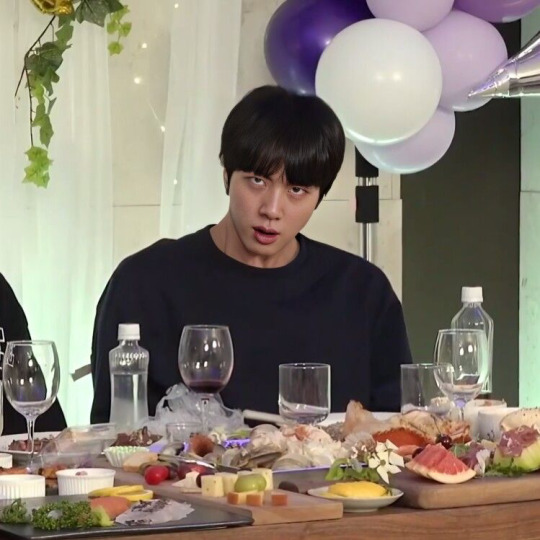
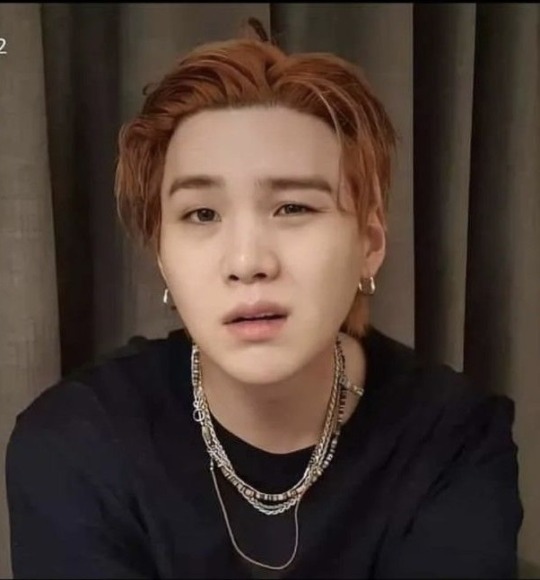
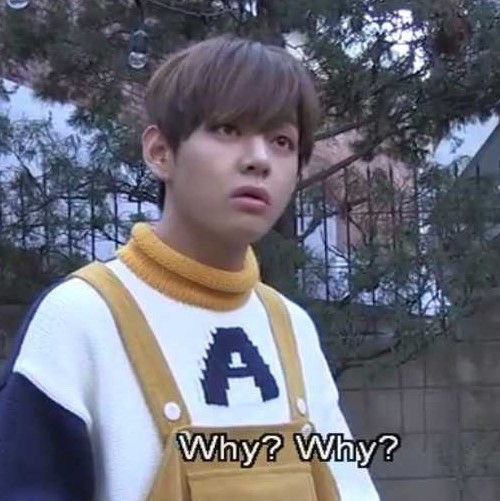
I know social media is a representation of the real world and that there are nasty people in the real world, so of course it makes sense that there are nasty people online, it’s just tiring and sucks the fun out.
They won’t stop me enjoying BTS’ music & content, them as individuals and a group nor will they stop me enjoying whatever Jikook chose to share with us,
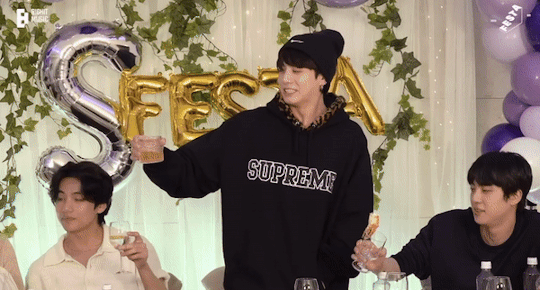
but everyone once in a while it does mean I get social media fatigue, fandom fatigue and the need for me to do posts like this.
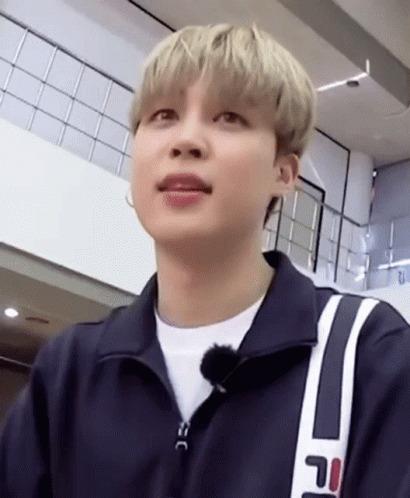
💜
Please use this post to share on the good things you like about the fandom, the group and BTS & Jikook online spaces. Let’s bring the positivity back for ourselves 💪
I hope anyone feeling like me can find what they need to keep on going in the fandom or make the move to take a break 💜
#turned from a small random thoughts into a full post#Jikook#Kookmin#Minkook#tired#BTS anti’s fatigue#Jikook anti’s fatigue#social media fatigue#random musings#random thoughts
32 notes
·
View notes
Note
From a cultural aspect, how did the Old Norse view storms? I know there's the Thor = thunder = storms connection, but I'm thinking beyond the associations between Thor and storms
I'm actually hesitant to draw a complete equivalence between Thor and thunder. It's a solid guess that that was a stronger association somewhat before most of the texts we have. In Old Icelandic, there is no common noun þórr meaning 'thunder' (thunder is called þruma usually, though also reið/reiðir, probably related to the idea of Þórr riding around in his chariot). Danish, Swedish, and Norwegian all have words for 'thunder' that relate back to Þórr, though they are derivations rather than using the same word for both the god and the natural phenomenon (like þunor in Old English). It probably was used that way earlier, but not in the material we have. If someone read the Eddas without already knowing of Thor as "the god of thunder," they would probably not draw that conclusion on their own; our best evidence for the connection beyond linguistics comes from non-Eddic sources.
There is a convenient explanation for all this: it rarely thunders in Iceland (though I can't confirm that that was true a thousand years ago). Since Thor appears to have been the most popular god there, and it doesn't make a lot of sense to keep him restricted to a phenomenon that rarely happens there, they probably diversified his associations. Perhaps the thunder thing stayed stronger in places like Denmark, but they didn't write as much about the gods.
A possible exception here might be Hallmundarkviða. This is a poem about a volcanic eruption that describes it as a battle between a jötunn and Thor. Though there is nothing in the poem that specifies this, I wonder whether Thor's presence was considered to be indicated because of volcanic lightning.
Even if that example is excluded because it's inconclusive, I don't want to overstate the separation of Thor from thunder. In the sources we have, Thor definitely is still associated with it, just not as directly as often assumed. His power is sometimes expressed in terms of different natural phenomena, like hailstorms and high winds. The best example of this is Rǫgnvalds þáttr ok Rauðs, in which an animated idol of Thor causes windstorms by blowing into his beard. There is a very cool paper by Richard Perkins about this called "Thor the Wind-raiser and the Eyrarland Image" available for free on http://vsnrweb-publications.org.uk/.
Storms are sometimes caused by other gods. The most famous example is the battle between Hákon jarl and the Jómsvíkings. Before the battle Hákon jarl sacrificed his son to his ancestral deity Þorgerðr Hǫlgabrúðr for victory in the coming battle. During the fight a hailstorm started and was devastating, but only to the Jómsvíkings for some reason. But any second-sighted people present saw that Þorgerðr and her sister Irpa in the hailstorm, shooting arrows from their fingertips at the Jómsvíkings. This story can be found in Jómsvíkinga saga. I'm not sure if there is anything to say about Þorgerðr's name being compounded from Þórr. For anyone unfamiliar, Þorgerðr hölgabrúðr seems to have been some kind of dynastic deity, heavily associated with the Háleygjar dynasty and Hákon jarl in particular, though she does seem to have also had a broader relevance.
There are other figures probably related to storms. My namesake, Þorri, is part of a whole family of snow and storm jötnar including Kári ('wind/storm'), Snær ('snow'), Drífa ('snowfall/snowstorm'), etc. Loki's brother Byleistr might be related to storms, though that's only one of several possible meanings of his name, as could Fárbauti (though I find that unlikely, I talked about both of these recently). Konungs skuggsjá ('the king's mirror') describes sea monsters (hafdramba, hafgýgur) as bringing huge storms at sea.
Storms could be caused with magic, usually to cause harm to an enemy such as by sinking their ship. This is called gørningaveðr (modern gjörningaveður; also galdraveður). A well-known modern Icelandic procedure for creating gjörningaveður is similar in form to a níðstöng; one raises a pole, places a ling's (the fish) head on it, and turns the fish's face in the direction where you want the storm to occur. Interestingly, if one doesn't have a ling, they can carve in runes "Þórs höfuð" (spelled "Þors haufud" in the orthography of the time), meaning 'Thor's head', into the pole instead. One summer when the biting flies in the Mývatn area were too much to tolerate, Galdra-Brandur (a real person, but also made into a legendary folk figure) caused a snowstorm by chanting a rhyme addressed to Gylfi (the same name as the supposedly human king in Gylfaginning, but here probably a jötunn) which killed the flies but also a lot of sheep, and also two people. Vatnsdǿla saga also features a procedure for dispelling gørningaveðr involving widdershins motion, waving a (goat skin?), and speaking Irish. Interestingly, a very very modern example of the same thing from Shetland also involves circular motion and possibly speaking Gaelic.
In poetry, battle is often described by being compared to a storm (e.g. in kennings like sverðhríð 'storm of swords' or hríð Hristar 'storm of the valkyrja Hrist').
I'm not sure what else to add. They wrote a lot about storms, but most of it is just reporting that a storm occurred, and whatever damage it caused. That makes it hard to run corpus searches and identify what's useful for responding to the question.
33 notes
·
View notes
Text
there's a post i've seen maybe twice that's got i think at this point 20k notes. it's about how, like, fictional depictions of medieval women Get It All Wrong (true); how our notions of medieval misogyny are relics of the victorian age, not historical reality (eh??); how class is a more realistic way of understanding premodern womanhood than gender (to some extent!); and here are some ways you might consider writing medieval women, e.g. "tip #2: remember that for medieval women, wife and mother wasn’t the ideal, virgin saint was the ideal. By proving yourself “not like other girls” you could gain significant autonomy & freedom".
the idea that victorian people had particular essentialist ideas about the genders (e.g. the angel-in-the-house-style separate spheres philosophy) and either a) medieval people didn't, not to that extent or in that mode OR b) that has overdetermined our notion of what all the past looks like strikes me as more of a starting point than a conclusion.
like, okay, the idea that there was a singular ideal for women (and that it's virgin saint, lol), even just women in a particular period in a particular area of the medieval christian world-- that does run so categorically against the idea that class is more explanatory than gender here. what you might say, though, is that you can extrapolate this as the sole ideal for women from the historical record (i don't think you can, but let's play) as a result of class and social position. christine de pizan was a court scholar for numerous members of the french royal family. most of the writings that survive of medieval christian women are the products of either noblewomen or nuns. but second of all-- you can't say that the virgin saint was the female archetype rather than the mother or the wife. the virgin saint is literally both of those things: she figures the virgin mary, whose virginity is important because of her maternity; she figures the church, which is allegorically the bride of christ. it's also worth noting, of course, that the virgin saint (i.e. the nun, presumably?) is not the same sort of ideal as the wife or the mother in any material way.
all of this is emblematic about how much of the historical record works and is made to work. in terms of real, factual women who were either able to write at great length or written about with any interest, you have the inevitable upper-class bias, as the post tacitly notes: "Often as nuns, saints, mystics; sometimes as warriors, queens, & ladies; always as businesswomen & merchants, women could & did forge their own paths in life" (odd groupings). in drawing in literary sources, as studies of medieval womanhood always do, you have the additional problem of fabulation, which you are trying to read a theory of womanhood or at least an account of gender roles out of. (medievalists, due to the size and conservatism of the field, are also notably not very good readers when it comes to gender.) e.g. the post cites a thesis which is, as i am looking at it now, significantly about the roman de silence (reading it out of the context of hagiography and alongside the roman d'eneas). the desire for fiction to work as historical record is common in medievalism (really in all premodernism), and understandable, and has some foundation. it is rare to see this foundation meaningfully established in this work.
the other problem you have for the concept of medieval women-- whether you just want to, like, depict one, or have some baseline understanding of what their lives were like, or do them justice-- is the privileging of the individual and the outlier. "women could do this in the middle ages" is often a sentence backed up with, like, five truly good examples, one of them legendary. the desire for a history of empowered women gives you a certain kind of returns; the expectation of a history of misogyny gives you a certain kind of returns. this sort of "THIS IS HOW MEDIEVAL* WOMEN REALLY WERE (*LIMITED TO A SPECIFIC SETTING, AREA OF INTEREST, ETC.)" trumpeting is naturally not about all women of that particular context, and to do so-- beyond the really quite blunt-headed approach to the dynamism of both gender and misogyny-- strikes me as a great disservice to this object of study, delimiting womanhood to solely that of the wealthy and, by that same token, empowered. if nothing else it's certainly telling about the state of gender scholarship in pop medieval history (if not also medieval studies) that feminist interventions get you to about the mainstream scholarly feminism of the 80s, where gilbert and gubar write a whole book named for bertha mason that is only really interested in jane eyre.
#i got like no sleep so i have no filter. sorry or whatever#this post drives me INSANE.... you can't use tolkien as your best example of the medieval status of women#'oh he was a medievalist' yea he was drawing from medieval literature. you know. where there is often artifice. famously he knew about that#imo if you assume that misogyny is not a dynamic ideology your feminist historiography will inevitably suffer
5 notes
·
View notes
Text
20 Questions for Fic Writers
I wasn't technically tagged in this but it popped up in one of my old ship tags so close enough!
How many works do you have on AO3? 18, I'm not very prolific haha
What's your total AO3 word count? 60,598 (again, not very prolific lol)
What fandoms do you write for? It changes over time, depending on what I get inspired by. Back in the old days (not on AO3) it was a lot of Pokemon and Gundam Wing. On AO3, it's been mostly Abraham Lincoln: Vampire Hunter (yes I know lol), Victoria (ITV), and Remedyverse. You may notice 2 of those 3 feature Rufus Sewell in them. :D
What are your top 5 fics by kudos? Autumn Hearts, my first big fanfic; To The Rescue, which was written for a friend; Christmas Lights; Compass Rose; and Winter Hearts, the attempted sequel to Autumn Hearts that I ran out of steam for. 4 out of 5 are for the ship Vicbourne from Victoria, a fandom I was very active in at the time. (Hopefully one day a Remedyverse fic will pull into that lineup!)
Do you respond to comments? Yes, just about every one! Sometimes I don't if it's been multiple years since I wrote the thing and I don't have much to say back, since I figure some people don't necessarily want the author to respond anyway.
What is the fic you wrote with the angstiest ending? Uhhh maybe Dreams of Zanarkand, but it could tie with a couple others depending on how you look at them. I don't tend to write angsty endings in particular, more just one-shots or chapters.
What's the fic you wrote with the happiest ending? Autumn Hearts, for sure. It's akin to a fix-it fic.
Do you get hate on fics? Not really. I had someone harassing me via comments some years ago, but despite what they said, it wasn't really about the fanfics.
Do you write smut? Yep, sometimes.
Do you write crossovers? I used to, a looong time ago, but not anymore.
Have you ever had a fic stolen? I don't think so.
Have you ever had a fic translated? No, but that would be cool!
Have you ever co-written a fic before? Yes, though not in a very long time.
What's your all-time favorite ship? Whatever my current one is. :D Haha but seriously, aside from a few pieces that I wrote for friends, you can pretty much tell what I'm fixated on by what I'm writing about.
What's a WIP you want to finish but doubt you ever will? Honestly, Winter Hearts was never intended to be finished because it was just going to be something I chipped away at when I felt like it and had ideas, but it would have been really cool to have the full 4 seasons of titles. I tend not to post anything unless it's finished, these days, because having them sit there unfinished saps my motivation.
What are your writing strengths? Dialogue that flows and sounds natural and in-character, I hope. If nothing else, I want to get the characters right, even in AUs. Most of my stuff is character-based rather than plot-based, anyway. I also love leaving little crumbs from the source material in my writing, like exact phrases or motifs used in different ways. Not sure if that counts as a strength.
What are your writing weaknesses? Supplementing dialogue with action or prose. I often like letting the reader draw their own conclusions, but I think that can make things a little sparse or unclear. And long plots are hard. And I'm just a rather concise writer in general, so nothing gets particularly long, even when another writer might have the same thing be twice as long.
Thoughts on writing dialogue in another language in fic? I don't really do this because I don't have occasion to, but there are various ways to do it. If it's substantial and you want it to actually be understandable to the reader and aren't relying on, say, language puns or something, then just mentioning they're speaking another language and putting that dialogue in italics can work.
First fandom you wrote for? Pokemon, so many years ago! I actually wrote a story with my friend by passing notes in class, kind of like roleplay but before I knew what that was. I copied a lot of it into a little notebook that I still have. I didn't even know to start a new line for each character's dialogue back then!
Favorite fic you've written? Autumn Hearts and now Apeiron. They're my most ambitious. Though Autumn Hearts will always hold a special place for me because it taught me I could finish something that long.
I'm tagging @wondrouswendy @pintsizeninja @residentvampp @zoi-no-miko @ryanthedemiboy and anyone else who sees this that wants to! No obligation to those I did tag, of course.
1 note
·
View note
Text
The Subtle Horror of Evangelion
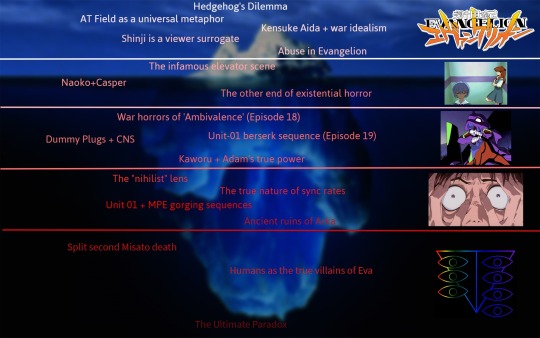
What keeps us all hooked to Eva time and time again? You get through your initial, confused watch of either Evangelion endgame, probably sometime in your adolescence wondering what the hell it is you just watched. The original source material is suffused with unsettling imagery, and sometimes too-close-for-comfort shorts. It’s so much to process that one watch is never enough. The imagery isn’t enough, however, because the mid-to-late-90s series comes with things you’ll pick up the more you focus on certain characters’ struggles or the interesting world-building. They arise little by little with every re-watch, adding onto what interested you in Eva to begin with.
There’s always that little voice asking you “What it is that really draws me here?”
Oh. The horrors.
The tragedy of it all.
These things never leave you the second you bear witness to them, whether you become aware of them or not. You’re disturbed over it, a tad worried, no doubt, but you’re strangely hooked.
Horror works better on limitation, it’s why found footage capturing pale, ghastly, monstrosities of the deep wood will always stand as exponentially terrifying. While most all of us have taken cracks at Eva’s budget at some point, that’s what really drives these terrors home. Its low budget nature made it work.
Evangelion has commentary which forces a viewer to reflect. Most no one enjoys that. It’s the fear, however, that has its audience come back. Evangelion’s reflection alone isn’t what gives Eva it’s charm decades after its run. It’s the little things, most everyone misses, the anxieties, the terrors, all of it. Most of those things, fly over a lot of fans’ heads.
Buckle up, there’s a lot to go through…. (warning for mentions of abuse, body horror, means of suicide, nudity, blood, and gore)
Table of Contents
I. Icebergs for Dummies
Tier 1: The Tip of the Iceberg
II. The Hedgehog’s Dilemma
III. The AT-Field as a Universal Metaphor
IV. Kensuke Aida + War Idealism
V. Shinji is the Audience Surrogate
VI. Abuse in Evangelion
Tier 2: Just Below the Tip
VII. The Infamous Elevator Scene
VIII. Naoko + Casper
IX. The Other End of Existential Horror
Tier 3: The Body of The Iceberg
X. War Horrors of ‘Ambivalence’
XI. Unit-01 Berserk Scene
XII. Dummy Plugs + CNS
XIII. Kaworu + Adam’s True Power
Tier 4: Pre-Abyss
XIV. The “Nihilist” Lens
XV. The True Nature of Sync Rates
XVI. Unit 01+ MPE Gorging Scenes
XVII. Ancient Ruins of Arka
Tier 5: The Abyss
XVIII. Split Second Misato Death
XIX. Humans Are The Villains in Eva
XX. The Ultimate Paradox
XXI. Conclusion
I. Icebergs for Dummies
For those unaware, the iceberg image illustrates that things are much deeper than they appear, just like an actual iceberg. You’ve probably seen this selfsame iceberg--- separated by tiers--- a few times looking through late night internet rabbit holes (Putting it out in the open: I’m personally guilty of this!), fictional or non. It helps you understand why you’re so enticed to certain material, that you’d revisit them. The highest parts of the iceberg are the things in the material most everyone knows, the surface level stuff. The lower you go, however, the lesser known the parts of the material are. These are the things the person are aware of.
Eva has some iceberg illustrations if you look around, albeit they don’t go through the more saddening, sometimes graphic factors of Eva, only theories navigating through Eva’s universe. Evangelion is so deceptively packed with blink-and-you’ll-miss-it subtleties that if an iceberg were centered on that, the diagram would be packed. And I’m being generous as I write this.
A few ground rules, before we begin: The iceberg will deal with the more obscure and dark material as the tiers get higher rather than it only being relegated to obscure bits. The lower the tier, the higher the iceberg and the more subtler the anxieties which graduate into horrors the deeper you go.
Yes, Evangelion is occasionally horrifying. No, Evangelion is not lovecraftian. I think people use the term lovecraftian way too freely. It’s not enough to see something with (sometimes too many) limbs twisted in ungodly angles. Or legs where legs shouldn’t be. The same applies for creatures assuming forms we don’t entirely comprehend. Eva has never delved into the angels being incomprehensibly terrifying specifically because they come from a cosmic expanse.
Some of these actual horrors, big and small, hit you after adolescence, something that makes you feel deeply for the characters’ dilemmas. It’s a feeling that grows and sometimes aches, rather than fades over time for many of us.
Tier 1: The Tip of the Iceberg

II. Hedgehog’s Dilemma
III. The AT Field as a Universal Metaphor
IV. Kensuke Aida + War Idealism
V. Shinji As the Audience Surrogate
VI. Abuse in Evangelion
II. Hedgehog’s Dilemma
Evangelion has its hand in so many psychological and philosophical cookie jars, from Freud, to Maslow, Johari, as well as Dostoevsky. The very tip of the Subtle Horrors of Evangelion Iceberg is something viewers are introduced to in the fourth episode of the series. It is one of the many psychological concepts dotted throughout the original show. Out of all those psychological concepts, this is the most explicit and most recurring.
The Hedgehog’s Dilemma describes the conundrum of two hedgehogs. The closer two hedgehogs become to one another, the more they harm each other with their spines. If you want to properly live, you need the closeness and intimacy of others. By allowing yourself to be close, however, you end up at great risk of being hurt. It’s the very reason what drives those who live to become guarded. Being perpetually apprehensive or building up walls isn’t a remedy for pains, however. The Hedgehog’s Dilemma isn’t just about why people become guarded after relationships ended on bad notes. It’s about the overall inevitability of pain.
Life is a continual push-pull of relationships, because we’re all creatures of comfort. We guard ourselves to varying degrees and sometimes even tell ourselves we won’t get close again, but personal comfort is one of our most ultimate drives.
The Hedgehog’s Dilemma not only describes that harm happens to us anyway, but illustrates that because comfort is universal we seek companionship regardless.
III. The AT-Field as a Universal Metaphor

The AT-Field is the most crucial rabbit hole in understanding the largest meta-narrative of Evangelion.
If Hedgehog’s Dilemma explains the what and the why people become more or less guarded, then AT-Fields explain the how. People build up walls around themselves all the time. You walk away from someone because they crack a smile at you... and it seems off.
Because you feel an anxious pang.
That’s an AT Field.
AT-Fields, or Absolute Terror Fields bear a few metaphors, one of which being boundaries. You see it as Shinji’s fear of becoming intimate, knowing the future implications or Asuka’s masculine protest (putting up a front). We can see an excellent example of the AT Field used by Asuka, her “Wall of Jericho” in episode 9.
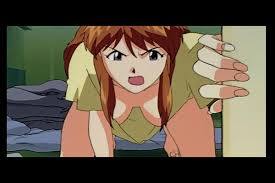
You also see it manifested through the angels, the strange creatures in Eva who supposedly desire to merge with Adam, their mother. Seeing this in the angels makes you realize that the AT Field is actually a metaphor for boundaries which implicates us all. In episode 22, Arael, 15th angel, seeks to understand Asuka. The angel uses its AT-Field (a beam of light) no, its boundary, to breach Asuka’s boundaries.


AT-Fields can be used to not only build up personal walls but to breach them as well. The irony of Arael’s action is that Arael’s AT-Field being erected while it floats just over Earth’s gravitational field makes it immensely similar to the Second Child; they’re both guarded.
The AT-Field is a funny sort of thing because it also sometimes explains how two people who are so alike can be guarded from one another. Sometimes you gain contempt for someone because they’re too much like your least favorable traits. You see this with Shinji and Asuka, both children without their mother desiring validation. Shinji calls Asuka a child midway into episode 9 and Asuka isn’t shy on voicing ideas of Shinji as dense or immature. They’re throwing stones in glass houses.
AT Fields are used to get the user out of dangers both physical and perceived. Sachiel, 3rd angel in the original series’ pilot episode, uses its AT-Field, in the form of flotation, to get itself from enemy fire. It never shows this until it is attacked first.
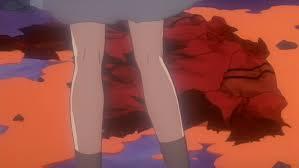
AT Fields are also responsible for one’s identity and physicality in Eva. Without the AT Field you don’t really exist. When Rei assumes the form of the person the character being cast into Instrumentality loved most in End of Evangelion, she’s causing the character to give up their AT Field. With that gone, they lose their physicality, turning into LCL (given the lovely term ‘tanged’ by fans). The ‘tanged’ individual suffers metaphorical death. Evangelion argues that in order for one to exist, others must perceive you and you must perceive you, a point best illustrated in episode 16. Since everyone is converted to LCL, no one really ‘exists.’ Rei describes this unnerving state as the inability of differentiating who you are and others, since everyone lacks a physical state without AT-Fields. Metaphorical death can be argued as worse than physical, since we all exist to make an impression of some sort. It’s what ties all the Eva cast together and the cause of their dilemmas. Validation. You can be living, yet very much forgotten or simply unknown.
There is living and there is “living.”
You can’t “die” unless someone knows you. You were never there.
AT Fields are the thing that make us live, but as a drawback, prevents us from understanding each other fully. Kaworu states in episode 24 that AT Fields are the wall of the mind and the heart of the soul, an unapproachable piece of sanctuary. When all else is taken from us, all we have left is our place of respite.
I’d also like to pitch the saddening reality that the AT-Fields are what prevent us from understanding angels as a whole, our genetic siblings as scared of this world as we are. The psychological angels want to understand us, that much is true. The angels, however, use forms of communication at the expense of our boundaries. Because people greatly value boundaries it makes it hard for us to comprehend angels. The creatures are hardly malicious when you realize they wonder why we all do things that actually hurt us, as well as the fact that they do understand our minds. But, because they breach our boundaries, we become even more wary of the (mostly) unknown. Angels may be us, but the strange forms they take are something we aren’t familiar with. The feeling is mutual with angels, wondering why there are many of us, our forms and outward appearances so identical. It’s a truth as old as time that we all fear the unknown.
The anxiety of an AT Field means comprehending that there’s very little chance to 100% get others. Because we’re all wary in some degree, because we’re set in an idea or perception of someone, even if the someone in the past no longer applies. It’s not healthy for you to continue dwelling on relationships not meant to be, keeping yourself up at night asking why, because both of you have closed off each other for good. There’s always that chance the other can come back and if they do seek to understand despite past hardships, that’s good. If they don’t, all you can do is move on and accept it.
IV. Kensuke Aida + War Idealism
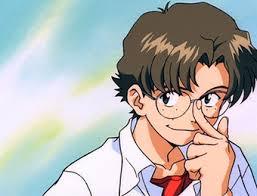
Kensuke is one of Shinji’s classmates, a supporting player in the series. He’s close with Toji Suzuhara, a boy who takes his anger on Shinji, after finding out that his sister has been injured during Shinji’s fight with 3rd angel Sachiel. As Suzuhara beats him down, Kensuke downplays the incident. Kensuke’s and Toji’s relationship is particularly interesting because the latter is affected to some degree by war (the war by humanity to prevent our destruction by angels). Kensuke glorifies the sentient, implicitly eldritch, multi-armored war-machines.
Kensuke can be best described as the ‘wow, cool robots’ drawing you’ve probably seen floating around. This is in relation to Gundam’s war commentary, but replace Gundam with Eva. Kensuke is enamored with the Evangelions and totally, willfully ignorant to the war horrors. Adolescents are forced to be the salvation of humanity, feeling every bit of damage to their own bodies whenever the Evangelion takes any hurt. Even after the war for humanity is long over, the pilots will be afflicted with traumas that will always hang over them.
Kensuke’s glorification is also what draws him to be Shinji’s friend. He uses Shinji’s status as a way of becoming a pilot himself by meeting up with Misato, putting himself at the cockpit of a strange creature magnificent machine.
When Toji becomes hospitalized after his battle in a hijacked Unit-03 vs. A Dummy System-controlled Unit-01, Kensuke expresses discontent at not being a pilot. He’s annoyed because “everyone” but him is a pilot.
Thing is, Kensuke isn’t heartless, just ignorant. Idealism is one of the uglier things that runs thick in the heart of Evangelion. His is one of many cases of unhealthy idealism in Eva, another example of making it difficult for those living to understand one another.
V. Shinji as the Audience Surrogate
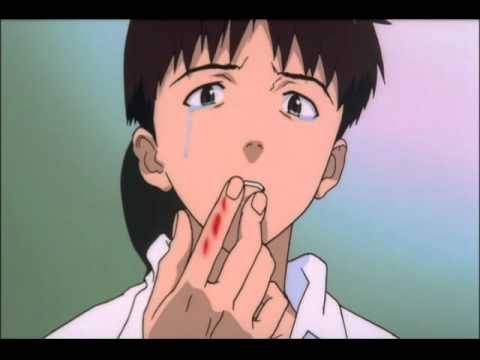
Shinji as the audience surrogate isn’t always touched up on, but is sort of understood subconsciously by a lot of the viewers. Shinji’s character is specific, yet so generalized that him being a surrogate for the audience just… works. Don’t believe me? Shinji gets two psychological exploration-based episodes whereas Asuka and Rei each have one. Episodes 16 and 24 are both psychological angel episodes, albeit the latter is more in-series subversive. The 24th episode doesn’t involve a breach of subconscious boundary, but the pilot (Shinji) is in the hot-seat, being made aware of their issues. Leliel, 12th angel, contacts Shinji in the former of these. Both characters talk to one another, shown as a series of horizontal lines and vertical lines, sometimes intersecting. These lines are a strong reference to the Johari Window, a tool in psychology which helps someone become more aware of themselves. The Window’s quadrants are as follows
1. the part known to the self
2. the part known to others
3. the part known to the self and others
4. the part known to no one
Leliel also states that the self only exists of one perceives themselves as well as others. The angel also states that Shinji could better his reality, to which Shinji absolves himself of responsibility by arguing the horrible state of his reality. It’s a subtle pushing to Shinji and by extension the viewer into free will. Kaworu builds up on these concepts with Eva’s in-universe concept for boundaries. Free Will versus Determinism is brought up here, with the idea that AT-Fields are brought up because the living (again, not people – emotional complexities aren’t only human) will them into existence. By exercising free will, it means enduring pain, one of Shinji’s, and again the audience’s greatest fears. Any relationship has pains and conflicts. This is all a buildup of free will, determinism, self-awareness, and the Hedgehog’s Dilemma. Understanding all of these means swallowing the “pain is inevitable” pill. The problem with much of us is that we like the idea of relationships rather than being in one. We want to feel validated but without the conflict, even if the conflict can be solved. We’re all Shinji because we’re all aware to life’s hellish catch-22s, so we run. There’s times in our lives where we run as far as possible from these woes, these truths, but there’s pain in running too. It’s why escapism seems like such a viable action for some of us.
Pain is inevitable, but pain can be mitigated.
More damning evidence to Shinji being a viewer stand-in lies in either endgame of Evangelion (pun intended). In EoE, after the Komm Susser Tod sequence of everyone on Earth being tanged, we’re treated to a shot of EoE’s live audience.
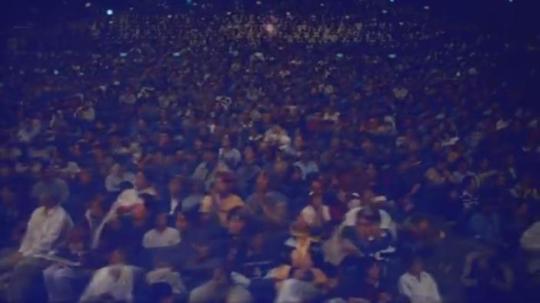
We hear Shinji’s voice about his reality while he talks to Rei toward EoE’s end. There are shots of the city, of people going about their daily lives cementing that this is about us. End of Evangelion shows us a less favorable side of Shinji, a departure from the lauded end series “Congratulations” scene, in which he does understand free will rather than perpetually dwell on negatives. Shinji reacts unfavorably toward Asuka in EoE after his mother’s speech to the audience that ‘anywhere can be paradise’ and Shinji stating he doesn’t know where his happiness resides. Shinji (We) still has a ways to go if he wants to be a better person.
It’s probably why many of us are either inclined to champion Shinji or harangue him, and either reaction is fair. Many of us are aware of audience surrogates, but never to this extent. Shinji isn’t his best person, but he can be. Being his best means self-reflection. Droves of people who first were exposed to Evangelion were teens, and again many of Shinji’s woes are specific yet so generalized, hence our feelings of defense and possibly disgust.
No one likes scathing, yet accurate call-outs on their person, but they’re paramount for us to understand ourselves and others.
VI. Abuse in Evangelion
One of the worst things recurring in all of original Evangelion is a bevvy of abuses.
Abuse comes in many shapes and forms and it’s many characters’ realities. Abuse happens not because the universe ‘wills it’ (determinism aka, ‘that’s just how people are’). Abuse, be it conscious emotional absence, actual neglect, among other ungodly acts fly though the cast.
Abuse is cyclical and a lot of those doing it often get away with murder because they have power.
Much of Eva is comprised of children being forced to sort through adults’ emotional baggage. Those children become adults and the cycle continues.
We all know a Gendo. Or even perhaps a Misato. Hell, even a Ritsuko.
Anno states that Gendo’s character is of a societal meta-text, which explains many viewers’ ire in relation to the character. He’s responsible for many of the seedy goings-on in Evangelion be it the financial (see: Jet Alone’s orchestrated out-of-control nature to give NERV more funding) or abuses (see: Rei, Shinji, Ritsuko, and, Naoko). It’s for this reason why Gendo’s actions are a sore spot for a lot of fans.
Anno: I’m not sure that it’s a real father [that Gendo represents]. Well, not a father in the sense of a parent with a blood relation to his child, but more, I think, [in the sense of being] a representative of society or the system. That’s why he has that expression.
Takekuma: So, he’s kind of amorphous.
Anno: The angels are the same. I made them appear amorphous in that way because, for me, society is unclear, the enemy is unclear.
Takekuma: Gendo is [a representation of] the boundries or the pressure of society itself.
Anno: That might be it. Perhaps Gendo is [a representation of] society itself.
http://wiki.evageeks.org/Statements_by_Evangelion_Staff
After many re-watches of certain Eva episodes, it just hit me, as I’m writing this why I’m sometimes apprehensive on an adult-exclusive lens of the show. This happens a lot in adolescence and our struggles are made trivial because of the mishandled baggage. As children, you’re meant to be subservient to parental whims. You have this sort of obligation to solve their problems. Give them closure. It doesn’t even need to be parental baggage, but just from adults in general. You see the way the adults act not just with the children but with each other. You see the way Gendo justifies neglecting Shinji, objectifying Naoko and Ritsuko or Naoko’s emotional absences as a mother to her daughter (also manifested through the MAGI). It’s these immature excuses as to why they can’t extend empathy to those around them.
It’s always excuses.
Eva’s original series has always been a show about children.
Tier 2: Just Below the Tip

VII. The Infamous Elevator Scene
VIII. Naoko + Casper
IX. The Other End of Existential Horror
VII. The Infamous Elevator Scene
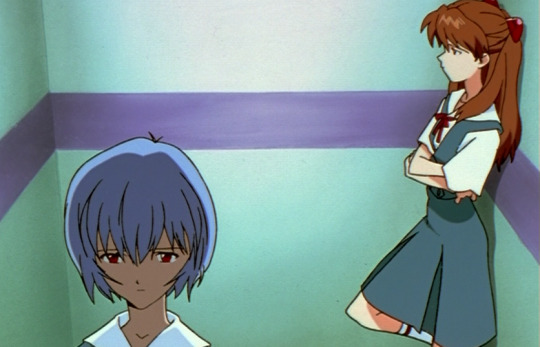
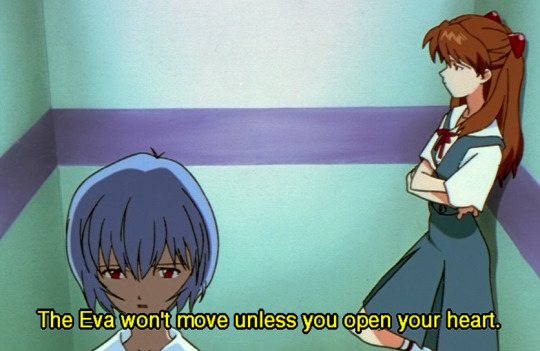
The Elevator Scene is a sequence that sometimes gets glossed over due to Evangelion’s fleeting budget. It took me years to realize the true gravity of the awkward silence of both the 22nd episode and its Director’s Cut version. The Director’s Cut version has Asuka abruptly jerking in the silence, but that blink-and-you’ll-miss-it moment speaks volumes. Understanding the scene means understanding why Asuka quietly stews in her anger. Understanding why Asuka stews means understanding Asuka from her debut to her emotional breakdown.
Asuka’s appearance in the 8th episode, Asuka Strikes!, is marked by a bold persona that carries on until the end. She isn’t shy on imparting her prowess to Shinji, stating that Units 00 as well as 01 were the prototype and the test type, respectively. Her Evangelion, Unit-02 is the finished product. She even states that she graduated from university. Despite these impressive feats so early in adolescence, the only time in which they’re noted is when Asuka talks of them. Misato takes in both Shinji and Asuka, but only ever “dotes” on Shinji. Gendo pays attention to Shinji because he pilots Unit-01, and 01 contains the soul of his late wife. Rei is the clone of Gendo’s late wife, hence Gendo’s attention and overall creepy, selfish obsession with her. Asuka and Shinji’s relationship, with Misato as their caretaker strongly mimics a Golden Child and the Second Fiddle. The only difference is, Shinji gains more attention due to Gendo’s and Misato’s respective baggage. Again, Eva is a series where children are forced to handle the baggage (with no break in the cycle) and when the child doesn’t have anything the adult particularly can clue in on, they become neglected.
That’s Asuka’s dilemma.
It’s why Asuka forces herself to grow up.
It’s why Asuka is driven to be competitive to Shinji and Rei, later growing contemptible at both.
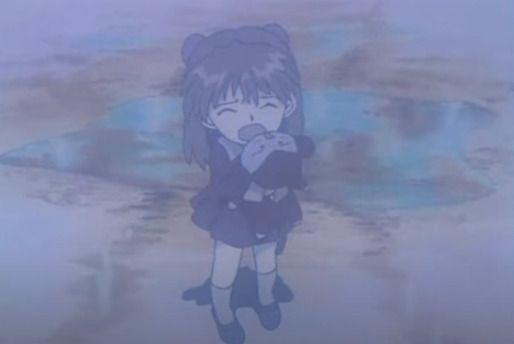

Asuka suffers a few curses, one of which being the youngest, the inevitability of being consciously sidelined dawns on her, leading to her selfsame breakdown toward series’ end. She aligns youth with trivialization, so naturally, she’d front with the opposite. She never gets help in relation to her period. Misato and Ritsuko realize something is up with Asuka but they never really offer her the support.
There’s also the flashback to her trauma in episode 22’s beginning. She’s replaced by her mother post-Contact Experiment (which led to a deterioration of her mental health) via a doll that looks like her, red hair in pigtails. It’s the leading factor to her feigned boldness, her ego. The way in which she is marginalized in the series brings it all back.
Rei breaks the silence with a few words of compassion and all Asuka can do is express disbelief. She mistakes compassion for contempt.
For pity.
The idea that anyone would extend kindness, especially now of all times, is unbelievable.

Asuka also experiences a dilemma here, a dilemma those like her face. She already knows what it means to be vulnerable and deeply hurt, but she needs to make herself vulnerable because now, more than ever, she needs the support. Being vulnerable will cause past traumas to flood back in full force, but by stewing she deprives herself of any support. Rei offers that support, but a few words of support in a wave of trivialization can’t help but feel a bit too strange.
Asuka’s greatest anxiety is realized in the twenty second episode. It’s of being and staying second fiddle, that she’s always been set up to fail. Even 2 episodes after the fact, in which she actually starves herself does she realize once more how she’s permanently ‘below’ others.
Asuka’s curse finds itself in real life, and it’s for that reason why I believe some find themselves resonating with her. Asuka’s gradual descent into bitterness is something I find myself waking up some nights thinking about after 7 years going through Eva; hers is a cautionary tale on being emotionally distant to cries of a damaged youth. Casually imparted knowledge of past achievements, and the competitive attitude mixed with embitterment, some of which from a genuine place but also a product of neglect. We were forced to play second fiddle, we forced ourselves to grow up to feel more legitimate, forced to carry an ire that stews because it seems no one listens.
VIII. Naoko+Casper
The late Naoko Akagi is a woman of multitudes. Those multitudes are compartmentalized into the 3 MAGI. They are Balthasar, Melchior, and Casper.
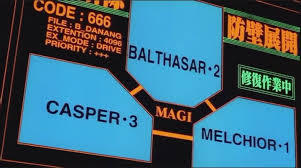
Casper shows itself to be the most prominent aspect of Naoko’s personality, her as a woman. Ritsuko states that, after the defeat of Iruel, 11th angel, that Casper is the part of her mother which remained that way to the end.
Balthasar and Melchior have been bested, be it by rival MAGI, or Iruel’s assault. This calls back to the fact that Naoko’s other facets aren’t anywhere near as prominent. Naoko has cited her own emotional negligence, of only showing emotions should it ever benefit her.
Casper on 3 occasions fights tooth and nail, Iruel’s assault, an attack by multiple MAGI in End of Evangelion or the defiance of Ritsuko activating the self-destruct sequence. Ritsuko does this to seek vengeance against Gendo for coming to the immense realization that he never genuinely cared for her. Gendo has always used Ritsuko for her body. This would destroy NERV, meaning killing herself and Gendo.
Then you realize why Casper overrides the sequence.
Casper’s stubborn behavior wasn’t actually to defend NERV but to protect Gendo. Casper’s defiance aka Naoko’s emotional absence toward her daughter allowed Gendo to kill a bewildered, rightfully angered Ritsuko.
The saddest part of Casper’s, no, Naoko’s choice is that Naoko got away with murder. Evangelion is a story about children dealing with the selfishness of adults and the adults never receiving justice for their wrongdoings. The relationship between Ritsuko and Naoko is an excellent example that this doesn’t just implicate the young pilots. Ritsuko dies in End of Evangelion with the truth that her mother, as a woman, in the end chose the man who manipulated both of them.
IX. The Other End of Existential Horror
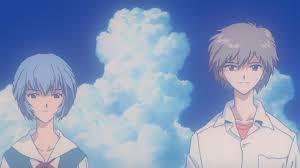
Some spend their whole lives trying to make a mark. Others can’t help but be known.
People get smart sometimes to get themselves out of a current situation. Kaworu and Rei’s existences are such that they’re deadlocked from living. Their existences are the product of an experiment, to be later heavily watched and raised as the Last Messenger. The latter is the result of Gendo’s obsession with his late wife.
Kaworu and Rei’s existential crises are opposite from the rest of the cast; while others do their damndest to become known, they cannot be unknown. Rei’s character centering more around her identity than other characters is also initially and sneakily alluded in the opening.

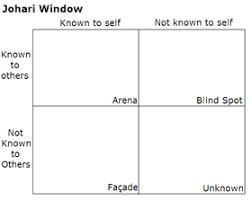
The Johari Window is a tool encouraging self-awareness in the person, alluded to twice in the show, with the second time being in the sixteenth episode. Both usages of that illustration, for Rei, and Shinji drive home crucial aspects of the meta-text.
This would also tie Rei to Shinji in End of Evangelion forcing Shinji to reflect on his own awareness and will. Rei is an astute, young girl whose arc is about her personal relationship with identity, something she is all too familiar with due to her objectified nature. Rei’s arc is even more so entrenched in identity than other characters that she is one of the characters imparting personal and universal realities.
Ayanami Rei’s existence from start to finish is inundated with the issues of others, causing her to internalize being always expendable. In Rei’s Poem in episode 14, it becomes clear that she sees herself based on usage. She likens herself to a field of flowers, which slyly alludes to the Dummy System’s “parts” 9 episodes later, other Reis.

Rei is seen as malleable vessel which houses thoughts rather than her own person and she can’t do anything about it. So she resigns to her reality. Even if she does tell off Gendo in End of Evangelion for his objectifying, she’s not even out of the woods. She never will be.
I used to think Rei’s “slap” to the face to the man with the (most) baggage was empowering. Then I learned about abuse during adolescence, how kids who lack a support system act while away from their abusers. Even saying an emphatic “fuck you” to your abusers isn’t enough to be a happy ending. Rei is a girl who lacks a support system and she suffers from it. Start to finish.
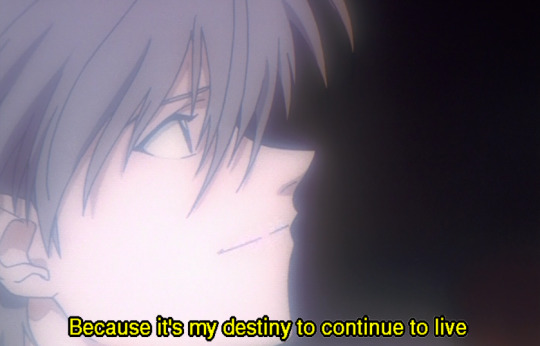
Kaworu’s crises are much trickier to pinpoint because there’s so little to work with. He doesn’t get an episode dealing with personal, subconscious explorations. Getting his character means first getting how Evangelion re-contextualizes what “Ode to Joy” symbolizes. It also means understanding the AT-Field and most people won’t pick that up on an initial foray. Or maybe even a second. Most people don’t pick up that the AT Field implicates anything living and physical or its metaphor for boundaries and identity. There’s the common misconception that Evangelion is a “human” show.
Kaworu marks off his appearance humming “Ode to Joy” while Shinji wonders who to turn to. It’s a song generally known for its jovial nature, but most importantly, Ode to Joy is:
known also as the “Choral” Symphony. Its finale is a musical setting of Friedrich von Schiller ’s “Ode to Joy,” a hymn to the unity and freedom of humanity.
http://www.dictionary.com/browse/ninth-symphony
The Choral Symphony assumes a more horrific context later on. Kaworu is the last messenger and what his action is would lead to the mass annihilation to lilin/human or angels. ‘Unity of man’ is changed in Eva’s context – it marks either unity of man or the death of man. It doesn’t matter who Kaworu allows unity to, because his hands would be stained with death anyway. Then you realize why Kaworu deploys his most powerful AT Field during his descent to Heaven’s Door.
This is his reality.
Kaworu’s status as the Angel of Free Will isn’t about him being the only complex angel, as a lot of people think. It’s about being the sole individual handing that freedom to others.
You realize his terrifying dilemma goes to the tune of being feared for his own existence as an angel (which he notes to Shinji) and not being able to properly live.
Sometimes you ”hurt” people by existing.
Sometimes people hate you for the simple act of existing.
Kaworu’s and Rei’s terror is the other end of existential horror, that you can’t help but forced to be known. Sometimes you have knowledge but aren’t allowed to do much with it.
Tier 3: The Body of The Iceberg

X. War Horrors of ‘Ambivalence’
XI. Unit-01 Berserk Scene
XII. Dummy Plugs + CNS
XIII. Kaworu + Adam’s True Power
X. War Horrors of ‘Ambivalence’
Episode 18 is where anxieties graduate into horrors both implied and visceral. Unease hangs over the episode, with the mystery of Unit-04’s disappearance and tests being done on Unit-03. Misato tells Shinji that because tests would be done, there’d be a pilot there. Misato uneasily withholds this info from Shinji and Kensuke breaks the silence with his recurring desire of being a pilot, still ignorant of the war horrors. There’s a subtlety that Shinji picks up on with Toji but not enough to put two and two together: that the big-eater himself isn’t feeling so hot.
The continual chirp of cicadas and birds nor the peel of the school bell are enough to break the unease of the viewer or of Toji. Toji goes from indirectly being affected by war vs angels to being chosen, drafted even, a child at the first line of defense for the apocalypse. We get a flashback of him beating down Shinji, before it cuts back to present day Toji. He will be in Shinji’s shoes.
Toji balls a fist, a recurring theme in Eva, to the tune of “What is your hand for?” Toji is finally about to take things into his own hands.
Asuka takes a few cracks at Shinji to Hikari that he hasn’t quite gotten the memo, but when Shinji asks her even she’s halted in words.
Then the day comes.
Tests are being done and suddenly Unit-03 goes rogue with Toji in her (note the Evangelions have the souls of the pilots’ mothers, save for Rei). Unit-03’s’s strange behavior is revealed to be the work of the 13th angel, Bardiel. Shinji’s ignorance is made worse by Misato’s absence (with Misato telling Ritsuko she’d tell Shinji the pilot’s info after the tests). Units 00 through 02 are sent out for the new threat and Shinji sees this new threat. Anxiety rises.
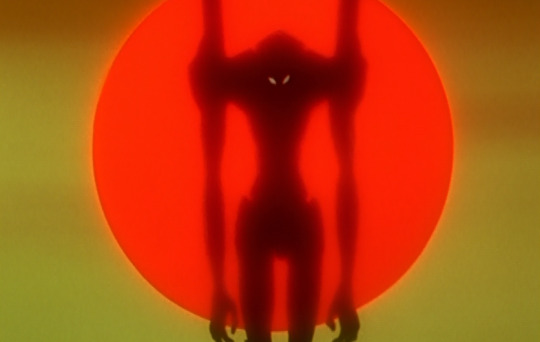
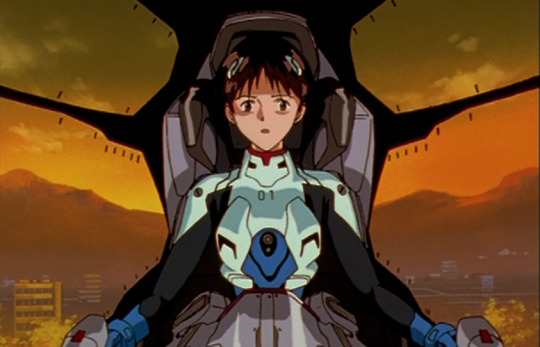
The song “Marking Time Waiting for Death” accentuates the anxiety. Unit-03’s silhouette eerily contrasts with the sun, her body slightly hunched and approaching slowly.
Fear washes over Shinji when he deduces that with an Evangelion inside, there must be a pilot.
Yet he still doesn’t know.
The other pilots are aware, and show reluctance to the revelation. A hijacked Unit-03 sets herself on Asuka, Rei, and even strangling Shinji. Shinji allows the angel-hijacked-being to strangle him, because killing another human being is simply horrific.

Eva has its hand in the war morals cookie jar here because Shinji stands at a conundrum, to other let this creature take his life or to murder flesh and blood. This dilemma goes double-time in war. Gendo asks why Shinji hasn’t dealt with the 13th yet, with a somewhat horrified Shinji pleading about the pilot. Gendo commands for the unfinished Dummy System to override Shinji’s controls and then suddenly...silence….
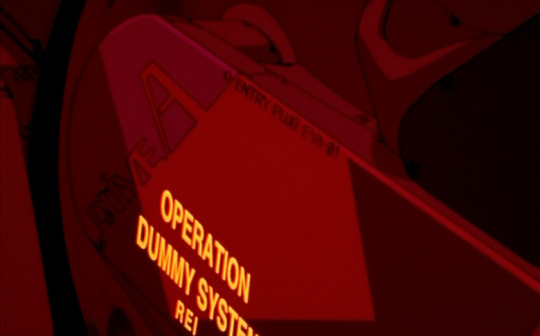
The Dummy Controlled Unit-01 springs back and we’re treated to a close-up of Unit-03/Bardi3l being strangled.


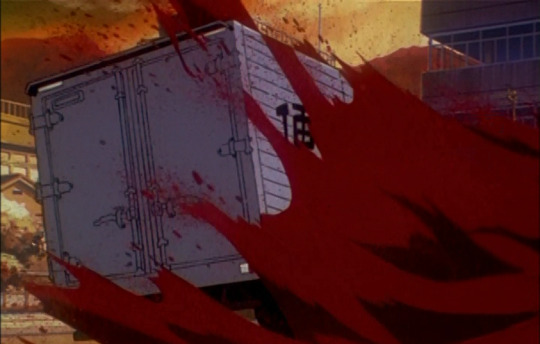
A nauseating crunch sounds and the unit goes limp. A controlled Unit-01 proceeds to raise hell on the incapacitated enemy, resulting in the unit’s blood and guts flowing through the streets. NERV’s personnel can’t do anything save for become fearful at the Dummy System’s capabilities. Terrible, visceral noises sound one by one as blows strike, as the unit’s severed limbs and blood splatters riddle the urban battlefield. Shinji hears every second, every squelch and splat.
Imagine the pain of 03’s pilot.
But the terrors don’t cease here.

01 doesn’t stop at just raising hell on the incapacitated 03, and we’re treated to another close-up shot of 01 tightly holding onto 03’s entry plug, before crushing it.
Somewhere away, Misato receives news that Unit-03 has been dispatched as an angel. Shinji feels the weight of having actually killed someone, before Misato actually breaks the news that the pilot is not only alive but that the greatly injured pilot is his classmate.
It never really hit me until now how this scene holds another horrifying subtlety. Compare this to episode 3, where Toji’s first interaction with Shinji involved him punching him, the very scene playing at this episode’s beginning. The 18th episode ends now with ,Toji and Shinji are both joined in the same camp, of children emotionally and physically marred by war, not able to fully control their situations.
XI. Unit-01 Berserk Sequence
Shinji stands in a situation where he can no longer take the terrors aligned with the Evangelion. He’s gone from sustaining injuries great and small from combat with the eldritch angels, to indirectly harming a friend through it. He resigns from his position as a pilot, understandably running away even with the approach of the 14th angel.
After a talk with Kaji about how he can control his future and he only, Shinji once again puts himself at the forefront of further pains. He must once more thrust himself to the terrors that align with the war-machines whilst struggling with other traumas.
During his fight against Zeruel, his Evangelion dies out and it all floods back to him. Shinji once again finds himself at a position of no power, frantically pressing at his controls to no avail.

He can only hear blow after blow of the 14th’s onslaught. He and Unit-01 are at their most vulnerable.
Until Unit-01 springs back.
W hat follows is the famous Berserk sequence, a scene whose terror can be thanks to Evangelion’s low budget.
We see the Evangelion in all her terror and the sort of off-ness that carries in this scene.

Episode 19 has no problems on treating us to front-row tickets to terror.
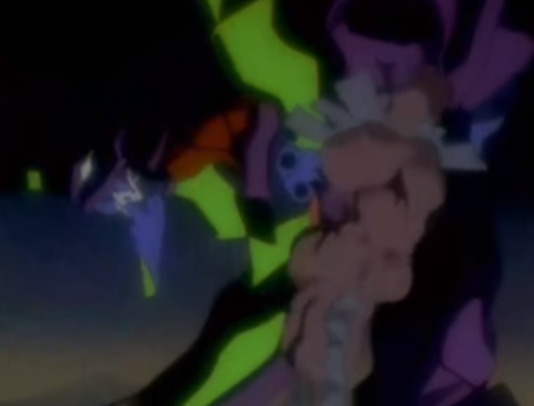
Unit-01 snatches part of Zeruel’s appendage and adds it to her mass. A sickening squelch sounds and her new appendage contorts into place in an instant.
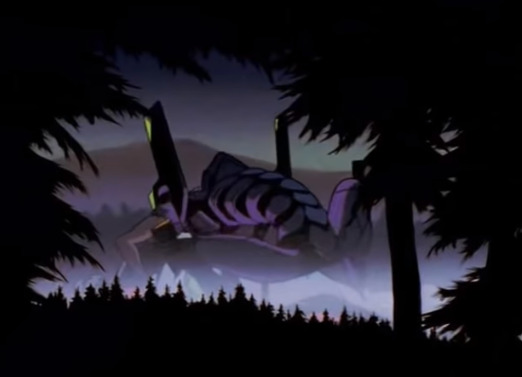

She moves over to her incapacitated, angelic meal and doesn’t hesitate to chow down. The shots feel too personal yet nowhere near in the sense of the show’s meta-textual reflections. It’s almost like stumbling on a cryptid and when she shoots a look at the viewer, it feels as if she’s looking at us, like we’ve interrupted her dinner. Or perhaps she did finish the meal... and she’s in the mood for seconds? Perhaps even thirds?
The bizarre and eldritch nature of the Evangelions goes full force with this imagery. Episodes 2 and 16 laid the foundation of how off the Evangelion Unit-01 was with how she openly mutilates her targets. Or even the unsettling roar of Unit-01 that’s not entirely bestial. The sound is straddles a line between the blood-curdling bestial and the human. But here? Eva Unit-01’s position, from her hunched figure, to her more feral position as she feasts, feels far too organic...and far too human.
The Evas themselves aren’t human, but the souls housed within are. Eva’s souls are souls of the respective pilots’ mothers, an example of the mother and child symbolism omnipresent in Neon Genesis Evangelion.
Shinji’s mother is Yui and as we go through the series, we realize the s2 engine appliance was intentional. An s2 engine offers infinite stores of energy and this is needed for Instrumentality. With the s2 engine within her grasp and the fact that Evas don’t subsist on anything, this would make the consumption of 14th completely recreational.
It’s super tempting to frame this scene as containing some abomination that now stands unchained and indiscriminate in its targets, but it isn’t. It’s sort of understandable because Units 00 and 02 don’t come close to exhibiting this sort of behavior nor were they in this circumstance. Neither Unit-00 nor 02 have any desires in regard to Instrumentality. In the end, we should look to Yui and her own endgame, because Yui’s running the show here.
XII. Dummy Plugs + CNS
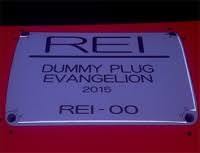
Ritsuko states the Dummy Plugs are machines which imitate pilot’s thinking. There’s a bit more than the possibility of this being 100% AI due to the apparatus Rei is in.
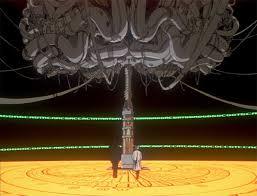
This very likely implies the respective person’s thought processes added with AI programmed in a way which best “describes” the pilot (basically how they are perceived). In episode 17, Rei is situated in this apparatus strongly resembling the central nervous system, the brain and the spinal cord.
{The central nervous system CNS is responsible for integrating sensory information and responding accordingly. It consists of two main components:
1. The spinal cord serves as a conduit for signals between the brain and the rest of the body. It also controls simple musculoskeletal reflexes without input from the brain.
2. The brain is responsible for integrating most sensory information and coordinating body function, both consciously and unconsciously. Complex functions such as thinking and feeling as well as regulation of homeostasis are attributable to different parts of the brain.
https://mcb.berkeley.edu/courses/mcb135e/central.html
Ritsuko imparts the unsettling revelation about Rei and by extension the Dummy Plant itself (after Misato coerced her into learning about Rei). The Reis are the core of the Dummy Plugs (and the System used to brutalize a hijacked Unit-03 and its trapped pilot). This scene adds more to the extent of Rei’s objectification, of her being replaced. It adds on to Rei III’s comment of being ‘the third.’
Rei isn’t savage by any means but the sheer brutality of Dummy System’d Unit-01 5 episodes prior may hint at her straightforward nature.
I’d like to pitch that Ritsuko’s approach to Rei’s Dummy Data was also the product of her subtle animosity toward Rei. When she refers to the Dummy Plug as a machine which mimics human thinking, she’s talking about Rei. She also refers to her similarly in episode 23 by referring to Rei as spare parts, as if Rei herself is some soulless machine whose parts can be switched out if need be. This could also call back to Rei’s poem, in which she calls herself a vessel which holds human thoughts.
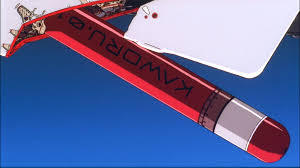
Another question remains: how does Kaworu play into this?
The MPEs (the Mass Production Evangelion series) use Kaworu’s Dummy data, meaning that there are cloned Kaworus stored off somewhere, perhaps floating with soulless smiles the same as Rei has.
Treated as spare parts.
This also implies that Kaworu is more or less reduced to an object.
What’s more disturbing is the nature of the MPEs gratuitous method of ravaging and mutilating Unit-02 and by extension Asuka.
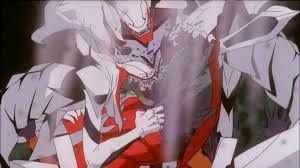
Kaworu hasn’t ever demonstrated any degree of malice, so this can’t really insinuate a ‘Kaworu is secretly evil’ narrative. But this can tie back to a recurring theme of humans fearing and despising angels. It’s because of this that the revelation of our genetically identical nature or the fact that they can comprehend our psychology is framed in-show as kind of shocking. It is because we’re so disturbed at the angels’ existence (or anything else we don’t comprehend) that we view them as inherently savage in nature. Kaworu’s quick-to-perceive personality most likely translated itself along with the AI. This would also rule in the somewhat strategic way in which the MPEs act against Asuka, exploiting her attack patterns through surprise attacks.
Some of Kaworu’s as well as Rei’s Dummy Data are the product of universal (Kaworu) and personal (Rei) contempt by people. Let that sink in.
XIII. Kaworu’s + Adam’s True Power
The bottom of the fridge horror portion of this iceberg is something that has subtly plagued me for years. We’ve only ever caught glimpses of Kaworu’s abilities in his debut episode. I picked up on it little by little with each re-watch of the episode, with every other time his abilities dawning on me. If I wasn’t focusing on how his character fits in the greater framework of Evangelion, I was cluing in on his abilities.

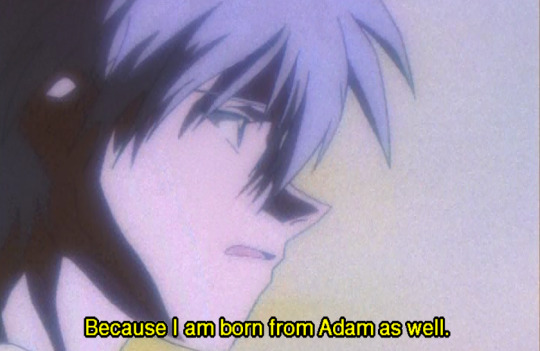
One of his abilities is being able to block out light, magnetism, and subatomic particles. Some of the forces which make up the universe. This witnessed by the viewer when he realizes the whole of humanity’s welfare hangs by a thread, due to the coexistence of angels and Adam.
Adam.
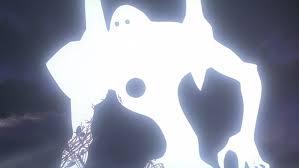
Adam’s soul lies within Kaworu. Adam. Who utilized an Anti-AT Field which caused Second Impact. An Anti-AT Field, which killed off much of the Katsuragi Crew in Antarctica.
This makes Kaworu the most powerful angel in the original Evangelion series.
Eva has shown that ownership of an angel’s soul (or partially, if you’re onboard the Rei I is in Unit-00 theory) allows the person to inherit the angel’s abilities through Rei. Rei blocks off Kaworu’s immensely powerful field with one of her own, canceling out both as a result. As we know, AT Fields for people are a figurative affair. People lack the physiology to exhibit a physical AT Field because they don’t have cores like angels do. Angels’ souls when possessed by humans have a sort of ability to circumvent parts of human physiology (if you’re looking for the whole package, you should eat angel’s flesh too). Rei also shows the ability to float, implied in episode 24 and shown explicitly in End of Evangelion.
But this raises a few questions about the last messenger is the ability to block out some of the forces of the universe Adam’s powers or Kaworu’s? Another ability that continues to plague me the more I think about it is Kaworu’s AT-Field usage on Heaven’s Door to bypass its lock.
We haven’t actually seen Adam’s other powers (if the angel has any) because the it’s anti-AT Field was halted via Lance of Longinus. Other than its ethereal appearance in flashbacks, we only see an incapacitated Adam in embryonic form. That’s it. We don’t know if Adam exhibits any other powers due to this impediment. If Adam does have more powers, this would add onto both the fridge horror factor of Adam and Kaworu.
Tier 4: Pre-Abyss

XIV. The “Nihilist” Lens
XV. The True Nature of Sync Rates
XVI. Unit 01+ MPE Gorging Scenes
XVII. Ancient Ruins of Arka
XIV. The “Nihilist” Lens
There’s something that implicates the whole cast. Something that goes beyond the meaning of the AT-Field, and the all-too-known Hedgehog’s Dilemma.
Eva is filled to the very brim with psychological concepts, but there’s one thing which ties this all together. It goes much larger than the desire to become validated or cycles of abuse and unresolved issues to a newer generation.
Free Will Vs. Determinism ties the entire cast together and is disturbing in its own right. It not only ties the cast together but also contributes to Eva’s meta-narrative.

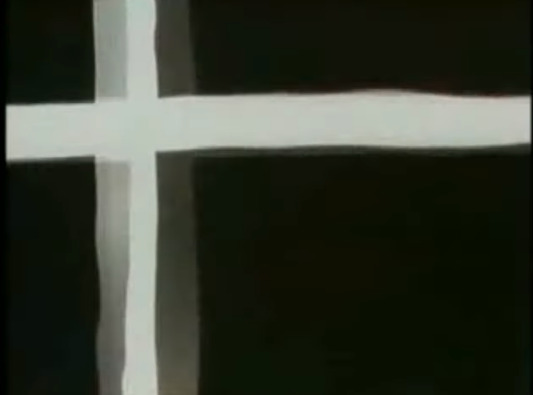
Episode 16’s sequence with Leliel, Shinji, and the Johari Window gives little breadcrumbs to this psychological dilemma. Leliel teaches Shinji about his own identity as well as slowly ushering him to a sense of self-awareness. Leliel also attempts to usher Shinji out of filtering reality with only convenient parts. Shinji argues that he can’t really be held culpable for his actions, because the one and only reality is that reality is awful, bar none. Not his reality, but reality as a whole. This deterministic stance becomes ever more blatant 8 episodes later with the appearance of Nagisa Kaworu.
Kaworu’s designation is the angel of free will. The irony of this stands in the fact that Kaworu isn’t the only angel who can exhibit free will (with some of the angels before him taking the time to try comprehending people). Kaworu’s status comes from his identity as the last messenger, bringing about freedom for one species (humans/lilin or angels) at the expense of the other. Kaworu knows his reality well and in the end, seeks to better the reality of those around him. Eva doesn’t romanticize the prospect of free will, however, because Kaworu is so aware of his own person and how he can hurt those around him that it greatly bothers him.
The metatext doesn’t just position Shinji as being in the wrong, but also the audience. Remember the point I made before about Shinji being the audience substitute? It’s further hammered home from the series’ tail end and into End of Evangelion.
“That’s just the way things are.” is a common response to things in life we feel resigned on changing, because we don’t know how to change them. This quote is a parallel to Shinji’s “humans aren’t made to float!” in episode 16.
Shinji does know how to change much of his reality, but by doing so he’d be pushed into free will. Free Will is the solution and it means holding yourself accountable rather than believe that it’s everyone else with the problem. With the idea that you can change your reality, it offers you the opportunity to love yourself.
If you love yourself, then it becomes much easier to love others.
Eva’s free will and determinism metatext hammers home the extension of empathy.
Shinji/the viewer’s greatest problem is that because we don’t love ourselves it makes it difficult to extend the love to everyone else. Shinji’s love translates as idealism. Because of his unhealthy idealism, he is hindered from understanding people.
By ascribing your beliefs from determinism to free will, it opens your mind to an entire world of possibilities, but therein lies the terror. It is because of these possibilities that Shinji and by extension, the viewer, likely fears free will. Shinji finds ways make himself validated, but with free will, the argument could be made that it doesn’t matter. There’s the anxiety-crippling likelihood that none of it actually matters, because your existence doesn’t matter. If we’re going on this bent, acts of making an adequate impression on others are acts of personal denial. In the end, these are what they are, possibilities.
The greatest terror of it all is that we don’t know.
User power-chords makes an excellent point about the inherent darkness of an internal locus of control.
User power-chords posits the idea of existential absurdity for Shinji not as a certainty but a possibility. There’s always a likelihood that our desires to comprehend the world around us, to find ultimate understanding are in vain.
Cheesy as it sounds, people fear ambiguity because we seek a satisfying end. We don’t just seek answers. We want outside closure and inner peace, but we won’t always get it. It’s why we rationalize relationships that end on bad notes. Sometimes you worry about your falling-outs...and it hurts. You never got the answers your wanted so this pain carries, for months, sometimes even for years. Dwelling on the issue serves no purpose other than to keep that hurt with you. The best thing to do sometimes is to find your own closure, your own meaning.
No, Evangelion isn’t actually pro-nihilism, but it presents us with that likelihood. That’s what makes this aspect of the narrative so terrifying: The consideration that we find meaning in the meaningless.
XV. The True Nature of Sync Rates
The nature of injuries and having them in adds onto the innate horror --be it war or otherwise-- and themes of the Evangelion. The severity of the injury is based on how high the pilot’s sync ratio is. An average rate while sustaining damage will bring hurt to the actual pilot in the respective spot. Some examples:
Sachiel makes multiple headblows to Unit-01 and Shinji in episode 2, causing head trauma.
Ramiel’s, (5th angel), particle beam attack in episode 6, an attack so severe that Shinji needed medical care.
Unit-00 and Rei being infected by a Bardiel hijacked Unit-03 in episode 18. Toji’s condition in episode 18 stands as a large example of the innately disturbing nature of sustained injuries.
Toji’s condition becomes all the more nauseating when you see Evangelion parts and blood flow through Tokyo-3.
Toji could feel every last second of strangulation, body blow, and feel the unspeakable pain of his arm being severed. Let that sink in.
Asuka receives the worst of these considering the nature of her sync rate being high. The higher the rate the more kept the damage is. The circumstances behind Asuka getting the worst of it goes back to the AT-Field. Asuka understood the meaning of the AT-Field, that the more you open yourself up to others, the more hurt you become. The realization dawns on Asuka as her mother from within the Evangelion shields her from the onslaught of JSSDF troops.
It’s then that Asuka finally comprehends what the Absolute Terror Field is. Despite her emotional needs being neglected, realizing she’s set up to fail, and going comatose she still goes on.
Asuka, despite everything, takes a chance and opens her heart knowing the double-edged nature of the AT Field. What happens next?
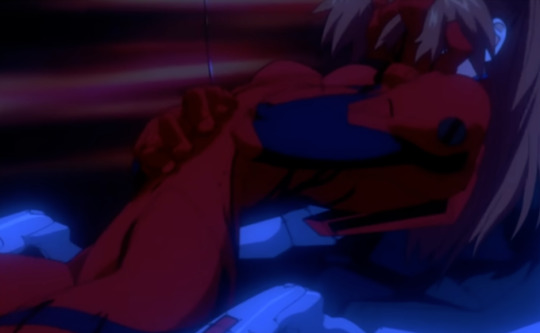
Asuka took a chance.
She opened her heart...
...and she got hurt all because she opened herself.
XVI. Unit 01+MPE Gorging Sequences
The brutality of both Unit-01 and the Mass Production Evas holds three layers: of visual horror, implied horror, and thematic horror. Unit-01, after taking Zeruel’s s2 engine into herself, proceeds to then brutalize the 14th angel by way of still gorging on it. The feeding was entirely recreational considering Evangelions don’t subsist on food to function. This was more about the sheer act of brutality for brutality’ sake.
The Mass Production Evas also fall under this category, the way in which they deal with Asuka after incapacitating her with a replicated Lance of Longinus is also sadistic and gratuitous. They also proceed to gorge on Asuka, her fate made worse through the simple fact that her sync rate is heightened.

The MPEs don’t even swiftly finish her off. She is in a state of tremendous and unimaginable pain. They fly above her slowly, circling above her mangled Eva.
They are almost mocking her as she can do nothing, save for writhe. Asuka’s seething, repeated “I’ll kill you...I’ll kill you….” is then silenced by the MPEs spearing her down.
The brutality doesn’t end there, as we see much darker implications of the damage sustained toward the end of the first half of End of Evangelion.
Shinji bears witness to the implications after seeing the decimated remains of Unit-02 being carried off by some of the Mass Production Units. The sickening reality of it all dawns on him and he is once more exposed to the woes of war and the nightmarish aspect tied of the Evangelions.
XVII. Ancient Ruins of Arqa
We’re ending the pre-abyssal end of the iceberg with Evangelion’s original proposal.
Eva’s proposal, a far cry to the show today, had a more sci-fi angle to it. Psychological concepts weren’t exactly pitched nor was it self-aware. The angels weren’t even referred to as the angels, but as the Apostolos. Instead of the 18 we were presented with in the original show and the movies, there were 28 Apostolos.
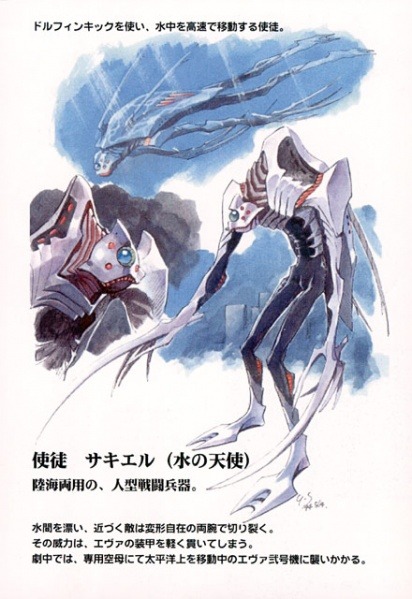
The Apostolos designs stand as testament to how far of a departure the proposal was to the final cut. They look far more menacing than the more amorphous, much softer defined, beady-eyed angels we’re used to. To top it all off, the Apostolos were the de facto villains of Evangelion’s prototype pitch. The Apostolos in the Proposal, toward the end, proceed their onslaught as a group rather than the series’ one by one. Toward the series’ end, the 12 strongest Apostolos begin their assault on North America, annihilating the continent in its entirety.
Only 12 of the creatures laid waste to a singular continent.
Episode 24: "Now, the Promised Time"
Rei breaks down. Her secrets are revealed. At last awakened, the twelve strongest Apostolos descend from the Moon. Both Eva Unit-06 and the American continent vanish completely. Humans acknowledge their helplessness in the face of the Apostolos' crushing power. The promised time, when people will return to nothing, approaches. A human drama in the depths of despair.
Episode 25: "Arqa, the Promised Land"
The laboratory holds the ancient ruins of Arqa, which have become key. In order to stop the twelve Apostolos, the United Nations' head members annul the Human Instrumentality Project and resolve to destroy the Apostolos. Shinji's father objects. Shinji and the others stay at the laboratory for Rei. A drama of people conflicting over incongruous objectives.
https://wiki.evageeks.org/Resources:Neon_Genesis_Evangelion_Proposal_(Translation)
The aforesaid creatures were so powerful in the original pitch that Human Instrumentality and the ancient ruins of Arqa would be the way of stopping the onslaught.
Tier 5: The Abyss

XVIII. Split Second Misato Death
XIX. Humans Are The Villains in Eva
XX. The Ultimate Paradox
XVIII. Split Second Misato Death
As the last and most explicit aspect of original Evangelion, it would only make sense that EoE specific content would take its place in Tier 5. End of Evangelion is a 90 + minute tour de force with disturbing imagery back-to-back. Split Second Misato Death refers to one of the most unsettling images sprinkled all throughout the movie. Here are a few of the many examples of EoE’s building up on Evangelion’s ugliest parts.
Everyone cites the infamous hospital scene not even 5 minutes into the film as the first proof, but user power-chords has pointed out, Shinji has actually attempted suicide (refer to the ‘Free Will v. Determinism’ part of the iceberg.)
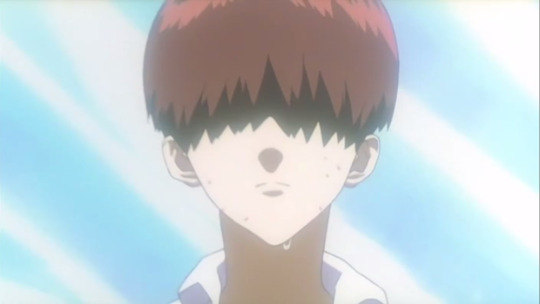
After Misato is mortally wounded and sends Shinji off in an elevator not long after, the JSSDF blow up that part of NERV. A few people have pointed out the most disturbing facet of this scene: through freeze-framing that you can actually see Misato’s body during.
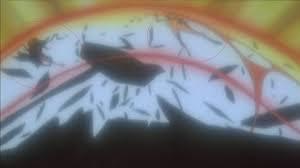
The JSSDF scene partway through End of Evangelion in which NERV personnel are summarily annihilated.
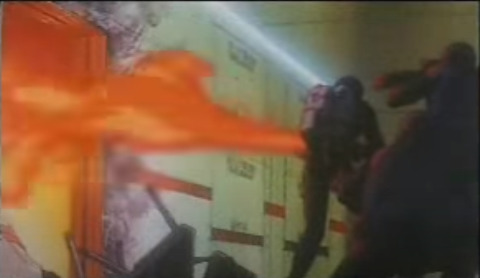
For those missing the small detail of Shinji’s attempted suicide ,Shinji’s depressed state is made more clear when the JSSDF locate him. When they do they attempt to kill him execution style. Shinji doesn’t move.
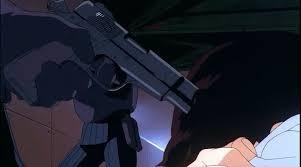
“I don’t want to die…!” during the JSSDF’s assault, Asuka is awoken from comatose state. She is protected by her mother via an AT-Field by Unit-02. She gains back her self-preservation after this realization, and multitude of images play. One of them is an extremely gruesome close-up of Asuka’s face. (extreme body horror warning, proceed with caution)
The Komm Susser Tod scene beginning with Shinji strangling Asuka in harsh coloring, Naoko’s same action toward Rei plays right after. A few disturbing child drawings follow after, predominantly featuring death. (seizure warning, body horror warning)
End of Evangelion’s flooring nature comes from the fact that it builds up on the subtly horrific and makes these terrors explicit. Whatever existed beyond closed doors becomes now available for us to see,
XVIII. Humans Are The Villains in Eva
At the penultimate point of the abyss lies a horror as old as much of time. Of the humane being more disgusting than the monsters.
That we can be monstrous.
This fact becomes known with the appearance of the JSSDF as dispatched by SEELE, methodically mowing down NERV personnel with little to no weaponry of their own. We’re treated to NERV’s personnel in their hallways, some forced with the moral dilemma of leaving their own to die while surviving or helping their own while both end up being gunned down.
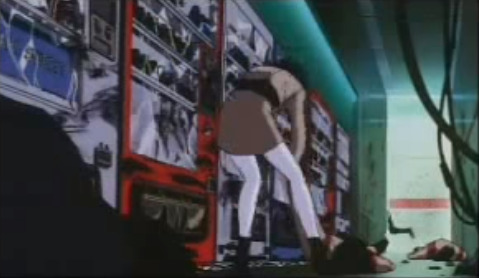
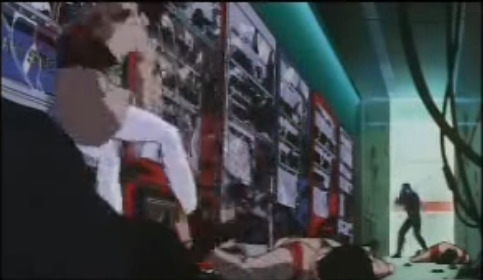
It becomes apparent that SEELE has been gradually, intentionally chipping away at NERV’s Defense Budget, getting rid of the (little) competition they have after the defeat of the Last Messenger.
There’s a degree of contempt and casual sadism that comes with how they kill the personnel. In one instance, a NERV worker surrenders to the JSSDF, before being killed off in execution style in the distance (one headshot plus two extra shots for good measure).
When you look back at it, this sort of sheer, unabashed brutality wasn’t felt about the angels. Human attitude about the angels is largely fearing, anxious. This attitude accentuated itself through a sometimes nervous soundscape. Of observing these weird, ghastly creatures as they creep and swim. And the feeling’s mutual. The problem is that we don’t know.
But here? We do know.
When the JSSDF move in, the anxiety of angels graduates to the full-force dread of creatures that have killed before. The greatest enemy to humanity has always been with them all along, forcing them to a catch-22. The dread falls on Maya because she understands this perfectly. NERV has only ever shot at targets rather than living flesh…
...and SEELE knows this.
SEELE’s slow, but sure suppression of NERV’s budget is kicking a man while he’s down, but the man in question is a child instead. The JSSDF have more than enough firepower, calling it overkill goes beyond an understatement.
The JSSDF demonstrate the lack of remorse further with the discovery of Third Child, Shinji Ikari. One of the members presses the barrel to Shinji’s head before Misato steps in and kills the members.
The JSSDF isn’t the only damning evidence of how ugly members of humanity can be, however.
Humanity’s on-occasion grossness shows itself in small ways throughout the series, in dislike and conscious emotional distance for individuals, or beliefs of the angels being unintelligent and/or savage. Other times it manifests fiscally, in orchestrating more ethical approaches to stopping certain destruction to go seemingly haywire in order for NERV to receive more funding. This all due to a rival company of NERV challenging the very idea for its usage of child soldiers.

The worst of this damning fact is that many of the morally repugnant members exist on a higher echelon of society. There are Gendos running around, doing as they so please and they’re the tip of their echelon iceberg.
XIX. The Ultimate Paradox of Evangelion
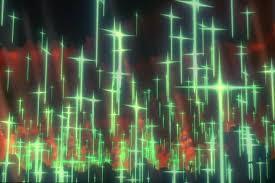
“Anywhere can be paradise as long as you have the will to live.”
We’re treated to these words as Shinji finds himself on shores surrounded by an isolate hellscape, with Asuka next to him. The strange and altogether horrific nature of End of Evangelion has gotten fans believing on End of Evangelion’s endgame was in certain, nihilistic. But Eva dipping its hand in the likelihood of meaning in the existentially meaningless isn’t even the ultimate terror of Eva’s self-aware universe, nor is it the tendency for man to become contemptible towards itself.
Evangelion greatest terror is the paradoxical nature of free will.
Yui’s words to her son as she drifts off into the ever-expanding cosmos, her status as a deity realized, is that paradise is universal. EoE assumes this unconventionally positive approach to a whole series worth of characters’ woes. The issue is: finding paradise is ultimately conditional.
Free Will’s paradoxical nature is what gives credence to the ongoing Free Will vs. Determinism dilemma. People can use their free will to take away yours entirely and this is most evident with Rei. Her existence is the result of a man’s unhealthy attachment to his wife, her lack of self-preservation the result of being conditioned as a multi-purpose vessel; her desire to merge with Lilith to become an omnipresent mother-figure was not hers. The nature of disallowing free will exists on a spectrum, as people can use their free will not to take away the whole of others’ freedoms, but to disallow them proper emotional growth. The adults around Asuka weren’t around for her during the series, leading to her eventual downfall.
Unit-01, throughout much of the second part of EoE holds the power to give or deny people’s physicality due to her status of having both Fruits of Life (the s2 engine held by angels) and Wisdom (from the Lance of Longinus merged with the Eva earlier on). This gives Unit-01 her deity status and while within Lilith-Rei, Shinji realizes that not everyone would be there in his life, that he can’t be in the center of others’ lives. It’s for that reason why he denies people’s physicality (“They can all just die.”), which turns people into LCL.
Shinji gives allows people the ability to come back from Instrumentality after realization arises that without other people, there’s no way to tell if Shinji, himself exists or not. Kaworu and Rei also give him the reality that with people back, pain will become an inevitability once more. With all the souls gathered by Lilith-Rei, they are released after her death.
With the souls of those cast into Instrumentality dispersed, those turned into LCL now hold the ability to come back from Instrumentality if they so choose.
While the idea of anywhere being paradise rings true, it’s not entirely satisfying to say that EoE is unconventional in its uplifting message to the viewer. Evangelion is at its core a cautionary tale. It warns the viewer into extensions of empathy and openness that others would properly live. This goes double for those with power. Without that compassion, we’ll have Asukas, Misatos, Ristukos, as well as Reis, those in the world whose downfalls come from emotional absences, neglect, objectification, and forced baggage. We would have Shinjis, those wanting to be at the nexus of others’ importance because they were deprived while young.
Kindness is a powerful thing and the lack of compassion present in all of Eva implicates most everyone. It leads to yet more abusive cycles, with the only thing breaking that cycle being a hand for those in need.
XX. Conclusion
What more can be said over this juggernaut which is a host to a bevvy of darkness? Evangelion is testament that anxieties and horror don’t need to start out as blatantly shocking or visceral to make an impact years down the line. They also don’t need to be out in the open to initially hook you either. You pick up on a few anxieties as well as horrors and you realize deep down, there must be more, which drives many of us to engage in this often times unabashedly dark source material.
Some of us are doing it later in the throes of adolescences, others are doing so well into their 20s, possibly dipping into their 30s. Point is, it draws in a lot of us and for a lot of us, it doesn’t ever let go.
Some of its charm could be chalked to the visceral ways in which characters interact. Even after years of re-watches, I’m still learning new things about the child soldiers, and I’m quite sure there’s others finding small details. There’s also the possibility of Eva’s approach to terror. I think Evangelion “humanized” its horror. It didn’t make horror a universally human feeling, but made it so that the true big bads looking to cause apocalypse weren’t actually the eldritch. Many of the angels are more or less lost kids looking for their mother (I still think Ramiel’s “singing” in episode 5 was it calling for its mother!).
With those newer details after 20+ years, there will be more added to the iceberg. Hell, there should be more added to the iceberg. This iceberg is the tip of an even greater iceberg. I’m still learning about their adults and their desires as well, how cyclical their actions are. For others, the draw-in factor lies in its low budget. Personally, it’s all of these for me: the low budget helped cement these darker aspects of the series due to horror and the genre’s overall relationship with limitation. It works best on limitation and had Eva worked with a much higher budget, I don’t think the content would be as effective, or perhaps it’d be much more difficult to make it so.
Evangelion is such a well-done, deceptively compact series that each lens a fan assumes has its own interesting rabbit hole. Your circumstance shapes the experience, and this too involves how you navigate the series’ menagerie of terrors.
I’d also like to thank the reader for getting through the largest rabbit hole in Evangelion. I’d also like to thank you for getting through the whole of this meta from a fan who slowly began to resonate with the characters as the years went on!
#neon genesis evangelion#shinji#kaworu#asuka#rei#seizure warning#body horror warning#suicide mention#correct me if im wrong#credit goes to twitter user decoratedboar for the iceberg picture help#and fixes
3K notes
·
View notes
Text
How A Demon Commissions An Angel ~ A Daminette FanFic ~ Chapter 9: An Opening For Options
T.G.Y.T.T.B.: Sent you an email for Jason’s jacket. Had an idea I think you might like.
Mr. Postscript: I see popular culture references strike again.
T.G.Y.T.T.B.: Is that a problem?
T.G.Y.T.T.B.: Cause I’m not even sure “Hit me with your best shot” would be considered a pop culture reference. I mean isn’t that song from like the 80’s?
Mr. Postscript: 1979 but I think it has less to do with when the source material was released and more with how often the reference is used in modern times, which in this case would be much too frequently.
T.G.Y.T.T.B.: Did google help you come to that conclusion?
Mr. Postscript: …
Mr. Postscript: All online research must begin with the use of a search engine.
Mr. Postscript: At least I don’t use Wikipedia as a resource.
T.G.Y.T.T.B.: Everyone uses Wikipedia.
Mr. Postscript: Clearly not everyone.
Mr. Postscript: …
Mr. Postscript: Do you?
T.G.Y.T.T.B.: Of course! I even donate to them every now and then!
Mr. Postscript: I see.
Mr. Postscript: I’m beginning to reconsider our friendship.
Mr. Postscript: I just don’t know if I can forgive this egregious offense.
T.G.Y.T.T.B.: Really, Mr. Drama Queen? My friends and their interrogations won’t scare you off but my support of the largest archive of free information will?
Mr. Postscript: Your friends were perfectly in their rights to see if I was worthy of your friendship.
Mr. Postscript: I believe I passed the test.
T.G.Y.T.T.B.: You were great Damian! Honestly, thank you for putting up with them. Maybe you’re not as bad with people as you think.
Mr. Postscript: Yes, well it does help if they are more than three thousand miles away.
Mr. Postscript: There’s also the fact that I’ve admired Ms. Tsurgi’s fencing style for a while now which may have something to do with it. I’ve been following her career for years.
T.G.Y.T.T.B.: …
T.G.Y.T.T.B.: Damian, how do you know who she is? We never told you her last name.
Mr. Postscript: Right…
Mr. Postscript: It may have come up in my initial search for your identity.
Mr. Postscript: I don’t imagine there are many girls your age named Kagami who know how to fence, live in Paris, and have close ties to your class.
T.G.Y.T.T.B.: Okay, that explains that.
T.G.Y.T.T.B.: I mean it’s still pretty creepy mind you but I went into this friendship knowing how it started.
T.G.Y.T.T.B.: I guess it’s just weird to think that you know so much about me and I still know so little about you, not even your last name.
Mr. Postscript: You know more about me than anyone besides my family, angel. I wouldn’t want you knowing my last name to make you think differently.
T.G.Y.T.T.B.: Because you’re famous?
Mr. Postscript: In a way, yes.
Mr. Postscript: You could probably find out who I was if you wanted, you have enough information to work with but I wish you wouldn’t.
Mr. Postscript: I don’t think you’d like what you’d find.
T.G.Y.T.T.B.: Trust me, I know better than anyone that people sometimes only see what they want to. A little bad publicity won’t make me think differently of you.
T.G.Y.T.T.B.: Besides, I already told your brother, Damian. You get to decide what you tell me and when.
Mr. Postscript: I should’ve given you the same choice. If I’d known the kind of person you were beforehand, I would’ve.
T.G.Y.T.T.B.: That’s the thing, you can’t know who people are before you get to know them.
T.G.Y.T.T.B.: You have to give people a chance, Dami.
Mr. Postscript: What if they end up being like Ms. Rossi?
T.G.Y.T.T.B.: If we constantly think the worst of people, we’ll end up like Lila, calculating and manipulative.
Mr. Postscript: I suppose I see why you might think that.
Mr. Postscript: You know…
Mr. Postscript: If my family ever finds out how we met, I’d hate to have to deal with their disappointment. I think Todd already wants to adopt you.
Mr. Postscript: Be on alert for another phone theft.
T.G.Y.T.T.B.: Well, they may never know. After all, they’ll get these amazing gifts for Christmas that will obviously show a lot of thought and consideration.
T.G.Y.T.T.B.: They’ll never suspect we had a rocky start.
T.G.Y.T.T.B.: But back to the subject of amazing gifts, do you like the wording? Is it not his style?
Mr. Postscript: Oh, Todd will love having that across his back.
Mr. Postscript: I just have a question about the “o” in shot. It’s supposed to be a target right?
T.G.Y.T.T.B.: Yes! Well sorta?
T.G.Y.T.T.B.: I want to make it look like a poker chip with a target on it.
Mr. Postscript: Oh. I can see that. Why a poker chip? I don’t recall it coming up in our earlier discussion.
T.G.Y.T.T.B.: I mean it did in a way.
Mr. Postscript: Oh? How so?
T.G.Y.T.T.B.: The poker chip would be stitched on the back of his right shoulder meaning he’d have a chip on his shoulder.
Mr. Postscript: …
Mr. Postscript: I approve the design. The double meaning in your designs will be incredibly entertaining for me every time I see my brothers wearing them.
T.G.Y.T.T.B.: Well, like I said. Subtle details are my specialty. But I don’t recall any double meaning in Grayson’s design.
Mr. Postscript: Right.
Mr. Postscript: I stand corrected. I simply meant there are a lot of subtle details.
T.G.Y.T.T.B.: Okay! That reminds me! I’ve started Grayson’s sweater.
T.G.Y.T.T.B.: Just sent a progress update to your email.
Mr. Postscript: It’s looking exactly like your drawing. I approve the choice of yarn; the colors are appropriately vibrant.
T.G.Y.T.T.B.: Great!
T.G.Y.T.T.B.: So what were you thinking for Drake’s sweater?
T.G.Y.T.T.B.: I think I remember you mentioned a drawstring hood.
Mr. Postscript: I did, yes. However, I’ve been rethinking that idea.
Mr. Postscript: I can picture my family accusing me of trying to suffocate Drake.
T.G.Y.T.T.B.: …
T.G.Y.T.T.B.: Well, we wouldn’t want that!
T.G.Y.T.T.B.: You know maybe the “hit me with your best shot” thing wasn’t the best idea either.
Mr. Postscript: It’s not that concerning with Todd. I’m sure he’ll just love that across his back. Drake and I have a more complicated history.
T.G.Y.T.T.B.: Didn’t you say your inside jokes with Jason were your attempts on each other’s lives?
Mr. Postscript: Yes but it’s Jason. He antagonizes everyone.
T.G.Y.T.T.B.: Got it. But Drake’s different?
Mr. Postscript: Yes. Everyone loves Drake. Well, except for Todd but we’ve established that Todd hates everyone.
T.G.Y.T.T.B.: So why are things complicated between you too?
Mr. Postscript: Correction: Two
T.G.Y.T.T.B.: …
T.G.Y.T.T.B.: You know what? Okay. I stand corrected. Question still applies.
Mr. Postscript: I may have treated him poorly when I first joined the family. He was the most recent addition to my father’s collection of orphan children and I may have tried to claim his place in the family by forcibly removing him from it.
T.G.Y.T.T.B.: I see. So you felt threatened by his presence and handled it poorly?
Mr. Postscript: I would say that is a drastic yet not wholly inaccurate interpretation.
Mr. Postscript: However, I’ve since realized that my initial concerns were unnecessary. Drake is a threat to no one but himself.
T.G.Y.T.T.B.: But your family still holds it against you? They still think you might actually hurt him?
Mr. Postscript: Well, I was a bit extreme and while I no longer harbor the same intentions, no one could accuse us of being particularly warm.
T.G.Y.T.T.B.: I see.
T.G.Y.T.T.B.: Have you tried apologizing?
Mr. Postscript: You mean sincerely and not because father ordered me to?
T.G.Y.T.T.B.: Yes.
Mr. Postscript: Then no.
Mr. Postscript: However, before you begin what would surely be a fruitless campaign to get me to change that…
Mr. Postscript: Might I remind you my family isn’t big on addressing our feelings? I believe Todd’s tried to hurt Drake before too and I highly doubt he ever issued an apology yet they seem to be on good terms again.
T.G.Y.T.T.B.: Right.
T.G.Y.T.T.B.: Well, as your resident people skills instructor, I think I’m supposed to give you some kind of advice like two wrongs not making a right but frankly I’ve begun to realize that is utter bullshit, pardon my english. So I can understand why an apology would not be on the table.
Mr. Postscript: I’ve never understood that saying and I’m glad that I will not have to hear it from you.
Mr. Postscript: Do not mistake me, I understand the sentiment in a way however, I’ve always felt it to be too general and way too easy to use in a non-applicable, negative context.
T.G.Y.T.T.B.: Good to know where on the same page there.
T.G.Y.T.T.B.: Damian, I don’t mean to pry but can I ask you a question?
Mr. Postscript: You may ask and I may answer.
T.G.Y.T.T.B.: Do you feel like your family holds you to a higher standard?
Mr. Postscript: …
Mr. Postscript: I don’t know if I’d call it a higher standard.
Mr. Postscript: …
Mr. Postscript: I simply have more to catch up on. I started with less knowledge of some basic things than the rest of my brothers. However, I wouldn’t say I’m treated differently in any case. You should see Todd and father argue sometime.
Mr. Postscript: I just hate feeling behind. I’m used to being the best, the favorite like I was when I lived with my mother. So failing like I have recently has been frustrating, especially with what’s now on the line.
T.G.Y.T.T.B.: You mean the threat of moving?
Mr. Postscript: I wouldn’t call it a threat. I actually feel like I should mention that the place he wants to send me to is actually somewhere all my brothers have attended so it’s not like I’d be the first to go there in any case.
T.G.Y.T.T.B.: Oh, so it’s like a family tradition?
Mr. Postscript: I suppose you could say that.
T.G.Y.T.T.B.: So would going really be that bad?
Mr. Postscript: Honestly?
Mr. Postscript: In theory, it wouldn’t be the end of the world or anything. In actuality? I can’t imagine it would be pleasant.
T.G.Y.T.T.B.: Okay. If there’s one thing that makes you not want to go, what would it be?
Mr. Postscript: Is it not self-explanatory? Why would I want to start over again and lose all I’ve earned since coming here? I spent ten years of my life without my family, is it a crime to not want to waste any more?
T.G.Y.T.T.B.: Okay, I would say that does sound rather awful to put it lightly but would it really be like that? I mean it’s not like you’re going off to war or anything, right? You’d still talk regularly and video chat and stuff?
Mr. Postscript: I’m sure we would, angel, but they’d still be here, all together and I’d be miles away, with only people I’d have no clue how to interact with for company.
T.G.Y.T.T.B.: Right.
T.G.Y.T.T.B.: Are you worried about feeling like an outsider again?
Mr. Postscript: No.
Mr. Postscript: Not quite…
Mr. Postscript: I’m more worried about feeling like a failure. Nothing is more shameful than being a disappointment. Especially when I have three brothers who aren’t even related to contend with that seem to be doing him proud.
Mr. Postscript: Except for Todd but he’s turned disappointing father into its own type of game and at which he’s winning.
T.G.Y.T.T.B.: Aren’t your brothers older than you? And haven’t they been with your dad longer? Surely it doesn’t make sense to compare yourself to them?
Mr. Postscript: Please!
Mr. Postscript: When Drake was my age, father was already training him to take over the family business.
T.G.Y.T.T.B.: Damian, in any case it’s not a competition, right? You’re not competing with them for your father’s regard.
Mr. Postscript: Maybe that’s so. I still feel like I’m losing and I hate that.
T.G.Y.T.T.B.: Yeah, I imagine you would.
Mr. Postscript: How helpful.
T.G.Y.T.T.B.: I mean, you’re always allowed to feel how you do.
Mr. Postscript: Thank you for the permission. I do so appreciate it.
T.G.Y.T.T.B.: Okay, Mr. Sarcasm, do you really want to know what I think?
Mr. Postscript: …
Mr. Postscript: Go on.
T.G.Y.T.T.B.: Okay, you might not want to hear this and of course this is just my opinion but it seems to me like you have really high expectations to meet, maybe they’re other people’s or maybe their your own. Whether or not you actually have to contend with your brother’s achievements, you obviously feel like you do and I can see how that would be hard to turn off. So maybe some distance from the situation would be a good thing?
T.G.Y.T.T.B.: I know that having to meet new people especially when socializing isn’t your strong suit sounds daunting but I kinda feel like you’re selling yourself short. Sure, you’ve had trouble in the past but you’ve made progress right? Moving to a new place doesn’t erase any of that. I get that the first time you had to start over was hard but now you’re older and wiser and have family to support you and a wonderful friend/moral compass to help you (aka me). Plus, I don’t know, it just feels like you’re really focused on doing what you think people expect of you and not what you really want for yourself. I don’t know, maybe some time away from expectations and legacies might give you some perspective.
Mr. Postscript: …
T.G.Y.T.T.B.: …
Mr. Postscript: Withdrawing now, giving up and moving on, wouldn’t that be like quitting? Is quitting not another form of losing?
T.G.Y.T.T.B.: If you’re looking at it like that, I’d ask yourself this: Is winning worth it if you hate the game you’re playing?
Mr. Postscript: …
T.G.Y.T.T.B.: …
T.G.Y.T.T.B.: So, totally overstepped there, didn’t I? Sorry!
Mr. Postscript: No need to apologize.
Mr. Postscript: I’m just not sure how I feel right now.
T.G.Y.T.T.B.: That’s okay! I’m not trying to force you to make any big decisions right now or anything. If you just want some time to think, that’s cool. Whatever you end up doing, you deserve to have a choice in it so let’s come up with something for Drake’s sweater so your dad doesn’t force your hand okay?
Mr. Postscript: Okay.
Mr. Postscript: Marinette?
T.G.Y.T.T.B.: Yes?
Mr. Postscript: Thank you.
Mr. Postscript: Everything you’ve done and said so far has shown a level of care for me I’ve done nothing to deserve and I know you’re always just trying to help me and I'm very grateful. I just want you to know I will do my best to be as good a friend to you too.
T.G.Y.T.T.B.: I know, Damian. You may have your faults (we all do) but loyalty is not one of them.
T.G.Y.T.T.B.: For whatever it’s worth, I think your family also wants what’s best for you like I do. It just has to be up to you to decide what that is.
Mr. Postscript: Right.
Mr. Postscript: Well for starters, I think it would be best for me to avoid being accused of attempting to suffocate Drake.
T.G.Y.T.T.B.: Yeah, I agree.
T.G.Y.T.T.B.: So would you want just a regular sweater for him then? Or I could make a drawstring hood that doesn’t close completely? I could make it so there’s always a gap left to breathe through.
Mr. Postscript: I like that last idea best.
Mr. Postscript: My original vision was that Drake could easily shut out the world and fall asleep in it so we don’t have to deal with his insomniac coffee zombie antics all the time.
T.G.Y.T.T.B.: I want my business card to have “insomniac coffee zombie” on it.
Mr. Postscript: I highly doubt you’d get a lot of business that way. It’s a poor marketing strategy. It comes off as unprofessional.
T.G.Y.T.T.B.: Please, my clients are normally the reason I pull all nighters. I would give it credit for illustrating my dedication to my craft.
Mr. Postscript: Don’t get me started on Drake’s work ethic.
Mr. Postscript: The thought that you and Drake might actually have a lot in common is quite unsettling.
T.G.Y.T.T.B.: Really, anything else we share besides a coffee addiction and ambition?
Mr. Postscript: Well, you both are child prodigies in a way. For all our differences, I can’t deny Drake has done much for father’s company at a young age and you have created a whole brand for yourself at only sixteen.
Mr. Postscript: I’d never thought about the logistics of balancing schoolwork and commissions. Is it difficult?
T.G.Y.T.T.B.: I mean, yes and no. There have been times when I stretched myself too thin and paid the price in sleepless nights. But that’s the perks on being your own boss I guess. I just learned to pace the commissions and be selective with my clientele. It’s worked pretty good so far.
Mr. Postscript: That’s a relief to hear. However I hope my order didn’t come in a bad time. Did you already have a lot on your plate?
T.G.Y.T.T.B.: Nah, I usually keep the holiday season light so I have time to make Christmas gifts. Although, I suppose that’s not as much of a concern this year.
Mr. Postscript: Oh?
T.G.Y.T.T.B.: Quite a few classmates have been crossed from the Christmas list this year.
Mr. Postscript: I see.
Mr. Postscript: I don’t know whether I feel happy or upset for you.
T.G.Y.T.T.B.: Ha! Me neither.
Mr. Postscript: I suppose it is both then. I am happy that you are standing up for yourself but upset that they have forced you to.
T.G.Y.T.T.B.: Thanks Damian. I can’t help but feel a bit like I’m being petty.
Mr. Postscript: Petty is a word people use when they hold you to a higher standard than themselves.
T.G.Y.T.T.B.: Now I want to put that on a t-shirt!
Mr. Postscript: Hm. I would order one.
T.G.Y.T.T.B.: Really? You’d match shirts with me?
Mr. Postscript: Well, no. I wouldn’t wear it around you per se, I don’t think I’d pull it off as well. However, I’d happily parade it in front of my brothers.
T.G.Y.T.T.B.: You know what I’ll take it.
T.G.Y.T.T.B.: Shelving that design for now, let’s get back to Drake’s sweater. So I got a general sense of his taste from the pictures you sent me although I already see I’ll have to take some liberties when it comes to fabric because these pieces don’t look like they were made particularly for comfort and that’s a priority here right?
Mr. Postscript: Yes. I trust your judgement when it comes to fabric.
T.G.Y.T.T.B.: Great! All that’s left is the design and for once I actually have an idea right off the back.
Mr. Postscript: Is that so? Consider me impressed.
T.G.Y.T.T.B.: Well, it all hinges on Drake being as big of a coffee lover as you make him out to be.
Mr. Postscript: Trust me angel, coffee addict is literally Drake’s personality. I don’t know how that’s possible but he managed it.
T.G.Y.T.T.B.: Okay. It’s time then.
T.G.Y.T.T.B.: I’ve had this idea in the back of my mind for a while now and I’ve never taken the time to fully develop it but if I pull it off it may well be the greatest piece I ever produce.
Mr. Postscript: And of course, it goes to Drake. He’ll never let that go.
T.G.Y.T.T.B.: I’d hope not. He should feel honored to be the recipient. T.G.Y.T.T.B.: However, I’ll need two things from you to make this work.
Mr. Postscript: Well?
T.G.Y.T.T.B.: I’ll need you to take a picture of your brother’s coffee, after he’s poured and added whatever he adds (although if he’s truly a coffee addict that won’t be much).
T.G.Y.T.T.B.: It is CRUCIAL that you make sure to show me the exact shade he drinks, understand?
Mr. Postscript: Now you’re even starting to sound like him when he’s in a coffee-crazed state.
T.G.Y.T.T.B.: Do. You. Understand?
Mr. Postscript: Yes. I can do that. What else?
T.G.Y.T.T.B.: Right, I’m gonna need you to trust me on this, okay? The design is going to be so much more than meets the eye so I’m not going to show you any drawing or photos before you get it in the mail, okay? T.G.Y.T.T.B.: I know that’s kind of a lot to ask but I think you’ll understand why in the end.
Mr. Postscript: …
Mr. Postscript: I’m not going to pretend any of this isn’t ridiculously strange but since you obviously know what you’re doing and Drake actually loves a good mystery, I’ll allow it. Use your idea.
T.G.Y.T.T.B.: Yay! You won’t regret it!
Mr. Postscript: So is that all you need?
T.G.Y.T.T.B.: Yup, Grayson’s sweater is already started, I’ll go shopping for the materials for Jason’s jacket tomorrow, and Drake’s can be started as soon as I get that picture of the coffee.
Mr. Postscript: That won’t take long. I should have it to you by tomorrow at the latest.
T.G.Y.T.T.B.: Great!
T.G.Y.T.T.B.: Um, Damian. I really have to go. There’s an akuma.
Mr. Postscript: Yes. I got an alert. I signed up for them when you mentioned the situation. Is it close?
T.G.Y.T.T.B.: it will be ill text you tomorrow okay?
Mr. Postscript: Yes. Be safe.
T.G.Y.T.T.B.: thx bye1
From:[email protected]
Date:November 10, 2021 7:00 P.M.
Subject: (No Subject)
Postscript: I would like you to know that I found your use of the phrase “Pardon my English” after swearing to be the pinnacle of comedy and would like to request permission to use this myself someday?
- Damian
From:[email protected]
Date:November 11, 2021 7:30 A.M.
Subject: RE: (No Subject)
P.S. Permission granted. :)
- Marinette
Hello Tumblr! It’s been a while, sorry for that. Life has been a rollercoaster these last few weeks and unfortunately not the kind that only goes up my friends. On to better news however, this chapter being posted means Tumblr is finally caught up to where the story is at on AO3. Even better, chapter ten is mostly finished. Everything is written and now I just have to go over and edit it one last time. I do plan on posting it today which feels so weird to say because writing this chapter was so different than my usual experience. It totally breaks my usual chapter structure and I feel like I wrote it at a snail’s pace. Here’s hoping it will have been worth the wait! I’ll see you again soon but as always AO3 will be updated first! <3
Master List
137 notes
·
View notes
Text
Theatre Techniques
#1 Post - Acting Tips through Meisner’s technique
After being self-isolated for so long, you’ve finished watching all of the Netflix shows and cook every possible dish in your fridge, now what?
Well, maybe it’s time to touch upon acting through Meisner’s techniques at home.
Sandy Meisner is a well-known actor based in New York. He was one of the curious actors along with Stella Adler that adopted Stanislavski’s technique (also known as Method Acting) til he felt the need to develop his own acting form, which is known as Meisner Technique that conveys naturalism and playing with the tension between acting partners.
Using these techniques, it will help you become a better actor by embracing yourself to be in the moment with your scene partners. You may have to create a zoom meeting with your scene partner for one of the exercises, but what could be a better way to make a reason to meet people again than to rehearse on your own!
The Meisner technique has three main components that all work hand in hand:
Emotional preparation
Whilst reading the line, learn to delve into a given circumstance that will generate real emotions. Be in the character’s shoes and think how would you react when the situation happened.
Repetition
By repeating your lines, it can make you rely on their organic instincts.
Improvisation
As you are getting used to the flow of the lines, it will encourage spontaneity and reduce an actor’s self-consciousness.
1st Exercises:
Actor 1: Your hair is long.
Actor 2: My hair is long.
Actor 1: Your hair is long.
Actor 2: My hair is long.
A: (Noticing B scratched their arm) You scratched your arm.
B: I scratched my arm.
From this exercise, it removes the over-thinking part of acting that after even a short period of time, one realises the ‘text’ becomes essentially irrelevant, and it is the subtext and relationship that really matter. It lets you be more observant of your acting partner and being able to be more perceptive in the body language of each other.
2nd Exercise:
When reading the lines, recall a memory where you were in that circumstance and apply that emotion to the scene.
If it’s not a circumstance you had any experience of, you can draw external sources of research, eg. asking friends or family, watching interviews, reading books, and people-watching, to gather a library of additional material to provide inspiration.
In conclusion, as you try out these exercises, you will feel differently when acting because you’ll be facing the “given circumstances” of the character with different points of view. It gets you to be more observant and analyse the tension between you and your partner to be inspired and provoke your acting decisions. Hence it will make you listen and react with clarity.
#2 Post - Acting Tips through Adler’s Acting Technique
With so many acting techniques nowadays, how will you be able to choose? It’s like contemplating which crisps do you want to eat, sometimes you feel like getting Tangy Cheese Doritos and sometimes you’re feeling for Flamin Hot Cheetos. The choices are endless, but don’t fret! In the end, it’s always good to give a try of each technique to see which suits your taste.
As we had previously touched on Meisner’s technique, today we’re going to go through Adler’s acting techniques that you can try out yourself! :)
Stella Adler is a daughter of two professional actors, hence debuted her acting career at the age of 4. She is regarded highly in the industry due to her professionalism and proficiency in her acting as she learned and earned through experience. After learning Stanislavski’s and Strasberg’s acting technique, she evolved her own acting technique that has more involvement in imagination.
Now, shall we delve into her techniques? whispers yes, we shall!
Here are the three main components of Adler’s techniques:
Analysing Text
She has a great emphasis on script analysis and respect for the playwright. When teaching, she, “gave young actors more responsibility by asking them to understand the play themselves rather than relying on a director to interpret it.” Actors must look into the script to analyse the character’s personality and lifestyle then align their actions with the character’s circumstances. When reading text, you need to ask yourself, “What is my character going through that would produce that experience?”
Cultivating Imagination
As an actor, there is a need for constant observation and curiosity when developing an actor’s imagination. Rather than drawing up your own personal experience, Adler implies to actors to use real observations to fuel their imagination and create in-depth characters.
Elevating Characters
Adler famously told her students, “Don’t be boring”. In context, there is the need to think seriously about human nature and communicate important ideas to let actors reflect something larger than life within the characters.
Since you got the idea of what she aims for actors to achieve, let’s look into exercises that can help cultivate your acting skills.
Exercise #1 - Imagination
Pick an object and describe it. You can talk about the texture, colour, shape, anything just to describe the object. It may be awkward at first, but once you practice on describing things, you will find yourself to be faster in developing your imagination. Then take this exercise to next level by letting your thoughts travel through your mind. For example, a red lamp can remind you of ruby earrings a woman wore at a party you went to which reminds you of the music that was playing and so on and so on.
Exercise #2 - Paraphrasing
Pick a book and write down one idea from the book in your own words, then present it onstage to others. This lets you understand the idea, then respond to it and make it your own until you feel a real need to communicate it.
Exercise #3 - Inner-Justification
Randomly pick a simple line from a play you don’t know and bring it to life by imagining in details the reason why you’re saying that line. Try to make a strong choice, something that stirs you and creates conflict. This exercise helps actors experience their lines instead of just saying them.
In conclusion, Adler constantly challenges her students to think imaginatively and her techniques require a lot of hard work and dedication. All of these techniques are easily done at home whenever you have time and keep yourself occupied when being in the same room starts to bore you.
#3 Post - Acting Tips through Chekhov’s Techniques
Now that you have Meisner’s and Adler’s acting technique in the bag, why not learn one more and get yourself well rounded with techniques! As Michael Chekhov said, “Don’t we have the freedom to make the most of the best in all techniques? There are no prohibitions against it. All it takes is a little wisdom, imagination, and courageous experimentation.” I think you guessed it, but we’re going to teach you some Chekhov’s Techniques that you can try out yourself! :)
Mikhail Alexandrovich Chekhov was a Russian-American actor, director, author, and theatre practitioner born in Saint Petersburg. He was a nephew of Anton Chekhov who collaborated with Konstantin Stanislavski to do production of his plays. He was called Stanislavski's brightest student and was invited to join the prestigious Moscow Art Theatre. It was until 1927, when he did a production of The Case, he was "denounced by Bolshevik officials as an 'idealist' and 'sick artist'", so he forced himself to leave Russia and the Moscow Art Theatre to dodge arrest. He then came to Hollywood, where he taught film stars including Ingrid Bergman, Clint Eastwood, Marilyn Monroe, and Gregory Peck.
The aim is to find truthful moments onstage in a “psycho-physical” approach that develops your imagination while establishing emotion in physical action. This technique relies upon drawing emotion from both the mind, and the body as it helps for actors who are beginners because “psycho-physical” focuses on connecting their body more when saying their lines.
When approaching a script, these are the following steps using the “psycho-physical” technique:
Step 1: Create a gesture in your mind.
Your body is considered as an instrument and trained your body like a musician, constantly learning to move and portray with virtuosity. As an example, let’s look at the line, “Please don’t go.” Think about how your body will react to the line.
Step 2: Begin to rehearse the gesture. Make it huge, full of energy, and abstract.
Now that you got the gesture in mind, this time you got to test it out and give your 100 percent! Also, there’s no one way of doing the gesture, so it’s good to explore your body to find the intention of the gesture. Always be mindful of the intention in the gesture, so that it lets your mind remember physically.
Step 3: Continue doing the gesture in a large, non-realistic way, while saying the line.
When doing naturalistic acting, it always limits you to how you should express yourself as a character, so it’s best to be exaggerated as much as possible.
Step 4: Begin to make the gesture more realistic, while saying the line. Keep the energy!
Now you can tone down the actions, but make sure to keep the same energy when doing it exaggeratedly because the gesture should represent this desire of the character’s intention.
This is not part of the step, but always make time to reflect your experience on what you had experiment and see if the gesture is working out or not. Chekhov always makes his students question whether the gesture is helpful or not. The purpose of this technique is to make a bridge between your body and mind requires a lot of practice, but it does portray your character in an organic sense because the gestures come in naturally once you understand the significance.
In conclusion, Chekhov repeatedly challenges his students to use their body to find the intention of the character and build a strong relationship with your imagination. Hopefully, this technique works for you and you don’t scare off your friends or family when rehearsing at home (I will not be responsible for the weird looks :)
4 notes
·
View notes
Text
Fic Analysis: Yellow Somethings
Yellow Somethings by @kidcarma
I’ve been in a creative rut lately, so one of the things I’m doing in the meantime is analyzing my favorite fics written by friends and/or acquaintences. This work was one of the first that came to mind, so it’s the first one I wrote an in-depth character analysis for.
Some people tell me I’m scarily good at psychoanalyzing both fictional characters and authors, so I’m harnessing that ability here in hopes it’ll give both you guys (and maybe also me) a greater appreciation for these well-written works.
So yeah, enjoy!
When I first read this work, one thing that immediately stood out to me was the dialogue. Good dialogue can stand on its own. If we cut out everything except the first exchange of dialogue between Hinata and Komaeda, the strength of this dialogue becomes evident.
“I hate you.”
“I can live with that.”
As any skilled writer knows, well-written first lines are crucial to the allure of a story. The first line must not only be an enticing hook, but an informative and non-expositional string of words that give the reader a strong sense of the work as a whole. It instantly sets the tone for a piece, allowing us to get a sense of where the characters are now, and what direction they’re going in.
The author’s choice to make the first line a piece of dialogue tells us they want to plunge us headfirst into the story. In fanfiction, which cannot exist without source material to draw from, it’s safe to assume one’s audience already knows a great deal about the canon lives and fates of the characters the story explores. It’s a nice shortcut that lets writers avoid having to excessively recap the events of the canon storyline, but the way this particular author makes use of this shortcut is significant. The intensity of the language they chose to use serves another purpose--to give the reader exactly what they promised the fic would contain in the summary, notes, and tags, and knock anyone who isn’t ready to read it off balance.
In less than a hundred words, Komaeda confronts Hinata with intensely negative feelings that most people wouldn’t hesitate to take at face value, and Hinata makes it clear that regardless of if Komaeda truly hates him, he has no intention of abandoning him.
‘Hate’ is a funny emotion; you can’t hate someone and be indifferent to them at the same time. To hate someone is to care about them, though even the mere suggestion that we care for the people we hate on some level is uncomfortable and counterintuitive. So yes, Komaeda’s telling the truth, he does hate Hinata. I don’t think he holds Hinata’s past against him; that would not only be unfair, but go against Komaeda’s efforts to promote and embody hope. Lingering on a past full of despair instead of looking towards the future does nothing to further the great cosmic goals of hope.
Komaeda wouldn’t hate Hinata over something so broad and vague; no, the reason Komaeda hates Hinata is simple: Hinata’s the only one who isn’t fazed by Komaeda’s delusions, and he refuses to give Komaeda the dignity of rotting away in peace.
In taking care of Komaeda, Hinata forces him to confront every last ounce of shame in his body, because somebody decided he was worth keeping alive, worth helping to heal and protect, when that goes against what he thinks with every fiber of his being. He has to sit helplessly and watch as Hinata emotionally strips him down and sees what he believes to be the ugliest parts of himself, the ones that he genuinely would rather die before willingly showing them to someone else, and being subjected to such humiliation at the hands of someone with good intentions is too much for him to bear.
The only remotely empowering emotion he can cling to at the moment is bitterness, which enables him to find little ways to resist Hinata’s attempts to nurse him back to health at every turn.
We see him try to reclaim some leverage in their power dynamic when he attempts to psychoanalyze Hinata and determine the reason he hasn’t given up on Komaeda yet through quips like “you do this because you feel bad” and “is it because the image of my dead body lives on in your mind.” Komaeda cannot allow Hinata to see him be vulnerable, because if he does, all the effort he put into building an impenetrable wall around his heart over the past fifteen or so years will have been for nothing.
This feature of the fic is only made more poignant by the fact that it’s written from Hinata’s perspective--we don’t see what Komaeda is thinking or feeling, only his words and actions. But we see Hinata’s, which brings me to another underlying message: sometimes love isn’t gentle. Sometimes love isn’t soft and sweet, or pretty. Hinata loves Komaeda, even if he himself doesn’t realize or understand it. Because if he didn’t, he wouldn’t bother. He would’ve simply walked out of Komaeda’s hospital room the first time he refused to take his medicine. And he didn’t do that. He would never do that, not to Komaeda.
Hinata’s love for Komaeda is reflected in the yellow flowers he leaves next to his hospital bed, and that is why we catch a glimpse of his frustration when Komaeda breaks it. But in a way, this is a good thing--as Hinata begins to open up about his emotions, the pair move further away from their cycle of codependency and towards something closer to a symbiotic relationship. Perhaps someday, instead of needing to need each other, they will be able to love each other with no strings attached.
This is what makes Komaeda’s decision to replace the flowers in Hinata’s vase much more significant than it appears on the surface--not only is it a gesture of goodwill and apology, but a sign that Komaeda is finally taking initiative in their relationship. No longer will Hinata have to carry both of their burdens; Komaeda is willing and able to reciprocate the love and effort Hinata has selflessly given him.
The fic ends on Hinata doing some much needed introspection, and eventually coming to the conclusion that he isn’t happy with the way his life has turned out. Because, despite everything he’s been through, all the knowledge, talent, and skill he’s gained, and the external validation he’s received from his friends, it’s not enough. What Hinata wants is a purpose beyond caring for Komaeda. One day Komaeda will be fully recovered and then Hinata will have no other meaningful task to do, and nothing to distract himself from his inner turmoil.
What Hinata needs is to see himself as inherently valuable, and he’s incapable of doing that until he learns to forgive himself. Right now, he’s not ready to accept his or Komaeda’s forgiveness yet, but deep down he knows that’s the only way to pull himself out of the pit of self-loathing he’s buried in.
Perhaps I’m reading too deeply into this clean, clear-cut fic, but I highly doubt the author went into this scenario with little to no knowledge of both Hinata and Komaeda’s mental predicaments. The underlying whispers of each character’s desire to love and be loved, to feel something--anything--when they’re too numb to care, is not a dynamic that an unskilled writer would be able to execute so gracefully.
At the very least, Carmen has quite the natural aptitude for extracting the real life emotions they and others around them experience, and at the most, they have done extensive research involving both outside sources and (multiple) character studies. Regardless of whether either or both are true, I’m extremely impressed at how well they’ve managed to nurture the seeds of creativity in their mind, and I look forward to more opportunities to explore their works with in-depth analyses.
#komahina#danganronpa#dr2: goodbye despair#danganronpa fandom#dr2 spoilers#nagito komaeda x hajime hinata#mild to moderate angst#long post
44 notes
·
View notes
Link
Pairing: MadaraTobirama
Word count: 3235
Soulmate au: The one where any tattoo that you get shows up on your soulmate and vice versa
Follow the link or read it under the cut!
KO-FI and commission info in the header!
Chapter 218
It had been dozens of generations since the Uchiha clan discovered the secret of their most powerful weapon hidden in the love they so fiercely protected, just as many since the discovery that their greatest strength was also their greatest weakness, the curse that could bring low any warrior from the weakest to the most battle hardened. They were not so self centered to believe that other clans did not love their important people fiercely but there had always been a certain extra level of passion in an Uchiha’s emotions that just didn’t seem to exist for anyone not of their blood. Were they born of any other clan the sheer weight of their love would have been labeled oppressive. For an Uchiha it was nothing less than expected, necessary in a way. Without the crushing weight of love to hold them against the earth an Uchiha was cursed to spiral in to madness with only their bloody sharingan to light the way forward. It was not a future any of them looked forward to.
Some escaped the curse, of course. It wasn’t an inevitability for anyone who chose the life of a civilian or followed a path that did not lead to the battlefields. Madara found himself envious of those people sometimes. The artisans who spent their worries on sourcing materials and feeding orphans had a hard life in their own way but a much more peaceful one. He was willing to bet very few of them had ever come awake at night with their eyes spinning red and their mind filled with horrors that would never - could never - be forgotten. He wished sometimes that he could have such an uncomplicated life.
He wished sometimes that he had never fallen in love.
What should have been the center of his happiness, the anchor that weighed his sanity against the storm of a shinobi’s life, walked ahead of him with confident strides and eyes that looked forward, unaware of the power they held. Sometimes Madara wondered if Tobirama knew about his feelings. To anyone else in his own clan he was sure what he felt was as clear as day. Even if Izuna hadn’t said anything yet he’d felt his brother’s gaze on him when the fire in his veins overflowed in public, something he tried so hard to muffle and failed more often than not. He supposed in a way it could be considered an advantage in this case, the fact that his people seemed to love just a little differently than the rest of the world. If Tobirama knew he surely would have said something. The fact that he didn’t was probably the closest thing to mercy he was likely to get.
Because Tobirama, cold and distant and so very perfect for the man that Madara had shaped himself in to, was not the soulmate he was meant for. The proof of it was right there on his face in three thin lines red like blood. Red like passion. Red like the sharingan he still didn’t seem to trust very much. Madara was only too aware that if they were indeed meant to be soulmates he would have woken up with those same tattoos the day after Tobirama received his own. But he hadn’t. His skin was clean and bare of any marks except for the scars of battles he couldn’t count. Whether that was because his true soulmate was waiting on him to guide them in with ink of his choosing or simply because they did not exist he didn’t know. Didn’t care. It had been a handful of years now since he stopped caring whether they might still be alive out there somewhere.
It was hard to imagine what his soulmate could ever offer that might turn his eyes away from the man walking in front of him now. Harder still to imagine the monumental force it would take to peel the layers of emotions away from his heart until he stopped loving Tobirama. He was, after all, an Uchiha. Not a people known for giving up on love very easily. As a whole they tended to prefer death, not something he was very eager to run towards when the village he’d dreamed of as a child was less than a decade off the ground. He was aware that this love was likely to be the thing that drove him in to his grave and yet as he watched Tobirama stop to soften the blow of a child crashing headlong in to his legs Madara couldn’t bring himself to care about that either.
“Having second thoughts, Uchiha?”
“What?” Madara snapped back to reality to see that the child was leaving, scampering back to her mother with a smile made of crooked teeth, leaving Tobirama to look back at him with one eyebrow raised expectantly. “You wish, Senju. I’m going to grind you in to the dirt!”
“I’m shaking in my boots.” Words spoken with absolutely no inflection. Tobirama blinked once and then turned to continue walking towards the training grounds mostly frequented by him and his brother. It took a special kind of terrain to contain two such powerhouses without the effects of their training spilling over to bother the surrounding populace. Madara would know. He had chosen his own favorite training ground for just the same reason.
Possibly it hadn’t been one of his best ideas to suggest Tobirama spar with him instead after walking in on Hashirama apologizing for having to cancel the time they’d set aside for training together. Madara watched the mesmerizing walk of a shinobi built for speed and decided he didn’t care whether this was smart or not. Their skill levels were close enough and well balanced enough to make for an interesting fight so whether or not he made a fool of himself it promised to at least be an interesting afternoon. If his heart just happened to get broken along the way, well, it had been breaking every day since he first recognized these hopeless feelings for what they were.
One thing he had not taken in to account was the stretching. Sparring was one thing, the rush of adrenaline and the rapid movements as opponents danced around each other, together and apart again over and over. The necessary step of stretching out their muscles was quite another. Without the high of mock battle Madara was forced to turn his body away just to stop his eyes from being too obvious with the way he couldn’t seem to tear them away. He wanted those elegant fingers to trace his skin, wanted those steely arms to cage him in like he was something precious, something to be treasured like he treasured the smallest glimpses of things he would never call his own. Facing somewhere other than the chest he wanted so badly to press his ear against just to hear the heart beneath it was much easier. Instead of making the usual show of himself Madara watched the clouds scudding across the blue sky above them, leaning deeper in to his stretches to let the burn clear his thoughts. Only when he was sure none of his emotions were showing on his face did he finally turn around and demand they get on with it.
“Someone seems eager to injure his own pride,” Tobirama noted with a hint of a devastating smirk. Madara scowled.
“You think a lot of your skills. Shall we dance, Senju, so we can put them to the test?”
“Let’s,” was all the warning Tobirama gave him before the two of them exploded in to motion at the same time.
It felt good to focus on the flow and pull of his own body undulating across the field, dodging and weaving through Tobirama’s attacks, breathing fire hot enough to evaporate the water used against him. Nothing would ever be as good as battle for clearing the mind of any other unwanted thoughts. After barely a couple of minutes Madara was relaxed enough to let slip a feral grin, truly enjoying himself enough to forget his romantic woes for just a little while.
Unfortunately it really was only a little while. With the sheer power they both had Madara thought the two of them could have locked themselves in to a stalemate for a good long while but it seemed as though the difference in their skill sets was just enough to give one or the other the upper hand fairly quickly each round, the victor declared depending on who spotted an opening first. Barely more than an hour had passed before they were half a dozen rounds in and both of them were drenched with sweat from giving it their best effort. Madara chose to delude himself that Tobirama was working as hard to impress him as he was to impress the younger man. A harmless delusion, at least compared to the other ones he entertained when he was alone and free to dream of the impossible.
Or so he thought. This apparently harmless delusion is exactly what cost him the spar, distracting him with a sensation of triumph and a need to overextend himself in an attempt to look good. Like a feral animal Tobirama seemed almost able to smell when his opponent was weak. In a flash he had Madara pinned on his back with a blade at his throat and for one interminable moment in time the wild glint of his eyes was the only thing that existed. The entire rest of the world faded away, narrowed down the same look Madara had been drowning in since his cursed heart first latched on to someone he knew he couldn’t have.
He didn’t realize he was staring until Tobirama frowned and pulled away to stand up. Then he silently berated himself. So much effort put in every day to keep his feelings private, knowing they would not be returned, and now he’d given up all his secrets for nothing but a pair of pretty eyes. Tobirama was a smart man, after all. It would certainly be too much to ask that he not draw the right conclusions from whatever foolish expression Madara had just been wearing.
“I…” Jaw hanging open for the space of two heartbeats, Tobirama closed it again with a helplessly bemused expression. It was obvious he wasn’t sure what to say. There wasn’t really much to be said.
“Don’t,” Madara warned him. “Just...don’t.”
Covered in sweat, breathing like a civilian after running a mile, he was painfully aware of the incredibly unattractive picture he made. Not exactly an image to swoon over, let alone fall in love with. As if he’d ever had a chance of Tobirama falling in love with him. Something dangerous pulsed behind his eyes and Madara turned away before either of them could discuss what his sharingan was trying to do, ignoring the tempting voice that called for him to come back and talk about this like adults. Instead he coiled his legs and launched himself towards the trees without actually paying attention to where he was heading. Anywhere was better than here.
Literally anything in the world was a better use of his time than having his heart broken by a rejection he could have seen coming with both eyes closed.
Avoiding Tobirama was both simple and complicated. Not many of their duties overlapped, their talents leading them to work in different departments. Unfortunately they did sit on a number of the same councils and committees and it was quite the challenge attending each of his duties without getting caught by a man who could move so much faster than he could. It took twisting and planning and every dirty trick that Madara had up his sleeve but he managed it, somehow, for several weeks. He couldn’t imagine what Tobirama could possibly still want to say after so much time had passed but he was very sure he didn’t want to hear it. All he wanted was to enjoy these last few years of sanity before the inevitable curse of his clan at last began to shred the barrier between his heart and good sense.
Obviously he couldn’t run forever, though, not from someone as determined as Tobirama. Madara wondered why he still found that such an attractive trait even as he watched the other man bear down on him in the records room where several heavy layers of seals prevented him from using a body flicker to escape.
“We need to talk.”
“No, we really don’t,” he snapped back in the hopes that his natural grumpiness would cover the dread choking his voice.
“Don’t look at me like that, Uchiha. Are you or are you not the same idiot who faced the Raikage and his personal guard all by yourself with no backup? Quit looking so...so…”
Madara scowled. “So?”
“Afraid of me,” Tobirama finished his sentence with the slightest note of hesitation, like he knew exactly how badly Madara would despise hearing those words. And indeed they did bring a scowl to his face. He’d never been afraid of anything in his life except for losing his precious people. This wasn’t fear. This was nothing more than a healthy predilection for not landing himself in painful situations.
“I’m not afraid of you! Go away!”
Rather than scurrying off for the hills - because of course he wouldn’t, Tobirama had always taken a lot more than one quick snap to run off - he bullied in closer until he had Madara hemmed in to a corner, boxed in on all sides with nowhere to look but forwards.
“Clearly we’re not going to be able to talk about this calmly but I don’t know why I expected any more of you. You’re as ruled by your emotions as my brother is. To make this as painless as possible how about you just shut up and let me lay out the facts, yes?” Raising one hand, Tobirama began to tick off his fingers as he continued. “You have some sort of feelings for me and yet you chose not to speak to me about them. I wondered why until I realized it probably had something to do with either your heritage as an Uchiha or your status as unbonded. As someone outside of your clan those answers were not available to me. However, the second option was one I was more than capable of testing for myself. If you would just-”
Madara tried to balk when pale fingers reached for his arm but Tobirama pinned him with a look so venomous he could do nothing but stand absolutely still while his sleeve was pulled up to reveal his forearm, a particularly boring part of the human body in his own opinion, something he was utterly baffled by the need to see until he looked down and noticed something new for the first time.
“That wasn’t there this morning,” he breathed. As he spoke his eyes remained fixed on the small shape exactly halfway between wrist and elbow. The stylized leaf of Konohagakure was something he’d helped to design but he certainly hadn’t expected it to show up on his skin without warning. A soul tattoo. If he hadn’t put it there himself then the only possible explanation was that his soulmate had branded themselves with a tattoo at last, echoing itself on to Madara’s skin through the bond they shared. Suddenly it felt very difficult to swallow. Breathing, too, felt nearly impossible as he watched Tobirama hike up one of his own sleeves and turn his arm.
“It appears my suspicions were correct,” he heard the man say in a strangely gentle voice. “We are soulmates.”
“How?”
Startled, Tobirama blinked at him several times before venturing, “What do you mean how?”
He looked even more startled when Madara began to flail like he always did when his emotions got the better of him.
“I mean how! This doesn’t make sense! It has to be some kind of coincidence, someone else saw your tattoo and got the same one. Something! How the hell can we be soulmates if this ink shows up but the ink all over your face doesn’t show up on mine!?”
“What? Oh. Oh! I see.” Confusion blossomed in to understanding only to fade away in to something soft, something very much like the expression Tobirama reserved only for the rare moments he chose to show his fondness for the few people he was close to. Having such a look directed his way made the poor heart in Madara’s chest leap in several different directions at once. Or at least that was what it felt like.
Feeling almost left behind, he demanded, “You see what?” Then he gasped when Tobirama reached up to touch one of his cheeks.
“The marks on my face are not tattoos. They’re seals, much like the one Mito wears on her forehead, meant to store chakra in case of some emergency.” He traced the line of Madara’s jaw and leaned impossibly closer until they were breathing the same air. “Is that why you refused to speak to me? You wanted this. But you thought- ah. My own reticence comes back to bite me yet again. I’m sorry for the confusion.”
“You should be,” was all Madara could think to say. Forming any thoughts at all felt incredibly difficult at the moment.
“And how shall I make it up to you, hm?”
It would have been impossible to name all the many emotions running through Madara’s veins at that moment. Years of watching and yearning in silence, years spent waiting for the inevitable madness so many Uchiha had fallen victim to, years of cursing his heart for treading this path towards his own doom. All of it had been for nothing. The man he loved was his soulmate after all - and more than that, Tobirama had not rejected him, seemed willing to entertain the notion even. Relief and happiness and consternation and anger and joy and confusion and desperation all wound together in a tight knot he feared would never come untangled again. Words failed him. And so he turned to action.
Tobirama, by some whim of mercy, did not laugh at him for having to stand on his toes in order to crush their mouths together. In fact he seemed more eager to reciprocate than anything else and Madara wondered if turning his eyes away so often had left him blind to things that could have been his a long time ago. He resolved not to ask. Whatever the answer was he was sure it would make him ashamed of his own dramatics.
Several minutes had passed by the time his heels touched the ground again, though his hands remained where he hadn’t even noticed them twisting in to the other’s shirt. Madara closed his eyes and simply breathed for a moment. He still wasn’t entirely sure this wasn’t a dream.
“Uchiha don’t love by halves,” he murmured in warning. “If we do this then we do it for real.”
“I know.”
“And you’re okay with that?”
“Shut up and kiss me again.”
With a bone deep shudder Madara did. He fell in to Tobirama the way he’d never thought he would and when his soulmate caught him as easily as breathing he thought oh.
So this is what it feels like to be loved.
34 notes
·
View notes
Text
talkin bout fuckig manga
hey it’s me, haven’t had internet for over a week and i’ve been sick and uni and blah blah blah time for a rant about manga
this time its about "Soredemo Machi wa Mawatteiru", tl;dr, good manga read it idk
lots of bullshit below the cut
Before anything I say gets too confusing or I go off on an insane tangent, just know my recommendation is that you read "Soredemo Machi wa Mawatteiru". It's not very easy to find online since it has an official English release (which my recommendation extends far enough to suggest I might pick up in the future, just to have it, but I am very stingy), but there's an alright torrent of all the volumes on your local anime torrenting website, and is at the very least worth the trouble of reading as such. There is also an anime that gets better as it goes, but the manga is my primary recommendation. Beyond this point I'm not gonna give much regard to what I write, so get ready for anything, read the manga and see if you agree with me, or don't and see if I care:
BOUT THE ANIME:
The SoreMachi anime is one of those rare comedy anime you find where the animation and overall production is just really extra the entire time. Hopefully you know what I mean because I won't really be able to explain it any other way, it's simply one of those shows where the jokes are decent and it's a fun time for the most part. Unfortunately, the anime makes a couple of critical missteps that kept me from getting far into it when I first tried watching it about a year ago, and in retrospect seem even less reasonable.
Starting with the good, as an adaptation it does a good job with most chapters it covers, it properly sources where each chapter comes from incase you intend to read the manga and skip around to catch up, and the anime adapts some sections to have additional jokes that fit very naturally in to the story. It also covers up some of those problems only manga can have like having a concert segment without any actual music involved, until they invent mp3-paper it's just something we'll have to live with. Translation work was pretty good (I watched the [WhyNot] release for those who care), which is extra important for something as difficult to translate as jokes from another language.
The set of episodes they chose to end on was very good, and was expanded to be a lot more impactful in the anime. If it wasn't for the last episode being as strong as it was I may have given up on finding the manga when I saw it wasn't super easy to read online.
As for what the anime fails in, some episodes feature some really blatant over-acting that doesn't really help make characters believable, and there's this obnoxious gag that continues the whole where through where most scenes have a few seconds long line from what is essentially a forced mascot character, which usually mean nothing and only serve to harm the pacing of many episodes (there isn't even any sort of equivalent bit in the manga so I really don't know why they did it, most of the anime original jokes are pretty good so I just really don't get it).
The biggest issue the anime faces is that the source material is about 140 chapters, while the anime is only able to cover 24 chapters. This comes with a LOT of problems, the first being what I'd call the "required reading". SoreMachi is not a 1-note simple comedy where you can skip to any chapter and be completely okay; There are many small but meaningful subplots lying beneath, and characters have a fair bit of development throughout. What this means for the anime is that the first 3-4 episodes are just the first few chapters of the manga, which are a bit rough and not as good as the majority of the work, which is true of a lot of comics (god fuck I promise there will be more than a first chapter of my comic I promise it'll get better fuck). In terms of the anime by itself, I'd say episode 1 is decent, 2 is middling, and by 3/4 their still taking a while to introduce members of the cast, and I didn't immediately want to finish it. I put the show down for a long time until my internet started dying and I wanted to watch something fun. Slapping it back on at episode 5 I immediately had a great time and watched the rest of the show pretty soon after.
While I understand the reasoning behind doing this, the anime does not pay off this structure, as beyond the first few episodes, the chapters start being presented out of release order and out of chronological order, kind of destroying any consistent throughline. This decision in and of itself isn't the worst, since the comic isn't always chronological, and the volume ordering is a bit different from the release ordering, but the inconsistency makes the first few episodes feel lessened without reason.
The other large failure that comes with only animating about 1/7th of the entire work is that many themes and concepts that are core to the manga are not represented in the anime well at all. One of the biggest is the rare but unnerving supernatural chapters, of which only one is animated, and not a particularly good one. In order to talk about these themes I'll have to transition into talking about the manga itself, since they aren't part of the anime.
DA MANGA:
So one last recommendation that you read the manga, the whole damn thing. Cus we're gettin into themes and character moments that take a long time to pay off, and obviously is all part of my interpretations, so if that stuff means anything to you don't let me ruin it for ya.
The title of the manga is, in essence, the entire manga's "punchline" in that every chapter could meaningfully end with simply the text "And yet the town still turns..." (My translation of the title, fuck "And yet, the town revolves" or "But the town moves"); by this I mean most chapters end in an anti-climax where a mystery is left unsolved, or a mystery is solved and undercut by the realization that life simply keeps on going without much change. This is used to essentially force your eyes open to all possibilities when reading, as the main character spends her time acting like a detective, and these mysteries end up as either misunderstandings, secrets, riddles, and sometimes something out of the ordinary happens that makes you unable to pin anything down firmly. Similarly, these endings aren't always read-and-forget scenarios. Several chapters come back in the form of a continued joke, a continued mystery, or contribute to some greater purpose later. Readers are properly rewarded for keeping everything they can in mind, while also tormenting such people with loose ends.
I enjoy Hotori as a protagonist due to her character being defined not in flaws and strengths, but in mindedness. Hotori seems like a simple "haha she's dumb" character to start, but consistently throughout she proves that her strengths are in memory, observation, and deduction, while lacking in some more common sense and abilities. Her brain works in strange ways that some people may or may not understand, such as her need to think through even the most trivial fictional scenarios, which I relate to deeply.
The art and paneling throughout are wonderful. Ishiguro Masakazu is one of those artists who draws very simple characters, but knows how to use details and depth to breath so much life into the artwork. He also clearly uses the occasional supernatural happenings as an excuse to draw what he loved, as all sorts of artistic depictions of the supernatural come out that simply look satisfying. These parts obviously meant a lot to him since he's been working on a primarily mystery-action manga that has a lot more of that stuff in it.
(Also, as hindsight is 20/20, if you've read any of his new work you'll notice that the main character of it is eerily similar to a character who shows up very late in SoreMachi that the author obviously fell in love with, cus she just keeps coming back and even ends up with a really unsettling end to her character arc despite only being introduced as a component in a harmless mystery. Feel free to call me out for the same shit 30 years from now when I'll probably do the same shit)
I'd like to get into some of the major themes of this work, as a lot of them hit very close to my mind (which I guess is true of any theme you recognize for yourself, you wouldn't really "get it" if it didn't mean something to you...).
The simplest theme, again, comes from the title. The main character, Hotori, expresses a desire that the town she lives in continues going on, unchanged forever. This is obviously a fear of change, which ya know, same, but also an exploration of what it means to fear change. Hotori actively tries to keep businesses from closing down, keep friends from leaving, and keep relationships from changing, while simultaneously making all sorts of new relationships and solving mysteries. Hotori even comes to realize that simply learning the truth about something changes the world through your own perspective, and that such changes can't be undone.
In spite of this, Hotori mostly gets her wish, any time she fears that a large change will impact the town, its resolved about the same as any other issue. Whether its a message that even time can't keep you from your loved ones and that change isn't worth fearing, or a concession that large changes to the setting would be a bad idea in terms of humor, I can't really decide.
This theme reaches it's conclusion in what is one in a series of "ending" kinda chapters at the end of the series. Hotori is faced with a supernatural ethical situation, save her town from destruction at the cost of her existence, or live through the disaster, knowing her town and the people in it will forever be changed. While the actual result is that nobody disappears and nothing is lost, and the event may have simply been a strange dream, Hotori confidently decides that sparing the people in her town from a life altering event is worth giving up her memories with them. A kind of bold spit-in-the-face to the idea that change is okay, where we find that Hotori didn't fear change for herself, but rather for the people around her.
There's another major idea in this manga, which takes a very long time to pay off, and completes its arc at the very very very actual end of the series, the idea of "leading someone to be something". A character that rides that line between main and side character, Shizuka, is a writer of detective novels, who feels the best person to judge her works would be a version of herself without the bias of being the author. She tries to achieve this by leading Hotori to be interested in detective works (including her own) and generally be just like her, starting from a young age. The end result is a young girl dead set on being a detective herself (or at least another novelist), while Shizuka keeps her identity as an author secret. She then uses Hotori as a scapegoat for herself, attempting to see how she would solve various mysteries and use that as inspiration, and this is depicted as though Shizuka were some sort of villain, which she may feel like she is. The end result of it all, though, is that Hotori was likely already a detective-minded person, and that even if Shizuka pushed her down that path, it was Hotori's decision to continue down it, and the very end of the manga is a scene revealing that Hotori figured out Shizuka's secret at some point, and even still respected Shizuka and aspired to reach her, and the two accept each other for who they are.
I enjoy this ending a lot, since as an artist I've worried that some of my love or aspirations for and from other artists came with an ulterior motive of wanting a better community for art to exist in, but people are people and will make their own decisions, and some day everyone may be able to become equals in a truly meaningful sense, where everyone is inspired by and guiding each other together.
So that probably didn't mean shit to nobody and I didn't even really talk about anything in the comic like most of the main characters or any of the shit goin on but ya know fuck you go read it, and thanks for reading this.
#long ass post#also gonna have finals on my birthday this week so awesome#im having a good time this year h-haha
24 notes
·
View notes
Text
ACES Wild
Last we encountered the "Alliance for Constructive Ethnic Studies" (ACES), they were pushing fabricated evidence and wild screeds against "critical race theory" in a failed attempt to derail the California Ethnic Studies Model Curriculum after it was reformed in accord with tremendous efforts by a range of California Jewish (and non-Jewish) organizations.
Now they're back in action, and this time their target is California's new draft Mathematical Framework. What horrors are contained inside? Let's look!
The first draft of the California Mathematics Framework is out for review, and it includes as a resource "A Pathway to Equitable Math Instruction," a guide that labels teaching practices like "addressing mistakes" and "focus on the right answer" as "white supremacy culture."
This is critical race theory.
This is discrimination.
(Is this "critical race theory"? Nope, not going to get sucked into that).
Unfortunately, as was the case in the ESMC debacle, we are given only the thinnest possible citations to the primary sources for the alleged offending content. The link to the CMF draft goes to a website offering a thirteen chapter document, all in separate documents, comprised of hundreds of page, with no indication of where in the morass the "Pathway" document is included. The link to the Pathway itself, for its part, goes to a site that contains five separate documents, again totaling hundreds of pages, with nary a clue as to where this language about "addressing mistakes" might be found. All of this, I suppose, is left as an exercise for the reader.
Well, I may not be a math expert, but I have gotten familiar enough with the strategies of ACES and its friends to know better than to accept what they say on faith. So I went in search of this resource and this language, to see if it is as scary and offensive as they say.
I want to begin with some good news: unlike the Ethnic Studies case, ACES and its allies do not appear to have completely fabricated the inclusion of the putatively offensive material. Congratulations, ACES! This is a big step forward for you as an organization, and you should give yourself a hearty pat on the back.
Alas, if we ask for more than "not fabricated" and stretch all the way out to "not abjectly misleading", things get dimmer.
Start with the CMF draft. From what I can tell, the section they refer to (where the Pathway document is "included as a resource") is on page 44 of chapter two (lines 1010-13). Here, in its totality, is what's included:
Other resources for teaching mathematics with a social justice perspective include... The five strides of Equitable Math.org: https://ift.tt/3qNG3O2
That's it (The website "Equitablemath.org" is titled "A Pathway to Equitable Math Instruction"). It is mentioned, unadorned, in the "other resources" conclusion -- and as far as I can tell, nowhere else. Wowzers. I can feel the racial divisiveness cracking up from here.
One thing I'll observe on this is that often times one hears critics of "critical race theory" (or whatever random buzzword they're using today to connote "scary left-wing idea with a vaguely identity-politics kick") say that their problem isn't that the idea is included, but only that its indoctrinated -- it's not one perspective of many, it's the only perspective on offer. This protestation was always rather thin -- the many many bills banning "critical race theory" are decidedly not about ensuring viewpoint diversity -- and one sees just how hollow it is here. The raw, unadorned inclusion of the Equitable Math resource -- as part of a broader whole, not even quoted from directly -- is too much for these people to tolerate. This is not about ideological heterodoxy. This is about censoring ideas, full stop.
But maybe Equitable Math is such an awful or inane document that it would be wrong to include it, even as one resource among many. The way it's described, after all, makes it sound like Equitable Math is a group of hippies saying "2+2 = 4 is the white man's answer, man! Fight the power!" Is that what's happening? Is this a fever dream of post-modernism where nothing is true and everything is permitted?
Once again, I had to dig for myself to figure out where this content was so I could see it in context. The answer appears to be the first document on the site, titled "Dismantling Racism in Mathematics", on pages 65-68. Do they deny that there are such things as "right" answers in math? No: "Of course, most math problems have correct answers," but there are math problems (particularly word problems, but also data analysis) that can be interpreted in different ways that yield different "right" conclusions, and students and teachers should be attentive to that possibility. Do they say one should never "address mistakes"? No again, but mistakes should not simply be called out flatly but rather used as "opportunities for learning" with an emphasis on building on what the student does understand to lead them to recognize what they misapprehend.
I don't teach math, obviously, but there are many occasions where I'll say "such-and-such is the doctrinally correct answer -- but if we look at the problem from this other vantage, doesn't this other position become more plausible?" So when the Equitable Math site suggests, as an alternative to obsessive focus on the one correct answer, classroom activities like " Using a set of data, analyze it in multiple ways to draw different conclusions" -- well, that doesn't seem weird to me. Certainly, as someone who is also trained as a social scientist, I can say confidently that it's quite valuable to anyone who has seen how the same dataset can be deployed by different people with different priors to support different agendas.
Even more than that, the suggestions around "addressing mistakes" resonate with how I try to teach in my classrooms. Sometimes my students say something wrong. When they do so, for the most part I don't say "bzzzt" and move on, instead I try to guide them to the correct answer by having them unpack their own thinking. There's a lot of "I see what you mean by [X], but suppose ..." and ask questions which hone in on the problems or misunderstandings latent in what they're saying. And eventually they get there, hopefully without feeling like they've just been put inside an Iron Maiden for daring speak up.
Admittedly, I've never thought of what I'm doing as "dismantling White supremacy" -- I just viewed it as good pedagogy. But then again, that's kind of what I've always thought when asked about such subjects -- we act as if there's this deep magic to fostering equity and inclusion in the classroom, when really it's employing the basic strategies of being a good teacher, one of which is declining to engage in a measuring contest where you prove you know more than the student does. Obviously I know more than the student does. I don't need to prove anything. So if they say something wrong, I do not gleefully pounce on them for it, I do my best to build on what they do know to get them to a position of right. Is that so outrageous?
Finally, ACES in its tweet identifies one other area of crazy-lefty-craziness in this resource: "the incorporation of 'Ethnomathematics'". What does that mean? They don't say, correctly surmising that fevered imaginations will produce something far worse than anything they might quote. So I'll do the quoting for them (this comes from page 8):
Center Ethnomathematics:
• Recognize the ways that communities of color engage in mathematics and problem solving in their everyday lives.
• Teach that mathematics can help solve problems affecting students’ communities. Model the use of math as a solution to their immediate problems, needs, or desires.
• Identify and challenge the ways that math is used to uphold capitalist, imperialist, and racist views.
• Teach the value of math as both an abstract concept and as a useful everyday tool.
• Expose students to examples of people who have used math as resistance. Provide learning opportunities that use math as resistance.
I know, I know -- we're all going to pitch a fit about challenging "capitalist views". But apart from that, this seems ... very normal? We all know, to the point of cliche, that a barrier to getting kids interested in math is that they fail to see how it's useful to them or "in the real world". So they advise that math be taught in a way that resonates with real world experience. And likewise, sometimes, for some people "in the real world", math can feel like an enemy (think "am I just a statistic to you?"). So figure out ways to name that and challenge that. For the most part, "ethnomathematics" just reads as a particular social justice gloss on "being a good teacher", as applied to teaching in diverse communities.
Now perhaps one disagrees with these concepts as pedagogical best practice. I'm not a math teacher, I'm not going to claim direct experience here. But that goes back to the intensity of the backlash -- that these ideas need to be banned, that they are outright dangerous and unacceptable and neo-racism. Can that be right? Surely, these ideas are not so outlandish that we should pitch a fit about their being (deep breath) single elements of an 80 page document which is itself part of a five part series being incorporated as a single "see also" bullet point in the second chapter of a thirteen chapter model state framework. Seriously? That's where we're landing? That's what's going to drive us into a valley of racial division and despair?
It's wild. The people engaged in this obsessive crusade to make Everest size mountains over backyard anthills are nothing short of wild.
via The Debate Link https://ift.tt/39P79OA
7 notes
·
View notes
Text
TWD Flagship Series Ending and How It Might Affect Beth/TD
I’m sorry I didn’t get my thoughts out sooner. I woke up to like three fires I had to put out (figurative, of course) so it too me longer than usual to get these written up. But, here we go:
Okay, so I know everyone is freaking out about yesterday’s news. I feel ya. I’m obviously very sad that the flagship series will be ending.
But having said that, it doesn’t entirely surprise me. And it doesn’t really bother me, at least not in the way everyone seems to think it will.
I have lots of thoughts about this, so bear with me. I’ll try to keep them succinct and organized.
I Still Think Beth is Returning
This is probably the most important thing for everyone to know. This announcement doesn’t affect my beliefs about Beth’s return. You’ll understand why as we go along and I explain more. It also doesn’t negate all the clues Emily and other actors have been dropping over previous months. Just keep that in mind.
It Doesn’t Surprise Me That The Show Might End Not Long After Her Return
Now, I’m gonna say that I realize now my original thinking about this was a little flawed, but I’m gonna say it anyway just to throw it out there.
As it’s taken longer and longer for Beth to return, I’ve come to realize that there would be a lot less of the show to go after her return than there was before it. If she’d have returned in S6 or S7, we would have had many seasons to go. But that hasn’t been the case, right?
I firmly believe that Beth represents Daryl’s happily ending. But that does imply it will be an ending of sorts.
And don’t get me wrong. I wouldn’t have predicted the show would end in S11. You all know I’ve harped on the 15-season thing quite a bit, and I have more to say on that, which I’ll get to in a minute. I’m just saying that after Beth returns, I never thought we’d get another 10 seasons of TWD. A few, sure, but not double the amount or anything.
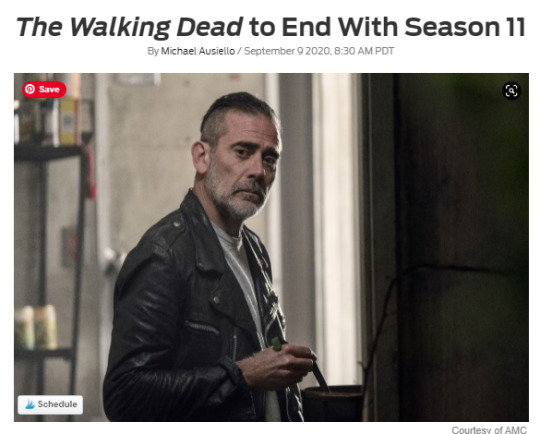
Okay, so let me make some broad statements here.
1) Gimple said he had until S15 planned, and I believe him.
2) I still think he has plenty of material so that they could have gone on through season 15.
3) I don’t think any of that content is being scrapped, curtailed, or cut short in any way.
So how can all of those things work together? Well, this is my biggest belief about this whole thing:
I don’t think they’re changing any of their original plan. I think they’re just shuffling and restructuring the way they’re going to give it to us.
A lot of things have changed over the past few years: technology, the fact that people stream-watch much more often than live-watch, CoVid, etc. So basically, I still think they’ll continue to tell the story through what would have been season 15, but they’ll be doing it through alternate series, spinoffs, movies, etc., rather than keeping it all to the main series.
Now, some of the skeptics out there are bound to think my beliefs about this are awfully convenient, and I’m just holding out hope that Beth will still return.
But I’m not JUST talking about Beth story lines. There are other things to consider here that we can prove. And I’ll get to them.
But the next question is:
Why Would They Continue the Story in Other Spinoffs, Rather Than Just Keeping to the Main Series?
I wasn’t sure about this at first, either. The only thing I could come up with on my own is that there are certain business/monetary/logistical concerns behind the scenes that make this a better model for AMC to make use of, rather than continuing the flagship series. And really, we’re never going to totally understand all of that because for legal/privacy reasons they’re never going to give us the details.
But then, the always-insightful @wdway said some things that really helped light bulbs go on in my head.
We were discussing this and she said something about how, since Daryl isn’t a character in the comic books, and Carol died very early on in the story (at the farm, I think?), with this spinoff that will focus on Daryl and Carol, they’re heading into territory that has absolutely no comic book source material.
And that really made sense to me. So, here’s my underlying belief about WHY they’re ending the flagship series after S11, even though they still have more story they’re planning to tell.

I Believe They’re Ending the Story after the Commonwealth Arc, Specifically Because the Comic Books Ended.
Because here’s the thing. Even with the extended S11, I still don’t think that will be enough time to cover the two major story lines they’ve been hinting at and slowly uncovering over recent seasons: the Commonwealth and the Helicopter People.
The only way to cover BOTH of those so quickly is to REALLY short change one or the other of them, and I think we have ample evidence and foreshadowing that that won’t be the case.
So, here’s the jist of it. Back when Gimple took over and planned his 15-season arc, they couldn’t have predicted a lot of what’s happened since. They couldn’t have predicted technology, COVID…or that Kirkman would suddenly, without any warning, decide to end the comics. So, even though they’ve always put their own spin on things, and have definitely done things that weren’t in the comics at all (i.e. Beth and Daryl), they’ve still always stuck to the major arcs from the comic books. (The Farm, The Prison, Alexandria, AOW, Whisper War, and now The Commonwealth.)
I think they decided to pivot and change formats as soon as Kirkman ended the CBs. They just haven’t announced it until now. So, I think season 11 will focus completely on the Commonwealth, but they’ll end it and switch to something entirely new to continue telling the story of the Helicopter Group. And even though they’re advertising it as focusing on Daryl and Carol, keep in mind that Rick and Michonne are also still out there. We’ll have them to look forward to in the Rick Grimes Films as well. And of course they still have FTWD, TWB, and these other spinoffs they’re talking about.
Do you see what I mean? I don’t think they’re changing or curtailing the story they’ve always planned on telling. They’re just changing formats. So the main series will end with the source material from RK’s comic books. The rest will be a new series that is 100% AMC’s own.
I hope that makes sense. This is why it doesn’t really worry me and I don’t think it negatively impacts Beth’s story or return at all.
Okay, let’s switch gears and talk about the spinoff.
When I read the press release, the first thought I had was, “Well, that’s vague.” The press release really doesn’t tell us much. It’s hard to draw many conclusions from it. And it doesn’t say other characters (like Ezekiel, for example) won’t be in it. Just that it will focus on Daryl and Carol.
And I get that, again, that may sound convenient, but that’s why I explained everything above first. Knowing that this is probably just switching formats to continue the same story, it doesn’t sound quite as convenient anymore, does it?
The second thing I thought when I heard this (and my fellow theorists said they had the exact same thought, which kind of validates it in my head) is that this whole Carol/Daryl thing is probably tied to the New Mexico symbolism.

If you remember, starting in 10x01, they started randomly referencing New Mexico a lot, in conjunction with the idea of the two of them taking off on Daryl’s bike and just leaving. I know that idea isn’t our fandom’s favorite, but it was obvious to me that this was a foreshadowing and that it will happen at some point. So I’m relatively sure that this spinoff about Daryl and Carol will be them going to New Mexico together.
Here are some posts where I talked about the NM symbolism: X, X, X,
The thing is, guys, I’ve also always believed that it will be a Beth thing. That it will mirror them taking off together to search for Beth in 5a. So either way, I think Beth will be involved in that spinoff series.
@wdway told me she’s believed for a while that S11 will be another “Daryl searches for Beth” season. TD has believed for a LONG time that there will need to be another search on Daryl’s part. That there may even be something of a replay of events in Coda, but that it will end differently. In a good way, rather than in the disaster that was Coda.
So, either Beth and Daryl will get a reunion sometime in S11, but then something will happen and she’ll be taken again. Probably by the helicopter people. And Daryl will need to go look for her.
Or.
Maybe they won’t get a reunion at all in S11. That would definitely suck more, but maybe, while the audience, and various characters in the show *coughs Eugene* know about Beth, maybe Daryl really doesn’t find out until the end of the season, and he’ll just be busy dealing with the Commonwealth situation. But then, at the end, he finds out she’s alive and jumps on his bike to go find her. And, as in 5x02, Carol goes with him.
I also think Ezekiel will probably figure heavily in this. I’ve harped on and on about his death fake out, right? I do think it will happen some time in S11. And I think it’s possible that the season (and series) will end with Carol still not knowing that he’s really alive. Or maybe she’ll find out he’s with Beth and that will be part of the reason she goes with Daryl too.
Now, obviously this is all conjecture with a liberal splash of head canon. But given the symbolism and foreshadowing we’ve identified, especially these past two seasons, and how often TD has been right about this sort of thing, I really think there is a VERY good possibility that this, or something close to it, is what’s really happening here.
So yeah. I think I’ll shut up, now. The short of it is, I think they’ll continue the story line after S11, just in different story vehicles. I think Beth will still return and be a big part of the story moving forward. And I think S11 (and the series) will end with a lot of unresolved story lines that will move to other parts of the franchise. Therefore, aside from being sad to say goodbye to the flagship series in principle, this really doesn’t worry me all that much.
At the very least, we know we’ll be getting more Daryl after the series officially ends. Which is a good thing.
Thoughts?
#beth greene#beth greene lives#beth is alive#beth is coming#td theory#td theories#team delusional#team defiance#beth is almost here#bethyl
19 notes
·
View notes
Text
A Review of the Fall Out Boy Biography Inevitably Colored by Shippiness Oops But Really Mainly By My Love for Pete Wentz
I don’t even know who the audience is for this monstrosity of a review, nor do I know the audience for this biography, though, so, like, it’s fitting lololol:
I am a new Fall Out Boy fan. I say that because, if anybody was in need of a Fall Out Boy biography, you would think it would be a new fan. AND YET. I’m not entirely sure who the market for this book is, because it isn’t really Fall Out Boy fans of any duration, because not only can everything in the book be easily located with the simplest of Google searches but also there’s so much he leaves out. And what he leaves out is just…so incredibly telling. It’s like, the facts he chooses to highlight are often pointless and random (although thanks for telling me that Pete Wentz’s jeans were so tight he had to perform without underwear, I’m going to think about that a lot now), whereas the facts he leaves out are the ones that lend both complexity and context. Like, this whole book could be Exhibit A in how malleable facts can be. Given the same set of facts, this man and I would tell two very different stories.
At least partly this is because he’s a music critic (I glean from the book) and I’m a creative writer. I believe he is a music critic because he takes care to dedicate a paragraph of musical analysis to every song on their earliest CDs (he loses interest in them over the hiatus, and more on that later). I appreciated this, because I know nothing about music, and I learned a lot about how talented Patrick Stump really is, like, not as a vocalist, because I knew that, or as a musician, because I also knew that, but as a smart, clever songwriter. I don’t know how to critique music, and I was happy this guy was full of praise for what Patrick does. He also pointed out musical hallmarks of theirs – like their tendency to drop the music suddenly for Patrick to sing an a cappella line – and that was the first time I’d ever really thought about them.
He was full of much less praise for Pete’s lyrics, though, and I think that’s because he’s a music person, not a word person. Not that he thought Pete’s lyrics were ever bad but he tended to stay very conventional about them: emo, confessional, dramatic, and ingeniously juxtaposed with Patrick’s clear-as-a-bell voice. He’s kind of obsessed with the contrast between Patrick’s voice and the lyrics he’s singing, whereas I’m much more obsessed with the contrast between Patrick himself in sweater-paws and glasses snarling, “I am your worst nightmare,” like, sweetheart, I doubt it. AND YET HE PULLS IT OFF. Like, that’s so interesting to me, how much Patrick can make himself embody Pete, that act of alchemy where he sings on his behalf, but this book talks less about that than I think it might, mostly because I don’t think this guy really wants to think too hard about how incredibly good Pete’s lyrics actually are. The thing about Pete’s lyrics – he does this, and it’s so clever, it’s killer clever – is you can read them so easily on one very obvious and expected layer, and then there’s always one or two additional meanings tucked underneath them, and you might never stop to think about them, especially if you’ve already written him off, but his lyrics reward careful study and a lot of thought, he specializes in triple entendres, a turn of phrase that spins out into so many meanings, that’s so hard to do and he makes it look so easy that it’s such a simple mistake to dismiss it, to not even see how dense his poetry is. The conventional story on Pete Wentz is he’s good at marketing – marketing the band, marketing himself – and so he spun in circles to keep the spotlight on him and away from Patrick, and that’s definitely one take, and another take would be to point out that the same whirligig sex-symbol tabloid-fodder act also had the side effect of undercutting any tendency to take Pete seriously from a literary point of view, like, so much easier to just say that, in keeping with his goth guyliner, he wept into his inkwell and scrawled messily over parchment. So anyway: criticism #1 of this book is that they should have complemented the music-critic-ness with an English major.
Criticism #2 is that I feel like people always get wrong what appeals to girls, to speak in the massive generalizations of this topic. Like, someone somewhere was like, “Hey, girls like this Fall Out Boy band, it must be because Pete Wentz is hot.” And they’re not wrong about that, exactly, but they always seem to miss how many entangled layers often come with attraction. Like, yeah, sometimes it’s just he’s got nice abs but often there’s a million other things happening there, and one thing I cannot forgive this guy for is not just his failure to engage with Pete’s lyrics on any real level, but how little he also truly examines Pete Wentz’s genuine marketing genius. He’s a music guy: His interest is clearly in Patrick, and also in Joe and Andy, because they’re musicians, and he can wax poetic about them. Pete gets his standard paragraphs: Oh, he chose the right management, the right record label, the right deal. He can pick out a good band, like Panic! or Gym Class Heroes. All of that is true, but none of it really grasps exactly how smart Pete really is. Like, the book hardly mentions at all how much Pete realized immediately the value of internet fandom. When I first fell for Pete Wentz – that first weekend I spent Googling him – what really was the death knell for me was stumbling upon the old FOB Q&As he used to run in the earliest days. And it wasn’t actually his constant leaning into the Peterick shipping with such dead-on unerring understanding of fandom that did it for me (although that was pretty charming, ngl). It was how often teenagers messaged Pete Wentz with their problems, and how patiently he took the time to respond. My boyfriend broke up with me. My grandma just died. I don’t feel like I fit in anywhere. Again and again and again, Pete Wentz took these messages and wrote out detailed, laborious responses. And I know he was a guy angling hard to be famous but not all guys angling hard to be famous realized how important something like this is, this very personal connection, like, above and beyond the bantering and the smirks, and even if you’re doing it entirely for ulterior motives, that’s a ton of emotional labor he was performing. I finished reading those Q&As and thought, God, Pete Wentz must have been exhausted.
And I’m not sure that’s something the bio ever really wrestled with, because it never really talked about that aspect of him. I don’t actually think the bio read anything Pete Wentz has ever posted online, like, not even those basic Q&As that are the easiest thing in the universe to Google, never mind the secret blogs he still has scattered all over the internet with nuggets of lyricism buried in there for Patrick to mine. It’s just so easy to buy into the Peter-Pan, devil-may-care Pete Wentz picture, and for all I know that’s the truest of the pictures, but it’s also undeniable fact that the other side to that was either really cunning and savvy or just a nice guy, and either way it’s another layer to Pete Wentz that gets short shrift in the bio. Which isn’t surprising because although the author clearly appreciates Fall Out Boy the band, the author clearly isn’t fannish at all, whereas it’s pretty abundantly clear Pete Wentz is fannish. He’s unapologetically fannish. He speaks fan language with a fluency that is hard to fake. And he’s astonishingly well-versed in tropes. He’s instinctively good at creating a good story, not just in his lyrics (although he, like Taylor Swift, is adept at tropey lyrics, so it’s no surprise they have a mutual admiration society), but in his life. In addition to the Q&As, that first weekend was full of me being like, …How is this the tropiest thing I’ve ever read??? It’s unsurprising that the bio doesn’t point out all the tropes in the Pete Wentz / Patrick Stump / Fall Out Boy story, because the author isn’t versed in tropes, but Pete Wentz definitely is. He knows how to use words, well. And you wouldn’t necessarily know it to listen to him – he babbles and uses tons of filler phrases and never, ever ask him what his lyrics are about, it’s like trying to have a conversation in Wonderland – but that’s all part of the aw-shucks-sometimes-I-scribble-some-stuff-down-Patrick’s-the-real-genius brand.
Now I am not qualified to write a Fall Out Boy biography and also I don’t know these people and also everything I do know comes from Google but that said, I feel like I do know for a fact some primary source materials that the writer just chose to leave out that really does display how malleable stories can be depending on what you highlight or not. Like, if he didn’t want to draw psychological conclusions based on the facts that’s fair enough. But he also pared back the narrative so drastically that it left off the true meat of it, like, if you read this book you would not necessarily think there was much interesting about these people, whereas if you really dig into everything they’ve got out there, well, you could start to think they’re super-interesting people. But I am a creative writer and this biographer was a music critic. He settles happily into the song analysis but I’m busy connecting dots into a narrative, and life is complicated, it is not a simple narrative, but that impulse underlies most biography, the idea that we can assemble the facts into something that has something to say about a human life. But that act really exists in how you assemble the facts.
~~~~~~~~TRIGGER WARNING: SUICIDE DISCUSSION~~~~~~~~~~~
A really good example of this is the way the biography deals with the Best Buy incident. Here are the bare facts: Pete Wentz, in a Best Buy parking lot listening to Jeff Buckley’s “Hallelujah,” took too many Ativan. In a phone call, his manager noticed he was slurring, called his parents, they rushed him to the hospital, he lived. These are the facts that the book gives you, and these are true facts.
If you want to expand slightly upon these bare facts, Pete has given many, many interviews about this incident because he is very open about mental health issues and his bipolar disorder and depressive episodes and anxiety. Pete has said that he’s not sure he was trying to kill himself so much as just make his head quiet for a little while. Pete has said he felt like he was too busy being Pete Wentz for everyone else and he just wanted to rest. These are also facts, although ones I don’t think the biographer truly believes. He does dutifully quote them but he also clearly has his own belief about how much Pete’s telling the truth. Because this is inevitable in any telling of the facts.
If you want to expand slightly upon these facts, you could point out that Pete’s lyrics reflect how noisy his head is (“when this city goes silent, the ringing in my ears gets violent”), which might color how you understand him when he says he just wanted some peace and quiet. You might also point out that, as the bio has already said, Pete was the driving force behind the band’s strategy and it was about to culminate. You might remind the reader that Pete walked away from other possibly very successful careers to do this band (there is much made in the book of the theoretical ease with which Pete could have achieved a soccer career, which made me raise my eyebrows a bit but, you know, Patrick does say Pete’s really, really good at soccer). You might recall that Pete has these kids relying on him whose parents he literally had to persuade to trust him. You might say that so far everything had gone exactly as he planned and he just needed to stick the landing. You might mention the fact that they kept rewriting songs and rewriting songs and rewriting songs; that Pete was in such utter meltdown mode that he was sliding lyrics under Patrick’s door and then retreating, so that the rest of the band never even saw him; that they had scrapped half the album and were furiously writing new music right up until the deadline – all of which are facts not even mentioned. You might say all of those things, because they are indeed all true facts.
~~~~~~~~~~~~~~~~~~~~~~~~~~~~~~~~~~~~~~~~~~~~~~~~~~~~~~~~~~~~~~~~
It is appropriate at this point to note that many of these things were simply not germane to the story this biographer was telling, which was a music-critic-focused story. But these things are all incredibly germane to the story *I* would tell, about these four people who found each other, lost each other, and found each other again, and the two people at the center whose creative alchemy was by turns either too dazzling or too explosive and in both incarnations needed to find a way to balance to keep the band afloat. This is the story I would tell, but, to be totally honest, Pete and Patrick’s creative partnership doesn’t really seem to interest the writer of this book. He mentions it vaguely, in passing, once or twice, fairly standard surface proclamations about Pete handling lyrics and Patrick handling music, and Pete drawing the spotlight away from Patrick who didn’t want it. Or he’ll say that the true secret to the band’s success is Patrick’s voice and Pete’s lyrics, like Patrick could be any pretty-enough voice, which I think just isn’t true, there’s so much more to the way they clicked together. I read this great New Yorker article once about how, through history, genius exists in pairs, that often two people need to find each other to push each other to be better than they would ever be apart.
It’s fine to not want to get into that too intensely, it’s just that that means that half the story of Folie goes away, if you’re not focused on how the band was creating. Like, there’s so much about the lead-up to Folie to talk about: Patrick’s control over the music to the exclusion of everyone else, Pete’s worsening prescription pill thing, and the way that their creative partnership seemed to disintegrate while simultaneously leaving no room for Joe or Andy in the band. The book mentions really none of this – nothing about the fact that at one point they had descended into physical altercations over chord progressions; nothing about the story the producer tells that Patrick would get so frustrated after phone calls with Pete that he’d throw things around the studio; nothing about the story that Patrick once told Pete, “I don’t care, I’m going to write a song and call it ‘I Don’t Care,’” such a telling little tale when later Patrick comes to hate the song “I Don’t Care” – so the hiatus feels like it descends out of nowhere, with a paragraph about the fans not liking the album. Which, again, is a true fact, but without the other true facts of the way the entire creative process was crumbling around them, around all of them, it sounds less compelling. The bio does get into Joe wanting to flex his creative muscles more but doesn’t connect it back to the Folie era of being shut-out. The hiatus becomes entirely about Patrick not liking being booed.
Even worse to me is the book devotes a lot of time to each of their music videos, which is awesome, because their videos are important and great, but it devotes exactly zero time to the video for “What a Catch, Donnie.” And I’m so bewildered by that, you can have a field day with the symbolism in that video, even if you want to just make a true factual statement about its plot: Patrick collects all of the detritus of Fall Out Boy and all of their friends come and party with him, while Pete goes down with a sinking ship all alone, to a medley of the words he’s leaving behind. Like. That is literally what happens in this video. And then the hiatus starts. To me this is one of the most ridiculously angsty things ever, that they would go out to their own triumphs echoing back at them and the literal death of captain!Pete Wentz. To the story I would tell, this is the most germane. It merits not a single mention in the bio (other than praising the song itself for being one of the strongest on the album, and talking about the Elvis Costello cameo).
Because he’s much more interested in them musically than as people or relationships, he seems to lose interest in them post-hiatus. He details each of their hiatus-era projects with his typical attention to the music criticism side. And then he spends, like, eight pages talking about the guy who wrote the article that triggered Patrick’s “We Liked You Better When You Were Fat” blog post. I’m not even exaggerating. It’s an entire chapter dedicated to the article and the guy who wrote it. Patrick’s response is described and quoted and even praised, but not in nearly as much as detail as the original article, and Pete’s reaction to Patrick’s blog post gets literally zero attention. Which is fascinating since, in some tellings of the story, that’s the entire reason the hiatus ended. Pete has said on multiple occasions that he read the blog post and was upset Patrick was so upset and called him up and asked him to try writing with him again. But if you’re not actually interested in that creative relationship as a relationship, then you don’t see a reason to explain the motivation behind trying again.
You also don’t really see a reason to tackle why they initially struggled to get back into it. Like, truly grappling with the Pete/Patrick relationship leads to more depth than the surface “Patrick doesn’t like the spotlight, so Pete takes it for him.” That’s too simplistic a formulation, as Pete himself has said. It also discounts Patrick’s obvious dedication to Pete, his complete willingness to step in and publicly defend him on many occasions, like, Patrick’s no shy, retiring wallflower when it comes to Pete, Patrick can let loose viciously on behalf of Pete. Their protectiveness is mutual, although the public narrative often glosses over that. (In one of those “why leave that out” details, the biographer notes that Hemingway was Pete and Ashlee’s ring bearer but not that Patrick was Pete’s best man, Idk.) At any rate, I point that out because the struggle they had to find their groove writing together after the hiatus mirrored their initial struggles, to find their way into trusting each other’s strengths, but the book is just kind of like, “The first session wasn’t successful but the next session was. They were out of practice.” They weren’t out of practice with songwriting, not really, especially not Patrick – they were out of practice with each other. And that wasn’t just a hiatus-era souvenir, that went back to Folie, but we didn’t get that part of Folie.
The biographer also, annoyingly in my view, loses all interest in them at this point. He devotes almost no time to the post-hiatus era, which is fascinating to me, since their ability to launch a comeback as successfully and relevantly as they did is striking, and to do it not by relying on nostalgia but by generating genuinely new hits with a genuinely new audience, and he’s not interested in that at all. Even worse than not being interested in this is the fact that he fails to close the Folie loop, like, he devotes lots of time to Patrick coming to hate Folie because of how much the fans hated it. Then he makes a little note, like, “Maybe someday Patrick will come to love Folie again,” or something, and the thing is, I know the book was written a few years ago now, but there was definitely stuff available about how much Folie had become a fan favorite in the hiatus years. Patrick gave an interview somewhere where he talked about the reunion show and how he read fan reviews of it and the fans were like, “They should have played more songs from Folie!” I always think at that point And then Patrick looked into the camera like he’s on The Office. But, at any rate, Patrick got to see Folie become beloved and that loop could have been closed better and he just leaves it dangling. (I’m almost like, Did he really write most of this book while they were on hiatus and then when they came back he was like, …Goddamn it?)
He doesn’t at all get into the shock of the immediate level of success of their comeback, like, that’s another thing that’s documented, that they were unsure anyone would care and they were so startled by the response that they had to actually add larger venues onto their tour because they’d thought no one would want to come to their shows. He could have talked about how people waited hours outside in the Chicago cold to get into the comeback show, how they started the show with “Thriller” and Patrick says the response was electric and it must have been amazing and he’s just not really interested in it, you can tell that he’s bored. He doesn’t talk about how Patrick hadn’t really thought about having to perform the new songs live because he didn’t think anyone would really care about the new album, so they had to really think about how they were going to make it work, and how he almost permanently damaged his voice having to sing “Alone Together” live and that’s what finally finally drove him to pursue actual voice lessons, like, he mentions none of this, he’s just like, “They wrote Save Rock & Roll, and then they wrote American Beauty / American Pyscho.” He’s just clearly, at that point, bored. Whereas in the story I would tell, that is the most satisfying part, the happy ending beyond their wildest dreams.
Okay, omg, this is SO LONG, but here are some other random thoughts:
· He never – not once – goes back to source Pete’s lyrics to their original blog entries, which can be very interesting. This is because he’s not interested in the lyrics really, but it’s very frustrating to me because, like, SOMEBODY TAKE THESE LYRICS SERIOUSLY, PLEASE, THEY’RE SO GOOD. It also means that he misses things like “Miss Missing You” and the way it echoes Pete’s poem with the line “I miss you missing me,” like, that’s just a fact ::shrug:: He also says “Hum Hallelujah” is about teenage romance, and that is the most straightforward, surface-level reading, like, “Oh, it says ‘teenage vow in a parking lot,’ that’s what it’s about.” This pains me only because “Hum Hallelujah” might be the most perfect lyrically constructed song Fall Out Boy has, every line is golden and stuffed with meaning and emotion, and he’s just like, “teenage romance,” so dismissively, and I wince, like, “I could write it better than you ever felt it” is a line that deserves more than that. Not to mention “I love you in the same way there’s a chapel in a hospital,” god, or “One day we’ll get nostalgic for disaster,” ugh, do not read this book for lyrical analysis. He also terms the best lyrical line on Cork Tree as “To the ‘love’ I left my conscience pressed / Between the pages of the Bible in the drawer” and, while there’s nothing wrong with that line, I don’t even think that’s the best line in XO (I mean, leaving off the follow-up of “What did it ever do for me? I say” undercuts those lines immediately, imo). (He does at least point out that “Keep quiet, nothing comes as easy as you / Can I lay in your bed all day?” is a devastatingly sexy couplet.)
· Can I just say, the entire debacle with Hey Chris gets precious little time in this book, which in a way is fine but in a way is like, just by Googling I got way more information on what went down and the weird, weird words that were being flung back and forth (at one point the term “heterolifemates” is used which makes zero sense at all in this context), but this book does spend a lot of time with Chris and Pete pre-Patrick (fascinating, right???) and there’s this weird part where Chris says he hated Pete before he met him and is like, “He should wear pants that fit,” which is just…such an interesting reason to hate Pete Wentz, like, Idk, Chris, coupled with your heterolifemates thing and weird thing about “whose name do you say every night???” which is also weirdly sexual phrasing and also being like “no one knows how to break a heart like he does,” like, everything about this entire situation has so much queer subtext but the book doesn’t touch any of that, ever, in any circumstance, with a ten-foot pole.
· EVERYONE, THE BORDERS WHERE JOE AND PATRICK MEET IS LOCATED IN EDEN PLAZA AND I AM SO UPSET I DIDN’T KNOW THAT WHEN I WROTE THE DEVIL FIC.
· I did not know that the producer wanted them to change the “We’re falling apart to halftime” line in Dance, Dance because he thought it was too incomprehensible and I’m just like, That’s the lyric where you thought you were going to lose people??
· From the bio, describing the Live in Phoenix performance: a strange moment where Wentz inexplicably gets changed onstage. A strange moment? Inexplicably? Okay, like, germane to my telling of the story is how much those dick pics affected Pete Wentz’s public persona, how much he knew exactly what he was there to sell and he sold it with gusto, and how much of a spiral that ultimately sent him on. Instead, this biographer finds it inexplicable that Pete Wentz would take his shirt off onstage, and his analysis of the music video for “This Ain’t a Scene” gives the dick pic storyline only an offhand reference, calling it “making light” of the scandal, instead of really digging into the obvious pain there, like, that’s not a joyful lark there. (Later, much later, years later, Brendon Urie will manage to actually make light of the dick pic saga, both in the Drunk History and also in the joke of the dick pic being the photo that comes up when Pete calls him, as seen in the promos for the tour they did together, and that feels much more genuine. But that bit in “Arms Race” is kind of heartbreaking.)
· Pete says of their failed attempt to get the Guinness record of the first band to perform on all seven continents that it was the worst feeling he’d ever felt in Fall Out Boy, and the biographer is like, “Really, Pete? Really?” and I kind of want to shake him because Pete Wentz is obviously a dramatic person and he feels disappointments keenly and he made that statement literally just as they were finding out they wouldn’t be able to do it, like, of course it’s just hyperbole! The biographer is weird through that whole section of the book because he never once mentions that, as a consolation to Pete, Patrick stayed up all night with him so they could get the record of most interviews by a duo in a twenty-four-hour period, like, that’s what I would have said about that story instead of trying to get way more out of Pete’s off-the-cuff self-pity (which is just so Pete Wentz, it’s like this writer hasn’t just spend a hundred pages writing about him…).
· Whenever I read about how many songs Patrick shows up with when it’s time to record an album, I always feel this little twinge of solidarity with him, like, sometimes that’s just how it is in your chosen creative medium, you’re just always endlessly writing.
· I had never thought before about the fact that Pete says all the time that he was too selfish pre-hiatus, all the time, a lot, that’s how he describes his problem – and the fact that there’s an entire song on Truant Wave called “Love, Selfish Love” with the line “God bless the sad and selfish” and I’m just going to…sit here and think about who in Patrick’s life could be described as sad and selfish.
· From the bio re: Soul Punk: It’s disarming to hear this garrulous boy-next-door sing so candidly about sex. Yeah, I don’t think you were paying attention to the way Patrick smirks at the camera in the music videos, buddy.
· Detail I knew but had never really thought about before: that Pete got Patrick to really click into songwriting with him again by giving him a puzzle. Patrick says that sometimes Pete gives him homework assignments, “I want a song that sounds like x, y, and z,” and Patrick will be like, “That’s impossible,” but also so intrigued that he ends up sitting and writing the thing. The fact that Pete knew, after a few mediocre songs neither of them liked, like, “You know how I snag him? This way,” is adorable. Also, the fact that it was Pete who adored the song to come out of it, “Where Did the Party Go?,” and that it was his excitement over the song that made Patrick think, Okay, maybe we can do this, like, it was Pete’s joy that drove Patrick’s optimism, they’re so creatively linked, these two.
· He does include the detail that Pete was worried he’d fallen behind during the hiatus because he didn’t spend much time playing music and so he committed himself to practicing and improving with metronome work, like, Pete Wentz ugh <3. In a very recent interview that I cannot blame the bio for not including, Pete said that Patrick helps him with the bass because he’s so musically talented and everything about that offhand statement just kills me.
· I did not know that one of the leaks of their reunion was on a blog that wrote “You can stop refreshing for a journal update,” and I’m in love with that, sorry.
· Ugh, can I just say, the fact that Patrick sang all of his vocals for Pax AM Days live with the band is just so unbelievable, he kills me.
· From the bio: “We were fireworks that went off too soon / And I miss you in the June gloom, too,” Stump sings here, and you can’t help but wonder if the words refer to his public but brief marriage. …I have indeed helped the wondering of that because I have never once thought that about this song lolololol
167 notes
·
View notes
Photo
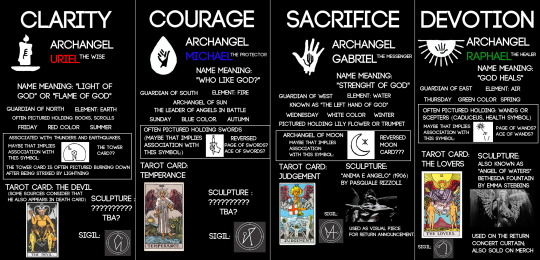
The Archangel Theory - A Possible Explanation to MCR's new symbolism
Hello! This is a very long post, but I hope it’s worth the reading. Sorry.
I am Nana, and today I bring you a fan-theory on the meaning behind MyChem's symbols presented to us in the occasion of the band's return announcement and later on, at the actual reunion concert day.
First Considerations:
1. being it, as the title implies, a fan-theory, I do not claim any of the exposed to be factual when associated to MCR. I bring this thread to you guys in hopes that we can discuss, expand, teach and learn with each other, and maybe come to some sort of conclusion. Riddles are fun to play, especially together. I love riddles in fandom experience. :)
2. I highly apologize for my limited vocabulary and weird phrasing. I am not a native english speaker, but I'll try my best to make this understandable to everyone;
3. Despite my personal beliefs and stupid jokes, I mean no disrespect to any religion or symbol mentioned in here. (just as much as I believe MyChem also doesn't, on the wild possibility of this thread being on point with what they planned, lol).
That being said, before we start, I have some thanks to give:
this theory was only put together thanks to my lovely mychem group chat, composed by Raffs, Clara, Caroline and Hana. thanks for all the time and effort we shared, and for holding my brain with your bare hands when it was about to melt, friends.
Also thanks to Frank Iero himself, for laughing at me on twitter for me not being able to understand the reunion clues, despite "wearing a California 2019 shirt for 6 years". I humbly accept the possibility of this theory having nothing to do with the truth, but I sure hope I can laugh back at you in the end, rat. I love you.
-----------------------------------------------------------------------------------
Now, let's finally head to The Archangel Theory, or, as I like to call it, The “If We're Not Careful We'll Turn Into Catholics” Theory, and how it all started.
It was Halloween. Everyone here was minding their own damn business (I was being a clown on twitter, Hana was putting on her badass revenge-themed makeup. You know, the usual). And we all know what happened: MCR raised gracefully from the dead, dropping brand new symbolism and a stunning angel image to our poor panicked hearts. A few days later, when Hana’s crying ruined makeup was long gone and everyone calmed the F down a little bit, people started to ask themselves: okay, cool, but what does it mean?
Like many of you, the first thought that crossed my mind was tarot. Because, well, how f-ing cool would it be, right? I draw tarot everyday. I just loved the idea. Mychem posting a latin countdown with some eerie photo was just… yea, I was very excited with this.
Many of us also associated the symbols with past albums and even with the members themselves. All of these theories are very valid to me, and I loved reading them. I agree with many points raised.
Well, everything was fine (as fine as it could be, because I am so damn curious). The Return concert happened at the faithful date of December 20, California. We all freaked out and enjoyed the noble services’ of days_fate and diet_shampoo’s streaming. All that jazz.
But then: well… another angel. I started to think to myself: is this a pattern? The show ends, we get very emotional, everything is okay (i hate this pun) with the world. Frank Iero makes a post-concert post on instagram, talking about how everything was pure Magick. With a K.
For those unfamiliar, this is an occultist term related to Aleister Crowley’s Thelema, to differentiate the religious concept from the “stage magic” that we are used to. A very carefully picked name that I highly doubt someone would drop around without knowing what it implies.... Don’t even start me with the K and C keys being so damn far away from each other on a keyboard.
At this point me and my groupchat were starting to be very done with Frank’s clownery (we indeed love him very much for that), and so we started to hurt our minds every single day since then. that’s the result:
THE ARCHANGEL THEORY
Let’s Return™ to the basics: angels and, probably, tarot.
Funny enough, there are actually angels in tarot cards. There are many types of decks, but for this we are using the most famous one, which most people believe holds ancient symbolism, The Rider-Waite Tarot.
There are many angels and archangels mentioned in the Bible (only a few by name, tho), but only four of them made it into being represented in tarot cards: Uriel, Michael, Gabriel and Raphael. Let’s get the gang together and meet the holy crew (please, forgive me for the puns).
Uriel:
whose name means “the light of god”, “the flame of god”. It’s the Wise Angel, often pictured as the one who holds books and scrolls and bears holy knowledge and understanding. or Clarity, if you will. They’re sort of the goth one™, associated with the Tartarus and being pictured as pitiless as any demon would; even holding the key to Hell during the end of times, Uriel is described as the angel who watches “over thunder and terror”. Uriel is sometimes even mistaken for a demon (apparently, the eastern catholicism accepts Uriel identity as an archangel, while the western catholicism gives more credit to its dark side, and does not encourage worshiping); this duality comes from the notion that very often, enlightenment may be the end result of dark times. Every archangel has many, I said MANY symbols attached to them, so other elements associated with this angel can be found on the image attached to this post.
About Uriel’s Tarot Card: if you were raised in a catholic family and slept through as much catechism as I did as a kid, maybe you’ll be surprised to know that Lucifer, Satan and Uriel are all different beings. Let it be a lesson: no matter how edgy of a teen you are, please accept knowledge from any possible source. Putting this thread together would’ve been so easier to me now if I did, haha... That being said, our angel Uriel is actually the Devil in the Devil Tarot card, which meaning touches on addiction, obsession, feeling imprisoned or restrained, but it being only an illusion of powerlessness. This card is an invitation to free yourself, fight distractions and temptation, and finally fulfill your destiny. Please, consider that tarot readings are very deep and variable; there’s extensive books only on tarot meaning, so I won’t explore much on each card. that’s just a very general notion.
Some sources also consider Uriel to be the responsible for the change represented in the Death card, despite not being directly pictured in such card. As stated before, Uriel is associated with the concept Death brings, being a turning point, and ending route.
The symbolism presented in the Devil card (as for the Rider-Waiter deck):
“At the foot of the Devil stand a man and a woman, both naked and chained to the podium on which the Devil sits. They appear to be held here against their will – but look closer, and you will notice that the chains around their necks are loose and could be easily removed. Each has small horns on their head, like the devil’s, a sign that they are becoming increasingly like him the longer they stay here. Both have tails, a further symbol of their animalistic tendencies and raw instincts, and the grapes and the fire on their respective tails signify pleasure and lust.”
Poor people. If only they knew better. A lil bit of Clarity, huh?
That’s it for MCR’s clarity symbol, conveniently shaped as a candle.
Michael:
whose name means “who is like god” (being it a rhetorical question, to mean that no one equals to God). It’s the Protector Angel. They’re the leader of angels in the battle against demons, Defender of God’s realm against Satan in the Book of Revelation. Michael is a warrior, and is often seem with the sword in hand, to allure to the idea of bravery. They’re described as the angel of strength, protection and Courage.
About Michael’s Tarot Card: Michael appears on the major arcana Temperance. In fact, even the name “Temperance” comes from the process of refining and strengthening materials in metallurgy. this one likes swords a lot, huh. That’s a card which meaning touches on patience and prudence. It means already having a clear vision and knowing what you want to achieve. Now It’s all about thinking before action, and accepting the balance of things, blending the opposites to achieve an ideal solution. Apparently a very suited card for a warrior of faith. Prepare yourself: in my research, I’ve found a source that associates this card with the color blue (the very same of the archangel) and the musical note G. Yes, the universe has a strange sense of humor.
The symbolism presented in the Temperance card: “The vessels in the angel’s hands represent the vessel that contains eternal life. The flowers are Irises symbolising the goddess Iris who links God to humanity. Iris travels from one end of the world to another, into the depth of the sea and the underworld. The angel’s feet, one on land and one in water, symbolise the unification of the external and internal, conscious and subconscious. It also represents testing the waters before jumping into the unknown. The red wings on the angel represent blood which symbolizes life. The sun conceals a crown which represents a connection to higher power. The triangle on the angel’s dress is an equilateral triangle and symbolise spirit, divinity, fire, life, prosperity, and harmony. It can also symbolise God and the holy trinity. The square outside the triangle represents protection and stability.”
The MCR symbol for Courage is a drop. is it a drop of blood? for an warrior angel and their endless battles on God’s behalf? Of water, the waters of unknown? The water of balance of life? I don’t know.
When Michael / was a young genderless being,/ their father…
Gabriel:
whose name means “strength of god”. It’s the Messenger Angel; Gabriel is often portrayed playing the trumpet, to make announcements of God’s will. (many angels play the trumpets on Revelations book,, but Gabriel seems to be the most intimately attached to this concept). In the hierarchy of angels, Gabriel seems to occupy a very high position, being knows as the “Left Hand of God” (our Michael aforementioned being the Right-hand angel).
Their famous appearances on the Bible includes appearing to Zechariah and the Virgin Mary, foretelling the births of John the Baptist and Jesus. Islam also has Gabriel appearing for many prophets, telling them the divine plans. In a way, all those messages are basically callings to a higher purpose, a proof of faith, a personal Sacrifice. This idea is reiterated by the symbolism of Gabriel’s tarot card.
Gabriel is also one of the Angels of Death (depending on the religious we are speaking about, there are over 14 different angels with this role). Not in a dark way, their role is to comfort and bring peace to the deceased, guiding them into the light. Gabriel is therefore an angel of mercy, redemption achieved through a proof of faith (often a self-sacrifice, of any nature), after a fair judgement. speaking of which…
About Gabriel’s tarot card: Gabriel appears on the major arcana Judgement, which meaning touches on taking responsibility for your actions, speaking the truth. It’s a beginning/ending type of card, but a different kind of change than the one represented on one of Uriel’s card, Death. While Death brings something unstoppable, more powerful than anyone’s options, Judgement usually portraits something you can actually choose to take part in. But it also your responsibility any consequences of not taking this step. A fair judgement, indeed.
The Symbolism presented in the Judgement card: “The angel with the Trumpet could be a reference to the angels and the seven trumpets in Revelation, bringing apocalypse and resurrection. The white banner with the red cross can be St. George Flag, and a reference to Saint George gives Judgement the symbolism of sacrifice done in the name of our faith. Both the flag and the trumpet are military symbols of authority. A man, a woman and a child are being called from the tomb of ego consciousness. The three people are reflected on the other side of the river, another symbol of the soul’s victory over death. The three people are also a symbol of the three pillars of the tree of life. The man and the woman has changed side from the familiar feminine on the left and masculine on the right. In Judgement it is the other way around. Perhaps it is to unify us and to tell us to look at a situation from a different perspective, from within. You are seeing the pillars from the Angel’s perspective. This symbolises to raise your thinking and ask for Divine Perspective. The mountains represent the structure that surrounds us all.”
Calling all units! Time for the ultimate vibe check.
I guess that’s it for our third MCR symbol, Sacrifice, shaped as hand. Is it a left hand, just like one of Gabriel’s titles? that would be interesting.
But not so fast.
Now we come to an interesting point. Gabriel is the first of our angels to have a sculpture used by My Chem. :) It’s actually endearing how, if this assumption is correct, they chose the messenger archangel to bring the good news: mcr is alive!
About Gabriel’s sculpture: our Return angel, as some of us already know by this point, is actually a piece called “Angelo e Alma”, by italian artist Pasquale Rizzoli. It is located on Cella Magnani, a memorial chapel of the Magnani family, inside Certosa di Bologna, which is a very antique monastery, later transformed on a monumental cemetery for many italian families. You can take a look here, it’s stunningly beautiful.
Finished in 1906, this piece was a commission by the widow of a war veteran called Natale Magnani, who apparently died young. As far as I understand written italian, since I speak portuguese (latin languages perks, yey!), it’s still difficult to me to do further research on this family. Being it an old, traditional italian family, there’s tons of Magnanis, but there’s little to no info on Natale or his wife’s lives on the internet, it seems. If you’re italian and have any info about this, please comment. It can actually be relevant to this thread.
This sculpture portraits an angel ascending to heavens, guiding a soul (represented as a woman in a long dress). There’s rose branches and lilies at the feet of both the angel and the soul, as they fly together. These flowers pay homage to Magnani’s family blazon, as stated by the Storia i Memoria di Bologna Project website, that also offers on their site a brief explanation on the meaning behind the many other plants on this piece. they all basically allure to death, sleep, and resurrection. you can check it out here.
The presented symbolism, being an angel appearing to a soul in their travel to the spiritual realm, and even the flowers used, lead me to conclude that this sculpture very likely pictures our Archangel Gabriel, in their judgement roles again.
Now, our holy rpg party already has a mage, a paladin and a bard. It’s time to introduce the most underappreciated (and my personal favorite) class:
Raphael:
whose name means “God heals”. Raphael is the angel for healing, thus making ‘whole’ everything that has been broken. They’re also a patron for lovers, role that he plays by using his healing powers in a non-literal way. Pay attention to the “fixing the broken and making it a whole again” part, that’s the connotation.
Both of these titles come from the roles Raphael played, depicted on the scriptures: the most famous ones being when Raphael was sent by the Lord to heal Tobit of his blindness and to deliver Sarah, his future daughter-in-law, from the demon Asmodeus, who killed every man she married on their wedding night before the marriage could be consummated.
Another famous role commonly related to Raphael is about the Pool of Bethesda. Despite not being mentioned by name, manuscripts of John 5:1–4 describe an angel that blessed this pool, healing the illness of those who touched its waters:
"an angel of the Lord descended at certain times into the pond; and the water was moved. And he that went down first into the pond after the motion of the water was made whole of whatsoever infirmity he lay under". It’s usually given credit to Raphael for this action, since they’re seem using healing power to fulfill God’s will in many occasions through the Bible.
About Raphael’s Tarot card: Raphael appears on the major arcana The Lovers, as the angel blessing the couple depicted. This is a card about romantic, even sexual, attraction, but not purely that. It’s about finding peace within yourself, and in someone else, about the journey to pick “the one” for you. Making a whole out of two halves is a common concept associated with this card.
Symbolism presented on The Lovers card: “the man and the woman in the image are being protected and blessed by an angel above. The couple seems secure and happy in their home, which appears to be the Garden of Eden. The fruit tree with the snake behind the woman is a reference to that story, which tells of humanity's fall into temptation and into the realm of flesh and sensuality. The angel depicted here is Raphael, the angel of air - who is of the same element of the zodiac sign that governs this card: Gemini. Air is associated with mental activity, and communication in particular, which is the foundation for healthy relationships. His blessing seems to give this card a sense of balance and harmony, the symbolization of union in a grand and cosmic sense between two opposing forces.”
Another source adds: “The couple stands in a beautiful, fertile landscape, reminiscent of the Garden of Eden. Behind the woman stands a tall apple tree, with a snake winding its way up the trunk. The serpent and apple tree represent the temptation of sensual pleasures that may take one’s focus away from the Divine. Behind the man is a tree of flames, which represent passion, the primary concern of the man. The twelve flames suggest the twelve zodiac signs, the symbol of time and eternity. The man looks to the woman, who watches the angel, showing the path of the conscious to the subconscious to the super-conscious, or from physical desire to emotional needs to spiritual concerns. The volcanic mountain in the background is rather phallic and represents the eruption of passion that happens when man and woman meet in full frontal nudity.”
Despite the latter being a bit too horny for my tastes, lol, both descriptions reiterate Raphael’s influence on the role of patronizing health and union, a journey of Devotion.
Oh, about the MCR symbol, shaped as a half-sun. at first I couldn’t find a correlation to Raphael and this sun shape, as for the first three angels it was very clear to me since just as I started reading about them. Then I realized the huge sun portrayed on The Lovers card, behind Raphael.
Despite holding its individual meanings, Tarot cards are not meant to me taken isolatedly. (that’s one of the reasons many people are not found of the single card yes-or-no type of drawing). That being said, it is not a surprised to find traces of one card on another, and many shared symbolism. As for the sun, it appears multiple times on the Rider-Waite deck, but only one card holds the same exact half shaped, upside down, centered sun as the MCR symbol. and that’s The Lovers. :)
Now, our romantic archangel lead us to a very lovely part:
About Raphael’s Sculpture: as we waited for MCR to dramatically drop the curtain at the reunion show, we were being watched over by a piece nicknamed “Angel of the Waters,” from the Bethesda Fountain (have you heard this name before?), located in the Bethesda Terrace, Central Park, in NYC. sculpted by Emma Stebbins in 1864, this piece’s history, together with Central Park’s history can be fully read in this awesome article that my friend Clara found: here.
But since we’re already here, let’s try to make a shorter version, focusing on what’s relevant to this thread.
Upon release, the angel, which stands and above and blesses a water fountain, was directly associated with the Bethesda Pool mentioned in the Bible, and the healing acts of Raphael. On the dedication pamphlet it was quoted the very same passage from the Gospel of John, chapter 5, verses 2-4 I’ve mentioned before. It’s a shame I couldn’t find any pictures of this pamphlet on the internet. Old documents, huh. NY people, if you have access to this, I’d love to see it.
If we stopped there, it would be enough evidence to assume the connection to Raphael, but there’s more! There’s some particularities about this statue.
Its conception was a huge deal: Emma was the first woman to receive a major sculptural commission in New York City. Also, she had a female lover, the world-famous American actress Charlotte Cushman, who, for Cedar Miller, historian that wrote about Central Park and Emma’s statue, holds a huge impact on the Angel of Waters actually making into existence. In 1869, Cushman was diagnosed with breast cancer. In addition to having two mastectomies, Cushman tried water cures in England. (Water cures were a big craze from the 1830s through the 1860s). The historian who wrote about them finds it another connection to the statue itself. Unfortunately, Cushman's treatments were ultimately unsuccessful, she passed away in 1875. Emma followed her not long after, in 1882. To this day, the statue remains, and to NY is a gathering place to find tranquility, peace of mind, even in the darkest times through the its 141 years of existence. It’s a place to heal yourself.
It’s not your average Raphael statue.
We have the archangel connection, a devoted couple's backstory, and lesbian/sapphics rights. I don’t know about you, but I can even picture Gerard Way carefully picking this himself, haha.
Oh, a spicy fact I’ve learned while writing this: This angel sculpture is actually even older in MCR’s history, tracing back to revenge era merch. (I didn’t have much access to mcr merch back in the day so I didn’t know about this, I apologize!)
I guess someone got nostalgic for some catholic aesthetics, huh. Bless!
Angels in tarot, bonus addition:
It is valid to mention that not only all of the 4 mentioned archangels have their individual cards, they also appear together in a single card, The Wheel of Fortune. In this card, each angel can be seen in a corner: Raphael (Aquarius) is upper left, Gabriel (Scorpio) is the eagle, Michael (Leo) is the lion, and Uriel (Taurus) is the bull, appearing in disguise, a common thing for angels though the scriptures, it seems.
If you draw tarot, you understand how big of a deal it is. If you’re not familiar, here’s the basic notion: “The wheel of fortune is a card about cyclical change. The wheel keeps on rolling, churning events in a ceaseless progression of ups and downs, either way freeing us from the past. No one can escape its cyclical action, which can feel somewhat terrifying -- no matter whether we are rising or falling. When one is balanced on top of the wheel, there is a moment of crystal clarity. However, the only part of the wheel that's actually not going up and down is the hub, which represents your eternal self. Every one of us will occupy all the points on the wheel at one point or another. The cycle of the wheel is its lesson -- and we can learn to take comfort in it. If you don't like the look of things right now, just wait -- things will change. Of course, if you do like the look of things right now, enjoy it while it lasts, because that will change too!”
It is quite a powerful card that holds all of the aforementioned symbolism. Woa.
More symbolism seem on this card includes:
“The Wheel of Fortune card shows a giant wheel, with three figures on the outer edges. Four Hebrew letters – YHVH (Yod Heh Vau Heh), the unpronounceable name of God – are inscribed on the wheel’s face. There are also the letters TORA, thought to be a version of the word Torah, meaning ‘law’, or TAROT, or even ROTA (Latin for ‘wheel’). The middle wheel has the alchemical symbols for mercury, sulphur, water and salt – the building blocks of life and the four elements – and represents formative power. On the outer circle is a snake, the Egyptian god Typhon (the god of evil), descending on the left side. The snake also represents the life force plunging into the material world. On the right side rises the Anubis, the Egyptian God of the dead who welcomes souls to the underworld. And on top of the wheel sits the Sphinx, representing knowledge and strength.”
THE SECOND SET OF SYMBOLS - STILL A MYSTERY
So, after all this, if any of this is correct at all, we just learned the meaning behind the first four MCR symbols, released on halloween: Clarity, Courage, Sacrifice and Devotion.
Now, what about the ones released at the reunion show, on the merch truck? Well, my friends, we still have a lot to think about.
I am a doctor, and in my profession there’s a saying which instruct us to always think of what seems like a complicated situation, with many possibilities, as a single disease causing many effects. That was my train of thought as I tried to associate these new symbols with the Archangels that we already have. It may have nothing to do with that at all, but it’s worth trying.
Differently from the first set, the second set didn’t get an official release, and does not hold text captions to guide us on it’s meaning. the symbol shapes, however, are easier to associate with tarot cards than the first ones, in my opinion. I’ve seen people online trying to guess it too.
Having the angels and their aforementioned traits as a guiding line, I used some symbolism associated to each one to connect them to a new symbol, as you can see on the picture attached to this post.
I have some major problems with this, tho, the biggest one being the order of the symbols not matching the first set sequence. We had Uriel (Clarity) / Michael (Courage) / Gabriel (Sacrifice) and Raphael (Devotion). The second set order was Sword / Moon / Tower / Wand, so the sequence goes like Michael / Gabriel / Uriel / Raphael. It doesn’t match. Please, help me.
THINGS THAT KEEP ME UP AT NIGHT: ABOUT WITCHCRAFT AND… SOLDIERS?
During the past weeks of my life I’ve been researching all types of things to break this down, so I came across some very unsettling things that may be just wild coincidences or... something else? Just in case, I am putting them here in case anyone finds some connection that I couldn’t.
Sigils and Pagan influences, maybe?
As some people on twitter and reddit noticed, Gerard was using a sigil on his arm that reads “My Chemical Romance”. Every Archangel mentioned here also holds its own sigil, which is shown on the picture attached to this post. While I was excited about the dates for new concerts, I started to think, is there anything special about these dates? I tried to not overthink it because we probably have major influences of disponibilities and,,, Label issues...I don’t know? some very practical stuff going on. But still, I came across an interesting match.
There’s 8 sabbaths, composing the Wheel of the Year, “an annual cycle of seasonal festivals, observed by many modern pagans, consisting of the year's chief solar events (solstices and equinoxes) and the midpoints between them.”
eight sabbaths, eight symbols, huh. Initially, I tried to connect each symbol to a sabbath, but it was very… not satisfying enough to me, so I’m leaving that out; nonetheless, I still believe they hold some meaning similarities.
And it doesn’t stop there.
That our lovely wheel of the year: here. We’re using a northern hemisphere version, since MCR is based in the USA.
The band returned on Halloween, which is the Samhain that occurs between Oct 31 / Nov 1. There’s some minor variation on dates because the Celtic day begins and ends at sunset.
Return Show took place in California, Dec 20: which marks the start of Yule. (Yule dates range from Dec 19 to Dec 22, for the Celtic calendar reasons)
The next sabbath is Imbolt, that takes place on Feb 1 / Feb 2. MCR has nothing announced for this date until now.
2020 concerts will happen during the week of March 20, 21, 25, 28 and 29, In Australia, New Zealand and Japan, as for now. That marks the start of the Ostara sabbath, which start range is March 20/21.
so… can we expect something (anything?) being announced at Feb 1 or 2, or near that? What about all the remaining sabbaths? Is that a reach? is it related at all? oof.
Who said Danger Days isn’t goth enough?
Another VERY interesting thing my group chat found on the internet during our MCR tarot obsession. If this theory is correct, this is not the first time they would be alluring to it. Please look at this pic of Grace Jeanette, The Girl in DD universe, posing with the mailbox on the set of the “Art Is The Weapon”/“Na Na Na” video shoot (2010). (Exact source and photographer unknown; likely taken by Jeanette’s mother). (big thanks to tumblr user killjoyhistory).
Bellow the big “OH HELL” we have four tarot cards, on the very same deck we used for this thread, the Rider-Waite deck. The cards are The Tower, The Devil, Death and Three of Wands.
Please note that it may have no correlation to future works, since DD itself had religious symbolism with the Phoenix Witch and this mailbox (go read the comics if you didn’t already. DD rights!), it may be a DD-only thing. Also, please note that 3 out 4 of theses cards were already mentioned in this thread, all possibly related to archangel Uriel.
To wage this war against your faith in me, MCRMY.
So. This one will sound weird and maybe a reach too, but, hey, mychem is alive and breathing, I guess there’s nothing really impossible, haha….?
Are we all familiar with Gerard liking a lot that green coat? After all those years, I guess so.
Indeed, our lovely frontman used yet another green jacket as his return outfit. This time, it was a military one. As a foreigner, and being very ignorant on how the US Army works, I got curious about the badge on his jacket. Maybe that’s common sense to you guys and I’m just embarrassing myself, but hey! be kind to someone who’s sort of dying inside after all this thinking process, would you?
The badge on Gerard’s jacket happens to be from the 1st Armored Division, a.k.a the Old Ironsides, named after an old ship (and the world's oldest commissioned naval vessel still afloat).
Actually, the nickname “Old Ironsides” trace back to England in 17th century, during their Civil War, but I didn’t find many relevant content / possible connections, besides them being mostly Protestant, in terms of religion… referring to them after all this catholic-conception angel talk is some sort of metaphorical war going on, MCR? Who knows. History-loving english folks, I’m counting on you too now to confirm this, lmao!
The American side of the “Old Ironsides” term, after being passed down from England during their Independence Wars (please be kind with me, my knowledge about american independence is almost 100% from Hamilton the musical lmao, help me) apparently resides, mostly on the US Army/Navy.
Interesting coincidences (?) about this: the Old Ironside ship, aka USS Constitution, has a familiar date on its history: November 1. I’m quoting its construction period info: “Her keel was laid down on 1 November 1794 at Edmund Hartt's shipyard in Boston, Massachusetts under the supervision of Captain Samuel Nicholson and master shipwright Colonel George Claghorn.”
I didn’t read much about it since I’m already at edge with everything I’ve been researching but, it seems it was a very adored ship. In fact, one of the reasons it’s still in active service it’s because a poet even made it a famous poem about this ship, that you can read here. It’s symbolic and adored, it seems.
About the homonymous 1st Armored Division of the US Army, which badge Gerard used during the return show: being the first armored division of the U.S. Army to see battle in World War II, it also holds a huge historical meaning.
Again, I don’t have much info to share about this and I think some of you will find possible connections on this better than I would.
But wtf does it have to do with all the angels, Nana?
Well, as mentioned before, angels fight battles in the name of God. They’re heaven’s military. Michael, especially, is a warrior angel and leads God’s troupes against the demons.
Something interesting I’ve found relating Gabriel (which statue, let’s not forget, was commissioned by a war widow) to the war concept was the hebrew poem "Elifelet" (אליפלט) written by Nathan Alterman in 1958, often turned into music and played on the israeli radio. it tells of a heroic, self-sacrificing (hm…) israeli soldier being killed in battle. Upon the protagonist's death, the angel Gabriel descends to Earth, in order to comfort the spirit of the fallen hero and take him up to Heaven. It’s very touching, and you can read it here.
I’m not saying any particular work like this poem is relevant to MCR’s possible new concept. (let’s not be political here, but also be honest: Israel wars are a delicate matter to bring up). We’re solely working with symbolism and history. Please keep that in mind.
MCR has touched on war thematics before in many occasions (I will not mention all of them, as I believe that as a fandom, we’re aware of that, and we can help new fans to understand it if needed. This text is already TOO LONG). Maybe it’s time for them to talk about some conflicts again, literal or metaphorical? Let’s wait and see.
Oh, one last thing. There’s actually a whole another navy air test and evaluation squadron, the Antarctic Development Squadron Six (VXE-6 or ANTARCTIC DEVRON SIX, commonly referred to by its nickname, The Puckered Penguins). They’re based on California (lmao) and their motto is… Well, “Courage, Sacrifice, Devotion”. Uriel kinda left behind again, huh. I’m sorry sweetie.
Again, I apologize if this last section (or even the whole thing..haha…) looks far-fetched, but I just… had to take it out of my chest, sorta? Sorry.
That concludes our Archangel Theory. Thank you if you took your time to read through it all.
List of things to maybe expect in the future:
Something on Feb 1 / Feb 2
Two more angel statues, being them related to Uriel and Michael in some sort of way. I’ve tried to find any suitable matches but… there’s just too many, and as we’ve seen it may even not be officially claimed which angel is portrayed. So let’s wait and see.
More pagan symbolism?
Something about War??
Cryptid posts related to UK and paganism, January 17th and January 24th.
## EDIT (01/12): about new mcr cryptid posts...
If you’re following MCR new updates, as for now you’re aware of the United Kingdom Stuff going on... Interesting coincidences (or is it?) about those:
Both posts were made on the same day the lunar cicle changes. This month, the moon shows up a different form every friday, so maybe prepare you heart for January 17th and 24th. Also, I believe they’re using London time for the updates. in fact, the most recent post (the video with theban alphabet) was posted only 30 minutes after midnight in London. So I’m adding that to our list of things to expect in the future.
Also, someone at warner might be in trouble right now. the ig account for Warner Music Artistic Services (@wmas) posted a variation of the video posted by MCR, only a day later, featuring another order for the theban caracters, a slightly different UK flag (it was somehow merged with a picture? it’s difficult to tell), and a new frame that consists of a forest, similar to the one Gerard posted on his own instagram, and the one featured as background for the skeleton holding a witchcraft-related dagger photo from 2 weeks ago. Differently from the previous mcr video, which was silent, this one featured a sound, if my ears are not mistaken, a very dramatic C# note played on piano or organ (church instruments, huh. funny. but it could be worse, at least is not a G note...)
The video was labeled as LFG, that could mean a million of things. the most relevant ones, I believe, could be “Looking For A Group”, a classic D&D/RPG term (If I close my eyes long enough I can hear distant circus music playing in my head, for I have compared the four archangels to a holy RPG party weeks ago...)or “London Forest Gate”, a neighbourhood in London. please tell me if you have any ideas about what else it could mean, haha....
This video was deleted, but you can still find it around on twitter.
Well, that’s it for now. I’ll keep updating this post as more content is released. Keep running!
174 notes
·
View notes
Photo


different versions of sans.
here’s a list of what they say about you if you want (not 100% accurate):
smol - you and me think the same pal. unless you draw “smol” as a low-effort way to portray him in some sort of reddit x 4chan-style joke where sans shits on the floor and calls papyrus a slur. but as long as you’re not like that then you’re probably good. your main source of undertale content can vary, though it likely could be from your own thoughts on the game. what kind of person you are varies a lot here and i couldnt tell ya anyway because i draw sans like this.
classic ol sans - you don’t want to go off-model by much. you care about source material and likely try not to put too many “stretchy” headcanons in any media you make. this basically means you take what the game gives you, even if it’s like, unused stuff or posts toby fox made on twitter. nothing too outlandish. you might make a lot of theories based on only what you see in the game, and fact-check other theories in your head, but still learn new things from them and apply them to your own understanding of the world. your main source of content probably comes from the game itself and others’ let’s plays. what kind of person you are varies a lot here and i couldnt tell ya anyway because i draw sans like this sometimes.
fanon v1 - you take creative liberties and change small things (color the eyes blue, add dots, fluffen up the hood and slippers). you like fluffy content and probably follow a few undertale au blogs. you like the edgy side of sans and tend to focus more on that maybe. chances are, you tie sans’s eye thing to his emotions for some reason. you color the hood white because that’s what everyone else does so at this point it’s weird seeing the hood with any other color. you’re cool and good probably. your source of content is very very very likely from other creators’ comics and art. probably also undertale vine compilations. you’re most likely an alright person.
fanon v2 - you focus on the “haha funny skeleton man” side of things rather than the “strongest enemy and doesnt think anything he does matters” side of things. you leave his shirt off to express his laziness, because that’s how you interpreted his sprite, or because you saw that one page of concept art and decided that was the canon look. you give sans sneakers and a blue hood because that’s what he has on the steam card. you see sans as a comedian who tells jokes so bad they’re good, drinks ketchup all day, and annoys his brother. your content might come from joke comics and what you see in the game. but it gets a little hard to see where content comes from at this point. you’re probably cool. you probably either relate to sans more than fanon v1 or are just, like, less emotional i guess. like, yknow what i mean probably.
uncle sans - i probably love you. chances are, you follow the guy who made the dunkle sans comic and were inspired by that type of sans. either that or you came to the conclusion the same way that guy did. i have no idea where your undertale content comes from, but you like to imagine sans as a guardian-type figure for the human. you probably think sans gives great hugs. you’re probably either a big ol softie or you want sans to be your dad.
realistic - you either received a commission, played undertale once or twice, saw the popularity of the character, or were attracted to the design and decided to make this guy look more realistic. what i’m saying is that it’s unlikely that you are a knowledgeable fan of undertale like some of these other people. not saying it’s impossible, just unlikely. if you show sans with both the white pupil AND the flashing eye, you either like it like that or haven’t done your research. assuming you are a fan of the game and have made other content for it in the past, i guess this is just.. how your art looks. which is cool and good, i love me some realistic cartoons. i dont know what kind of person you are, all i know is that you intimidate me. i’m scared of you. you have a power not many people possess.
sexy tall sans - (stick to the end if none of what i’m saying applies to you) fuck you. i hate you. burn in hell. you probably ship fontcest or you ship sans with the human. let the man be short and chubby. but DON’T put some sort of stupid magic blue slime as his fat. do not. no. none of that shit. and stop giving sans a tongue. he doesnt even fucking open his mouth, you can’t make out with him. he’s not a sexy guy. he’s the least sexy guy in the whole game. don’t like, actively change his design to be sexier. why dont you go after a character who’s already sexy, like heats flamesman? it’s as a very wise guy once said, “sans the skeleton is not real. you’ll never be his wife.” chances are, you’re a bad person. you may seem nice and friendly, but your morals... filthy... your main source of undertale content comes from porn. if you happen to be a good person with good morals and you still lust after sans like this, just.. keep it to yourself, and don’t hang out in the wrong crowd, okay?
47 notes
·
View notes